#I think sometimes a movie criticism becomes so popular we just accept it as fact and forget the actual context it was made in
Text
I'm rewatching Infinity War and I want to address one of the key criticisms I hear of it which is:
Steve: We don't trade lives, Vision.
Also Steve: *takes the fight to Wakanda where a lot of Wakandans die*
First point - even if they had destroyed the Stone when Vision first suggests it, the army would have no way of knowing that. They would have come for it anyway. Or even if they did know it was gone, Thanos surely would have sent them to Earth anyway for vengeance. Point is - Earth is getting attacked either way. Wakanda has the best defenses and weaponry in the world. Not to mention that Steve didn't just rock up and start fighting and force everyone else to get on board - T'Challa agreed to make the stand against Thanos there, even knowing the risks to his people.
Second - it's a thematically sound choice. Throughout the entire movie, we see that the good guys aren't willing to sacrifice love for the big picture. Loki won't let Thor die, Wanda and Team Cap won't let Vision sacrifice himself, Gamora can't bear to see Nebula tortured. The only person who is willing to make that personal sacrifice for 'the greater good' is Thanos. He thinks big picture only. The ends totally justify the means. What does one small life matter if he's saving the universe, even if that person is someone he 'loves'?
And then we get Stephen and Tony. Even after declaring that he will let Tony or Peter die before handing over the Time Stone, Stephen realizes the value of one life - Tony's life - because it's the one life that will make all the difference in the end. Yes, it's important to keep the end goals and the greater good in mind, but we can't do that by bringing untold harm and suffering to individuals. The Avengers win because they're not Thanos.
#did that even make sense or am I just rambling#I think sometimes a movie criticism becomes so popular we just accept it as fact and forget the actual context it was made in#also you know#so the movie can happen is sometimes a valid reason#avengers infinity war#mcu#marvel
98 notes
·
View notes
Text
The Green Knight and Medieval Metatextuality: An Essay
Right, so. Finally watched it last night, and I’ve been thinking about it literally ever since, except for the part where I was asleep. As I said to fellow medievalist and admirer of Dev Patel @oldshrewsburyian, it’s possibly the most fascinating piece of medieval-inspired media that I’ve seen in ages, and how refreshing to have something in this genre that actually rewards critical thought and deep analysis, rather than me just fulminating fruitlessly about how popular media thinks that slapping blood, filth, and misogyny onto some swords and castles is “historically accurate.” I read a review of TGK somewhere that described it as the anti-Game of Thrones, and I’m inclined to think that’s accurate. I didn’t agree with all of the film’s tonal, thematic, or interpretative choices, but I found them consistently stylish, compelling, and subversive in ways both small and large, and I’m gonna have to write about it or I’ll go crazy. So. Brace yourselves.
(Note: My PhD is in medieval history, not medieval literature, and I haven’t worked on SGGK specifically, but I am familiar with it, its general cultural context, and the historical influences, images, and debates that both the poem and the film referenced and drew upon, so that’s where this meta is coming from.)
First, obviously, while the film is not a straight-up text-to-screen version of the poem (though it is by and large relatively faithful), it is a multi-layered meta-text that comments on the original Sir Gawain and the Green Knight, the archetypes of chivalric literature as a whole, modern expectations for medieval films, the hero’s journey, the requirements of being an “honorable knight,” and the nature of death, fate, magic, and religion, just to name a few. Given that the Arthurian legendarium, otherwise known as the Matter of Britain, was written and rewritten over several centuries by countless authors, drawing on and changing and hybridizing interpretations that sometimes challenged or outright contradicted earlier versions, it makes sense for the film to chart its own path and make its own adaptational decisions as part of this multivalent, multivocal literary canon. Sir Gawain himself is a canonically and textually inconsistent figure; in the movie, the characters merrily pronounce his name in several different ways, most notably as Sean Harris/King Arthur’s somewhat inexplicable “Garr-win.” He might be a man without a consistent identity, but that’s pointed out within the film itself. What has he done to define himself, aside from being the king’s nephew? Is his quixotic quest for the Green Knight actually going to resolve the question of his identity and his honor – and if so, is it even going to matter, given that successful completion of the “game” seemingly equates with death?
Likewise, as the anti-Game of Thrones, the film is deliberately and sometimes maddeningly non-commercial. For an adaptation coming from a studio known primarily for horror, it almost completely eschews the cliché that gory bloodshed equals authentic medievalism; the only graphic scene is the Green Knight’s original beheading. The violence is only hinted at, subtextual, suspenseful; it is kept out of sight, around the corner, never entirely played out or resolved. In other words, if anyone came in thinking that they were going to watch Dev Patel luridly swashbuckle his way through some CGI monsters like bad Beowulf adaptations of yore, they were swiftly disappointed. In fact, he seems to spend most of his time being wet, sad, and failing to meet the moment at hand (with a few important exceptions).
The film unhurriedly evokes a medieval setting that is both surreal and defiantly non-historical. We travel (in roughly chronological order) from Anglo-Saxon huts to Romanesque halls to high-Gothic cathedrals to Tudor villages and half-timbered houses, culminating in the eerie neo-Renaissance splendor of the Lord and Lady’s hall, before returning to the ancient trees of the Green Chapel and its immortal occupant: everything that has come before has now returned to dust. We have been removed even from imagined time and place and into a moment where it ceases to function altogether. We move forward, backward, and sideways, as Gawain experiences past, present, and future in unison. He is dislocated from his own sense of himself, just as we, the viewers, are dislocated from our sense of what is the “true” reality or filmic narrative; what we think is real turns out not to be the case at all. If, of course, such a thing even exists at all.
This visual evocation of the entire medieval era also creates a setting that, unlike GOT, takes pride in rejecting absolutely all political context or Machiavellian maneuvering. The film acknowledges its own cultural ubiquity and the question of whether we really need yet another King Arthur adaptation: none of the characters aside from Gawain himself are credited by name. We all know it’s Arthur, but he’s listed only as “king.” We know the spooky druid-like old man with the white beard is Merlin, but it’s never required to spell it out. The film gestures at our pre-existing understanding; it relies on us to fill in the gaps, cuing us to collaboratively produce the story with it, positioning us as listeners as if we were gathered to hear the original poem. Just like fanfiction, it knows that it doesn’t need to waste time introducing every single character or filling in ultimately unnecessary background knowledge, when the audience can be relied upon to bring their own.
As for that, the film explicitly frames itself as a “filmed adaptation of the chivalric romance” in its opening credits, and continues to play with textual referents and cues throughout: telling us where we are, what’s happening, or what’s coming next, rather like the rubrics or headings within a medieval manuscript. As noted, its historical/architectural references span the entire medieval European world, as does its costume design. I was particularly struck by the fact that Arthur and Guinevere’s crowns resemble those from illuminated monastic manuscripts or Eastern Orthodox iconography: they are both crown and halo, they confer an air of both secular kingship and religious sanctity. The question in the film’s imagined epilogue thus becomes one familiar to Shakespeare’s Henry V: heavy is the head that wears the crown. Does Gawain want to earn his uncle’s crown, take over his place as king, bear the fate of Camelot, become a great ruler, a husband and father in ways that even Arthur never did, only to see it all brought to dust by his cowardice, his reliance on unscrupulous sorcery, and his unfulfilled promise to the Green Knight? Is it better to have that entire life and then lose it, or to make the right choice now, even if it means death?
Likewise, Arthur’s kingly mantle is Byzantine in inspiration, as is the icon of the Virgin Mary-as-Theotokos painted on Gawain’s shield (which we see broken apart during the attack by the scavengers). The film only glances at its religious themes rather than harping on them explicitly; we do have the cliché scene of the male churchmen praying for Gawain’s safety, opposite Gawain’s mother and her female attendants working witchcraft to protect him. (When oh when will I get my film that treats medieval magic and medieval religion as the complementary and co-existing epistemological systems that they were, rather than portraying them as diametrically binary and disparagingly gendered opposites?) But despite the interim setbacks borne from the failure of Christian icons, the overall resolution of the film could serve as the culmination of a medieval Christian morality tale: Gawain can buy himself a great future in the short term if he relies on the protection of the enchanted green belt to avoid the Green Knight’s killing stroke, but then he will have to watch it all crumble until he is sitting alone in his own hall, his children dead and his kingdom destroyed, as a headless corpse who only now has been brave enough to accept his proper fate. By removing the belt from his person in the film’s Inception-like final scene, he relinquishes the taint of black magic and regains his religious honor, even at the likely cost of death. That, the medieval Christian morality tale would agree, is the correct course of action.
Gawain’s encounter with St. Winifred likewise presents a more subtle vision of medieval Christianity. Winifred was an eighth-century Welsh saint known for being beheaded, after which (by the power of another saint) her head was miraculously restored to her body and she went on to live a long and holy life. It doesn’t quite work that way in TGK. (St Winifred’s Well is mentioned in the original SGGK, but as far as I recall, Gawain doesn’t meet the saint in person.) In the film, Gawain encounters Winifred’s lifelike apparition, who begs him to dive into the mere and retrieve her head (despite appearances, she warns him, it is not attached to her body). This fits into the pattern of medieval ghost stories, where the dead often return to entreat the living to help them finish their business; they must be heeded, but when they are encountered in places they shouldn’t be, they must be put back into their proper physical space and reminded of their real fate. Gawain doesn’t follow William of Newburgh’s practical recommendation to just fetch some brawny young men with shovels to beat the wandering corpse back into its grave. Instead, in one of his few moments of unqualified heroism, he dives into the dark water and retrieves Winifred’s skull from the bottom of the lake. Then when he returns to the house, he finds the rest of her skeleton lying in the bed where he was earlier sleeping, and carefully reunites the skull with its body, finally allowing it to rest in peace.
However, Gawain’s involvement with Winifred doesn’t end there. The fox that he sees on the bank after emerging with her skull, who then accompanies him for the rest of the film, is strongly implied to be her spirit, or at least a companion that she has sent for him. Gawain has handled a saint’s holy bones; her relics, which were well known to grant protection in the medieval world. He has done the saint a service, and in return, she extends her favor to him. At the end of the film, the fox finally speaks in a human voice, warning him not to proceed to the fateful final encounter with the Green Knight; it will mean his death. The symbolism of having a beheaded saint serve as Gawain’s guide and protector is obvious, since it is the fate that may or may not lie in store for him. As I said, the ending is Inception-like in that it steadfastly refuses to tell you if the hero is alive (or will live) or dead (or will die). In the original SGGK, of course, the Green Knight and the Lord turn out to be the same person, Gawain survives, it was all just a test of chivalric will and honor, and a trap put together by Morgan Le Fay in an attempt to frighten Guinevere. It’s essentially able to be laughed off: a game, an adventure, not real. TGK takes this paradigm and flips it (to speak…) on its head.
Gawain’s rescue of Winifred’s head also rewards him in more immediate terms: his/the Green Knight’s axe, stolen by the scavengers, is miraculously restored to him in her cottage, immediately and concretely demonstrating the virtue of his actions. This is one of the points where the film most stubbornly resists modern storytelling conventions: it simply refuses to add in any kind of “rational” or “empirical” explanation of how else it got there, aside from the grace and intercession of the saint. This is indeed how it works in medieval hagiography: things simply reappear, are returned, reattached, repaired, made whole again, and Gawain’s lost weapon is thus restored, symbolizing that he has passed the test and is worthy to continue with the quest. The film’s narrative is not modernizing its underlying medieval logic here, and it doesn’t particularly care if a modern audience finds it “convincing” or not. As noted, the film never makes any attempt to temporalize or localize itself; it exists in a determinedly surrealist and ahistorical landscape, where naked female giants who look suspiciously like Tilda Swinton roam across the wild with no necessary explanation. While this might be frustrating for some people, I actually found it a huge relief that a clearly fantastic and fictional literary adaptation was not acting like it was qualified to teach “real history” to its audience. Nobody would come out of TGK thinking that they had seen the “actual” medieval world, and since we have enough of a problem with that sort of thing thanks to GOT, I for one welcome the creation of a medieval imaginative space that embraces its eccentric and unrealistic elements, rather than trying to fit them into the Real Life box.
This plays into the fact that the film, like a reused medieval manuscript containing more than one text, is a palimpsest: for one, it audaciously rewrites the entire Arthurian canon in the wordless vision of Gawain’s life after escaping the Green Knight (I could write another meta on that dream-epilogue alone). It moves fluidly through time and creates alternate universes in at least two major points: one, the scene where Gawain is tied up and abandoned by the scavengers and that long circling shot reveals his skeletal corpse rotting on the sward, only to return to our original universe as Gawain decides that he doesn’t want that fate, and two, Gawain as King. In this alternate ending, Arthur doesn’t die in battle with Mordred, but peaceably in bed, having anointed his worthy nephew as his heir. Gawain becomes king, has children, gets married, governs Camelot, becomes a ruler surpassing even Arthur, but then watches his son get killed in battle, his subjects turn on him, and his family vanish into the dust of his broken hall before he himself, in despair, pulls the enchanted scarf out of his clothing and succumbs to his fate.
In this version, Gawain takes on the responsibility for the fall of Camelot, not Arthur. This is the hero’s burden, but he’s obtained it dishonorably, by cheating. It is a vivid but mimetic future which Gawain (to all appearances) ultimately rejects, returning the film to the realm of traditional Arthurian canon – but not quite. After all, if Gawain does get beheaded after that final fade to black, it would represent a significant alteration from the poem and the character’s usual arc. Are we back in traditional canon or aren’t we? Did Gawain reject that future or didn’t he? Do all these alterities still exist within the visual medium of the meta-text, and have any of them been definitely foreclosed?
Furthermore, the film interrogates itself and its own tropes in explicit and overt ways. In Gawain’s conversation with the Lord, the Lord poses the question that many members of the audience might have: is Gawain going to carry out this potentially pointless and suicidal quest and then be an honorable hero, just like that? What is he actually getting by staggering through assorted Irish bogs and seeming to reject, rather than embrace, the paradigms of a proper quest and that of an honorable knight? He lies about being a knight to the scavengers, clearly out of fear, and ends up cravenly bound and robbed rather than fighting back. He denies knowing anything about love to the Lady (played by Alicia Vikander, who also plays his lover at the start of the film with a decidedly ropey Yorkshire accent, sorry to say). He seems to shrink from the responsibility thrust on him, rather than rise to meet it (his only honorable act, retrieving Winifred’s head, is discussed above) and yet here he still is, plugging away. Why is he doing this? What does he really stand to gain, other than accepting a choice and its consequences (somewhat?) The film raises these questions, but it has no plans to answer them. It’s going to leave you to think about them for yourself, and it isn’t going to spoon-feed you any ultimate moral or neat resolution. In this interchange, it’s easy to see both the echoes of a formal dialogue between two speakers (a favored medieval didactic tactic) and the broader purpose of chivalric literature: to interrogate what it actually means to be a knight, how personal honor is generated, acquired, and increased, and whether engaging in these pointless and bloody “war games” is actually any kind of real path to lasting glory.
The film’s treatment of race, gender, and queerness obviously also merits comment. By casting Dev Patel, an Indian-born actor, as an Arthurian hero, the film is… actually being quite accurate to the original legends, doubtless much to the disappointment of assorted internet racists. The thirteenth-century Arthurian romance Parzival (Percival) by the German poet Wolfram von Eschenbach notably features the character of Percival’s mixed-race half-brother, Feirefiz, son of their father by his first marriage to a Muslim princess. Feirefiz is just as heroic as Percival (Gawaine, for the record, also plays a major role in the story) and assists in the quest for the Holy Grail, though it takes his conversion to Christianity for him to properly behold it.
By introducing Patel (and Sarita Chowdhury as Morgause) to the visual representation of Arthuriana, the film quietly does away with the “white Middle Ages” cliché that I have complained about ad nauseam; we see background Asian and black members of Camelot, who just exist there without having to conjure up some complicated rationale to explain their presence. The Lady also uses a camera obscura to make Gawain’s portrait. Contrary to those who might howl about anachronism, this technique was known in China as early as the fourth century BCE and the tenth/eleventh century Islamic scholar Ibn al-Haytham was probably the best-known medieval authority to write on it extensively; Latin translations of his work inspired European scientists from Roger Bacon to Leonardo da Vinci. Aside from the symbolism of an upside-down Gawain (and when he sees the portrait again during the ‘fall of Camelot’, it is right-side-up, representing that Gawain himself is in an upside-down world), this presents a subtle challenge to the prevailing Eurocentric imagination of the medieval world, and draws on other global influences.
As for gender, we have briefly touched on it above; in the original SGGK, Gawain’s entire journey is revealed to be just a cruel trick of Morgan Le Fay, simply trying to destabilize Arthur’s court and upset his queen. (Morgan is the old blindfolded woman who appears in the Lord and Lady’s castle and briefly approaches Gawain, but her identity is never explicitly spelled out.) This is, obviously, an implicitly misogynistic setup: an evil woman plays a trick on honorable men for the purpose of upsetting another woman, the honorable men overcome it, the hero survives, and everyone presumably lives happily ever after (at least until Mordred arrives).
Instead, by plunging the outcome into doubt and the hero into a much darker and more fallible moral universe, TGK shifts the blame for Gawain’s adventure and ultimate fate from Morgan to Gawain himself. Likewise, Guinevere is not the passive recipient of an evil deception but in a way, the catalyst for the whole thing. She breaks the seal on the Green Knight’s message with a weighty snap; she becomes the oracle who reads it out, she is alarming rather than alarmed, she disrupts the complacency of the court and silently shows up all the other knights who refuse to step forward and answer the Green Knight’s challenge. Gawain is not given the ontological reassurance that it’s just a practical joke and he’s going to be fine (and thanks to the unresolved ending, neither are we). The film instead takes the concept at face value in order to push the envelope and ask the simple question: if a man was going to be actually-for-real beheaded in a year, why would he set out on a suicidal quest? Would you, in Gawain’s place, make the same decision to cast aside the enchanted belt and accept your fate? Has he made his name, will he be remembered well? What is his legacy?
Indeed, if there is any hint of feminine connivance and manipulation, it arrives in the form of the implication that Gawain’s mother has deliberately summoned the Green Knight to test her son, prove his worth, and position him as his childless uncle’s heir; she gives him the protective belt to make sure he won’t actually die, and her intention all along was for the future shown in the epilogue to truly play out (minus the collapse of Camelot). Only Gawain loses the belt thanks to his cowardice in the encounter with the scavengers, regains it in a somewhat underhanded and morally questionable way when the Lady is attempting to seduce him, and by ultimately rejecting it altogether and submitting to his uncertain fate, totally mucks up his mother’s painstaking dynastic plans for his future. In this reading, Gawain could be king, and his mother’s efforts are meant to achieve that goal, rather than thwart it. He is thus required to shoulder his own responsibility for this outcome, rather than conveniently pawning it off on an “evil woman,” and by extension, the film asks the question: What would the world be like if men, especially those who make war on others as a way of life, were actually forced to face the consequences of their reckless and violent actions? Is it actually a “game” in any sense of the word, especially when chivalric literature is constantly preoccupied with the question of how much glorious violence is too much glorious violence? If you structure social prestige for the king and the noble male elite entirely around winning battles and existing in a state of perpetual war, when does that begin to backfire and devour the knightly class – and the rest of society – instead?
This leads into the central theme of Gawain’s relationships with the Lord and Lady, and how they’re treated in the film. The poem has been repeatedly studied in terms of its latent (and sometimes… less than latent) queer subtext: when the Lord asks Gawain to pay back to him whatever he should receive from his wife, does he already know what this involves; i.e. a physical and romantic encounter? When the Lady gives kisses to Gawain, which he is then obliged to return to the Lord as a condition of the agreement, is this all part of a dastardly plot to seduce him into a kinky green-themed threesome with a probably-not-human married couple looking to spice up their sex life? Why do we read the Lady’s kisses to Gawain as romantic but Gawain’s kisses to the Lord as filial, fraternal, or the standard “kiss of peace” exchanged between a liege lord and his vassal? Is Gawain simply being a dutiful guest by honoring the bargain with his host, actually just kissing the Lady again via the proxy of her husband, or somewhat more into this whole thing with the Lord than he (or the poet) would like to admit? Is the homosocial turning homoerotic, and how is Gawain going to navigate this tension and temptation?
If the question is never resolved: well, welcome to one of the central medieval anxieties about chivalry, knighthood, and male bonds! As I have written about before, medieval society needed to simultaneously exalt this as the most honored and noble form of love, and make sure it didn’t accidentally turn sexual (once again: how much male love is too much male love?). Does the poem raise the possibility of serious disruption to the dominant heteronormative paradigm, only to solve the problem by interpreting the Gawain/Lady male/female kisses as romantic and sexual and the Gawain/Lord male/male kisses as chaste and formal? In other words, acknowledging the underlying anxiety of possible homoeroticism but ultimately reasserting the heterosexual norm? The answer: Probably?!?! Maybe?!?! Hell if we know??! To say the least, this has been argued over to no end, and if you locked a lot of medieval history/literature scholars into a room and told them that they couldn’t come out until they decided on one clear answer, they would be in there for a very long time. The poem seemingly invokes the possibility of a queer reading only to reject it – but once again, as in the question of which canon we end up in at the film’s end, does it?
In some lights, the film’s treatment of this potential queer reading comes off like a cop-out: there is only one kiss between Gawain and the Lord, and it is something that the Lord has to initiate after Gawain has already fled the hall. Gawain himself appears to reject it; he tells the Lord to let go of him and runs off into the wilderness, rather than deal with or accept whatever has been suggested to him. However, this fits with film!Gawain’s pattern of rejecting that which fundamentally makes him who he is; like Peter in the Bible, he has now denied the truth three times. With the scavengers he denies being a knight; with the Lady he denies knowing about courtly love; with the Lord he denies the central bond of brotherhood with his fellows, whether homosocial or homoerotic in nature. I would go so far as to argue that if Gawain does die at the end of the film, it is this rejected kiss which truly seals his fate. In the poem, the Lord and the Green Knight are revealed to be the same person; in the film, it’s not clear if that’s the case, or they are separate characters, even if thematically interrelated. If we assume, however, that the Lord is in fact still the human form of the Green Knight, then Gawain has rejected both his kiss of peace (the standard gesture of protection offered from lord to vassal) and any deeper emotional bond that it can be read to signify. The Green Knight could decide to spare Gawain in recognition of the courage he has shown in relinquishing the enchanted belt – or he could just as easily decide to kill him, which he is legally free to do since Gawain has symbolically rejected the offer of brotherhood, vassalage, or knight-bonding by his unwise denial of the Lord’s freely given kiss. Once again, the film raises the overall thematic and moral question and then doesn’t give one straight (ahem) answer. As with the medieval anxieties and chivalric texts that it is based on, it invokes the specter of queerness and then doesn’t neatly resolve it. As a modern audience, we find this unsatisfying, but once again, the film is refusing to conform to our expectations.
As has been said before, there is so much kissing between men in medieval contexts, both ceremonial and otherwise, that we’re left to wonder: “is it gay or is it feudalism?” Is there an overtly erotic element in Gawain and the Green Knight’s mutual “beheading” of each other (especially since in the original version, this frees the Lord from his curse, functioning like a true love’s kiss in a fairytale). While it is certainly possible to argue that the film has “straightwashed” its subject material by removing the entire sequence of kisses between Gawain and the Lord and the unresolved motives for their existence, it is a fairly accurate, if condensed, representation of the anxieties around medieval knightly bonds and whether, as Carolyn Dinshaw put it, a (male/male) “kiss is just a kiss.” After all, the kiss between Gawain and the Lady is uncomplicatedly read as sexual/romantic, and that context doesn’t go away when Gawain is kissing the Lord instead. Just as with its multiple futurities, the film leaves the question open-ended. Is it that third and final denial that seals Gawain’s fate, and if so, is it asking us to reflect on why, specifically, he does so?
The film could play with both this question and its overall tone quite a bit more: it sometimes comes off as a grim, wooden, over-directed Shakespearean tragedy, rather than incorporating the lively and irreverent tone that the poem often takes. It’s almost totally devoid of humor, which is unfortunate, and the Grim Middle Ages aesthetic is in definite evidence. Nonetheless, because of the comprehensive de-historicizing and the obvious lack of effort to claim the film as any sort of authentic representation of the medieval past, it works. We are not meant to understand this as a historical document, and so we have to treat it on its terms, by its own logic, and by its own frames of reference. In some ways, its consistent opacity and its refusal to abide by modern rules and common narrative conventions is deliberately meant to challenge us: as before, when we recognize Arthur, Merlin, the Round Table, and the other stock characters because we know them already and not because the film tells us so, we have to fill in the gaps ourselves. We are watching the film not because it tells us a simple adventure story – there is, as noted, shockingly little action overall – but because we have to piece together the metatext independently and ponder the philosophical questions that it leaves us with. What conclusion do we reach? What canon do we settle in? What future or resolution is ultimately made real? That, the film says, it can’t decide for us. As ever, it is up to future generations to carry on the story, and decide how, if at all, it is going to survive.
(And to close, I desperately want them to make my much-coveted Bisclavret adaptation now in more or less the same style, albeit with some tweaks. Please.)
Further Reading
Ailes, Marianne J. ‘The Medieval Male Couple and the Language of Homosociality’, in Masculinity in Medieval Europe, ed. by Dawn M. Hadley (Harlow: Longman, 1999), pp. 214–37.
Ashton, Gail. ‘The Perverse Dynamics of Sir Gawain and the Green Knight’, Arthuriana 15 (2005), 51–74.
Boyd, David L. ‘Sodomy, Misogyny, and Displacement: Occluding Queer Desire in Sir Gawain and the Green Knight’, Arthuriana 8 (1998), 77–113.
Busse, Peter. ‘The Poet as Spouse of his Patron: Homoerotic Love in Medieval Welsh and Irish Poetry?’, Studi Celtici 2 (2003), 175–92.
Dinshaw, Carolyn. ‘A Kiss Is Just a Kiss: Heterosexuality and Its Consolations in Sir Gawain and the Green Knight’, Diacritics 24 (1994), 205–226.
Kocher, Suzanne. ‘Gay Knights in Medieval French Fiction: Constructs of Queerness and Non-Transgression’, Mediaevalia 29 (2008), 51–66.
Karras, Ruth Mazo. ‘Knighthood, Compulsory Heterosexuality, and Sodomy’ in The Boswell Thesis: Essays on Christianity, Social Tolerance, and Homosexuality, ed. Matthew Kuefler (Chicago: University of Chicago Press, 2006), pp. 273–86.
Kuefler, Matthew. ‘Male Friendship and the Suspicion of Sodomy in Twelfth-Century France’, in The Boswell Thesis: Essays on Christianity, Social Tolerance, and Homosexuality, ed. Matthew Kuefler (Chicago: University of Chicago Press, 2006), pp. 179–214.
McVitty, E. Amanda, ‘False Knights and True Men: Contesting Chivalric Masculinity in English Treason Trials, 1388–1415,’ Journal of Medieval History 40 (2014), 458–77.
Mieszkowski, Gretchen. ‘The Prose Lancelot's Galehot, Malory's Lavain, and the Queering of Late Medieval Literature’, Arthuriana 5 (1995), 21–51.
Moss, Rachel E. ‘ “And much more I am soryat for my good knyghts’ ”: Fainting, Homosociality, and Elite Male Culture in Middle English Romance’, Historical Reflections / Réflexions historiques 42 (2016), 101–13.
Zeikowitz, Richard E. ‘Befriending the Medieval Queer: A Pedagogy for Literature Classes’, College English 65 (2002), 67–80.
#the green knight#the green knight meta#sir gawain and the green knight#medieval literature#medieval history#this meta is goddamn 5.2k words#and has its own reading list#i uh#said i had a lot of thoughts?
2K notes
·
View notes
Text
Teen girls aren’t allowed to enjoy anything
and here’s my long ass essay about it :)
In youth pop culture, as well as pop culture in general, it’s generally a given that music movies, books, clothing, and other things that gain popularity will eventually fall out of style. On face level, this isn’t always a bad thing, but rather more of a function of society: when something is new, many people are interested, and as time passes, that number dwindles. Backlash and criticism is also a normal function of society, which can be very beneficial when done in good faith and with constructive purpose.
However, it’s quite notable that an overwhelming amount of criticism falls on things that generally have a large fan-following of teenage girls. This can cause them to feel embarrassed by wat they’re interested, or feel that being made fun of is inevitable.
In reality, though, things gain traction for a reason, and things widely loved by teenage girls aren’t often given the same analysis and consideration other things in pop culture are given.
While there is certainly media that isn’t beneficial and could negatively affect young girls, the things they like often go ridiculed by society due to a lack of consideration and deep analysis, as well as the constant sexist want of society to bring down young girls.
Older people in general have been known to blow off things popular in youth culture, which can sometimes be attributed to just not knowing or caring about it. On the more intense side, some are infuriated by it—and not always without reason. But when it comes to things that are popularized by teen girls, a deep and proper analysis is often not given. Instead, they focus on the surface-level negatives.
The Hunger Games is a clear example of this. The series, which revolves around a teen girl forced into a game where she has to murder other kids, is widely condemned as being far too violent and a potential threat to the innocence of young girls.
On the first look, it’s clear that this widespread opinion doesn’t stem from nothing; the series is violent, and mainly young girls read it. However, if one goes even a bit beyond the surface level of the series instead of being initially outraged, it actually shows a complex society and story of revolution with themes of corrupt media and propaganda, separation of class by wealth, and way both sides of a political argument or war can be corrupt.
Take the 12 Districts in the series: the Capital is at the top with the most wealth and ability to abuse, and lowest number Districts are under the illusion that they’re the same. Author Suzanne Collins develops this complex idea in her story by showing that while people in the Districts have different levels of wealth and resources, in the end, they’re all still forced to put their children to death.
In the grand scheme of things, they’re all just as powerless against those at the top. It reflects the nuances of Capitalistic societies and class divisions in a thoughtful way. This can actually really benefit girls, especially since the protagonist is someone they can see themselves as.
A much more widespread example of the ridicule young girls endure for the things they like is fashion. Overall, fashion for girls has progressed in a way that over time has become more diverse and accepting. It’s not uncommon to see girls in long jeans and sweaters, but it it’s also not uncommon to see them in more revealing clothes like crop-tops.
The way girls dress is taken issue with by many adults and even school systems, shown by dress codes that often ban shirts—even if they only reveal a girl’s shoulders. These girls are often told they’re being too provocative or dressing for boys, which strips them of their individuality and is certainly not the case. Many girls dress this way because they want to.
Furthermore, the diverse and growing willingness to be experimental with what they wear shows something wildly different than the harmful predetermination: reclamation of their bodies. Throughout history, girls have been shamed this same way—often more intensely. So, by defying these criticisms, teen girls are showing they feel more free and more confident in what they look like and are perceived as, which is something everyone should want for them.
When things like this are torn down by others, it can affect the girls immense negative ways and cause them to lose confidence. When the benefits are ignored by society, this is often what happens. The positives of more experimental and unique media and styles that interest young girls are at best ignored and at worst ridiculed when not given proper analysis and understanding.
While some criticisms of youth girl pop culture can be attributed to ignorance and lack of poper analysis, it would be even more ignorant to ignore the root of these issues: sexism.
When comparing the things young boys take interest in with what girls of the same age do, one clearly causes more outrage than the other. This can be seen by the blind outrage thrown at things like youth romance novels.
When the young adult romance book Twilight came out, real criticisms of the story were often drowned out by people making fun of its fans, which was majorly young girls. They were ridiculed by people often much older for liking something perceived as stupid. This can discourage girls from allowing themselves to enjoy such things, which is harmful because books like these often give girls hope and bring just pure happiness to them, which is immensely important as they grow up.
Furthermore, young girls are often criticized for liking the same things boys do to a much further extent. Video games, which are often violent, are traditionally played by boys. While these games draw a lot of criticism for aspects of violence and shooting, it has nothing to do with the fact that the audience is boys.
Girls, however, are often personally disparaged from playing such games because they’re too “masculine” and just not made for them. This discourages young girls from finding out what they enjoy and forces them to limit what they take part in.
In the end, even with the hate they often undergo, young girls haven’t stopped boldly and unapologetically enjoying what they love, but it is through their perseverance that they’re able to do so.
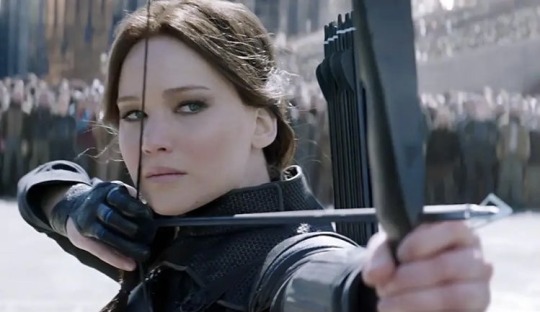
Final note: If we’re being honest, we all have a bit of internalized sexism and judge without thinking about potential effects on others. Sexism won’t cease to exist easily, but if we only take the time to consider our motives—even subconscious ones—we can help stifle our biases and most importantly, create a healthy environment where girls can express themselves.
TL;DR
Society loves to put girls down and make fun of everything they like, which stems from sexism and lack of analysis. In reality, there’s often real, important purpose to the things they enjoy. I also definitely used The Hunger Games and Twilight as examples :)
p.s. i am also in love w katniss<3
#the hunger games#hunger games#writing#team peeta#btw#essay#analysis#katniss everdeen#catching fire#mockingjay#twilight#pop culture#women#feminism#sexism#fandoms#equality#society#modern culture
187 notes
·
View notes
Text
Star Trek: The Characters
Storytelling, especially where it regards movies and television, is always evolving.
Whether it’s in deeper themes, better effects, different genres, or evolving archetypes, there is always something that is changing, except, perhaps, where the importance of characters are concerned.
Characters are an integral part of storytelling, particularly where it concerns television. When it comes to television, the setup is everything, and the characters are part of that setup, that ‘home base’ that the audience returns to at the start of every episode. The characters are the people that the audience gets to know, who star in each adventure. Characters are what holds the audience’s investment, the reason fanbases tolerate bad episodes and praise good ones. In the end, the main characters keep an audience’s attention, making each episode, even the bad ones, enjoyable.
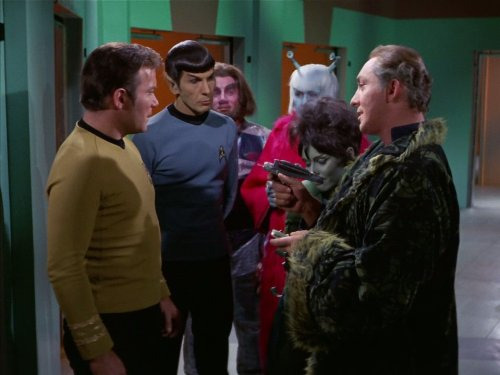
In short, characters can make or break a television show. It is vital that they be likable, or at the very least, interesting, lest the audience utter those eight deadly words:
I Don’t Care What Happens To These People.
Once those words are uttered, it doesn’t matter how gripping your narratives are. The viewers will start to leave.
See, while a film can get away with some lesser characters by distracting with an interesting concept, set-piece or a fast-paced story, television can’t. Thanks to a smaller runtime and a smaller budget, television, by necessity, tends to be character based. As a result, the main cast of a television show has to be able to work in multiple stories of different kinds.
This means that writing for characters on television can be pretty difficult.
The best television characters tend to merge two ideas together: That of relatability and entertainment value.
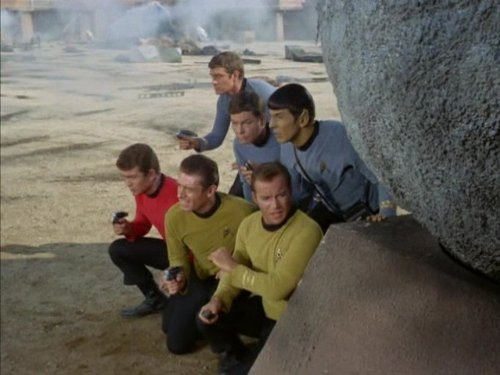
You see, television, like all stories, tells stories of exaggerated versions of reality, especially in the cases of science-fiction adventure shows like Star Trek. The only way to make an audience buy an unbelievable world is to create believable characters to place in that world, that relatability in the stories and characters. When we see McCoy’s frustration, or Kirk’s boldness, or Spock’s reservedness, we see elements of ourselves, our own personalities and lives. It is vital to make characters seem real, if not realistic.
The question is, does Star Trek manage to do that?
That’s the question we’re going to be answering today. Let’s take a look, starting with the Captain of the Enterprise Crew: James Tiberius Kirk.
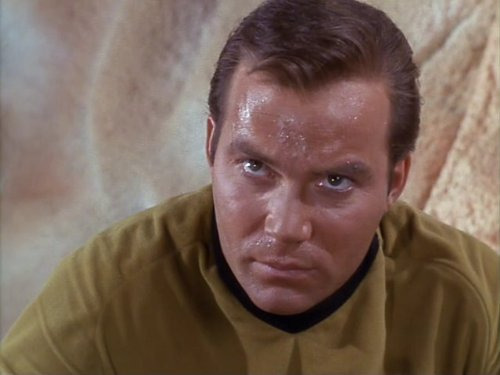
Kirk truly was The Captain in every sense of the word. A Reasonable Authority Figure who did far more adventuring than realistic counterparts would have, Kirk was an Action Man, level-headed, dutiful, and always loyal to his ship and his crew. A Bold Explorer (it’s in the job description), Kirk, while not fearless per say, took the Chains of Commanding quite seriously, and would often face down hugely powerful beings, power-mad computers, or other forces beyond him in order to save his crew. A Determinator to the last, known for his interesting ways to think outside the box and refusal to accept a ‘no win scenario’, he is the unquestionable Hero of the show, the Leader, who often throws the rules aside to do what he feels is right, in a constant battle To Be Lawful or Good. He was a Charmer, an expert fast-talker, and very smart. In later installations of the franchise, Kirk would become a Living Legend, much as he became in our own pop culture.
All that being said, the common cultural image of Captain Kirk isn’t quite right. Allow me to adjust it, as best I can.
More than any other character in Star Trek, or perhaps the history of television in general, Captain Kirk is possibly the most misrepresented character of all time. Since the ‘60s, Kirk has evolved into an icon of heroism, machismo, and brash boldness, with even the recent Star Trek reboot depicting, not Kirk, but rather, the distorted, separate idea of Kirk in the modern light.
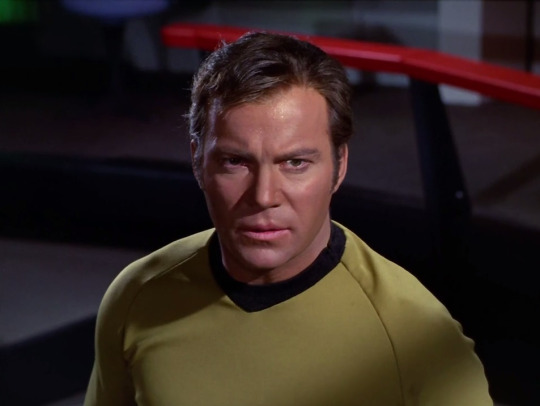
This idea, quite frankly, is just not right. While Kirk did have his share of romances, he was no womanizer, often entering into dubiously consented-to relationships reluctantly, in order to save the ship. The relationships he did actively pursue, he threw himself into wholeheartedly, and he was just as crushed as the other party every time they fell apart (for proof, watch City on the Edge of Forever or The Paradise Syndrome). Kirk was no player. As a matter of fact, he was a deeply compassionate man who respected the women in his life as much as he respected Spock and McCoy. It just so happened that the women in his life tended to not stick around, unlike his one true love: The Enterprise.
Even his reputation of the ‘Cowboy Captain’ isn’t accurate. As I mentioned before, Kirk was defined by compassion. His moments of ‘rule-breaking’ wasn’t to impose ‘the way he thinks things should be’, it’s because Kirk cannot bear to watch helpless people in trouble. The few times where he does break the famous ‘Prime Directive’ (To not interfere with less developed races) is to help. Kirk was a deeply moral character, determined to not stand by while people were taken advantage of. He wasn’t rash, either. While it may be accurate to say that the ship’s doctor, Leonard McCoy, was a bit on the hot-headed side, it is entirely inaccurate to accuse Kirk of the same. Kirk was an extremely smart man, a level-headed captain who was an expert at thinking fast. He trusted his instincts, but he trusted his advisors too, often finding a balance between McCoy’s impulsiveness and Spock’s cold rationality. Kirk’s intelligence and competence is often lost, overshadowed by his more extreme companions, and some audiences have forgotten the truth of Kirk’s character: a cunning problem-solver capable of saving the day under enormous pressure, whose decisions are far from based in irrationality. He is a romantic, duty-bound to protect his ship and crew, greatly exaggerated and mis-characterized in the years following his captaincy.
As such, Kirk was a well-rounded, balanced character, far more three-dimensional than the modern idea of him tends to give him credit for.
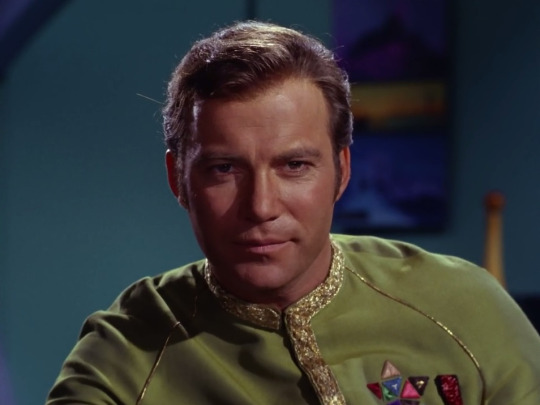
That’s all well and good, sure, but how does he fit as a main character in a television show?
As a matter of fact, absolutely incredibly.
Kirk serves as a wonderfully effective lead, compelling, entertaining, and interesting. Infinitely more developed than most leads of his time, and even more modern examples, Kirk was a game-changer, a revolutionary kind of protagonist who just worked. The perfect balance of the main trio of the series, Kirk is the perfect face for Roddenberry’s ideals: a hopeful pragmatist, an idealist who proves the best of humanity: compassion mixed with intelligence, boldness combined with understanding. A man of action surrounded by True Companions, Kirk was an extremely gripping protagonist who felt intensely, a perfect person for the audience to connect to and be invested in. He drove the stories, opposed the villains, and always saved the crew, as a hero should, but it’s important to note that Kirk was hugely human, possessing many of our greatest attributes, but some of our failings as well. He wasn’t perfect. Sometimes he made the wrong choice. In the end, though, he was us, or us as we should strive to be: always learning and helping, and always reaching for the stars.
But of course, Kirk wasn’t alone in his position as the ‘lead’ of the show. It’s doubtful the show would have survived in the popular culture as well as it did if it weren’t for his support team, his True Companions: Dr. Leonard McCoy, and, more famously: Mr. Spock.
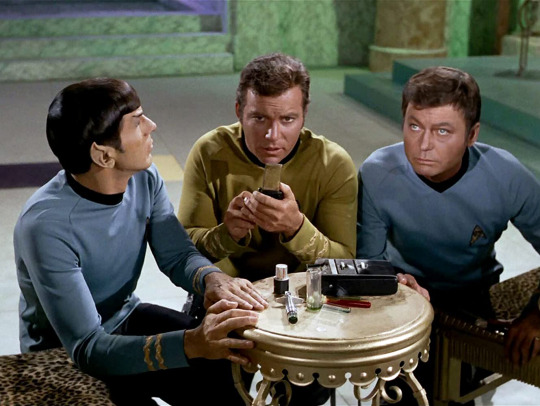
If Kirk represented the best of humanity, Spock represented the critique of it. In a previous article, I pointed out that Spock exists as a very unique character: a half alien, half human crewmember who, while equally valuable to the script and the characters as Kirk was, served a different purpose: to point out and explore humanity from the outside.
Like I’ve mentioned before, Spock is a different sort of character than Kirk is. Where Kirk is a demonstration of the best of humanity as we see it, Spock is a demonstration of humanity as someone else might. He served as a criticism of the human condition, a character at war with himself and his heritage, split between the emotional humans, and the rational Vulcans. Spock is the Number One, almost Comically Serious as he eschews his more illogical half and chooses to embrace the stoicism of the Vulcan people. A Gentleman and a Scholar, Spock has Hidden Depths, a heart of gold and deep emotions that he usually succeeds in hiding.
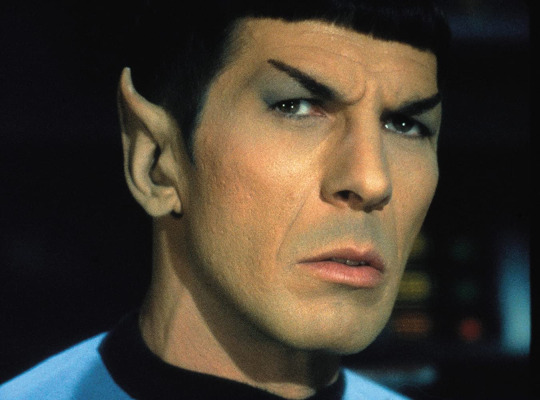
Most of the time. More on that in a minute.
Spock’s role in the show was The Smart Guy, the Stoic who had all the answers, all the statistics. He was the champion of impartial logic, of cold rationality. His job was to give Kirk the hard answers, to bring to him the facts and give him their options, especially the unforgiving ones. He is the cold to McCoy’s hot, a stern-faced, cold-blooded computer.
Or is he?
Much like Kirk, there is a lot more to Spock than meets the eye. While the cultural perception of Spock has often mutated into a parody of itself, much as it has done to Kirk’s reputation, Spock remains a much deeper character than he, or a brief skim of the series, lets on. As I said earlier, Spock is at war with himself, uncomfortable in his own skin. He insults humans for their humanity, but has strong, deep friendships with them. He is not above expressing frustration and their emotional natures when pushed (usually by other forces that knock his guard down), but isn’t frustration a human emotion?
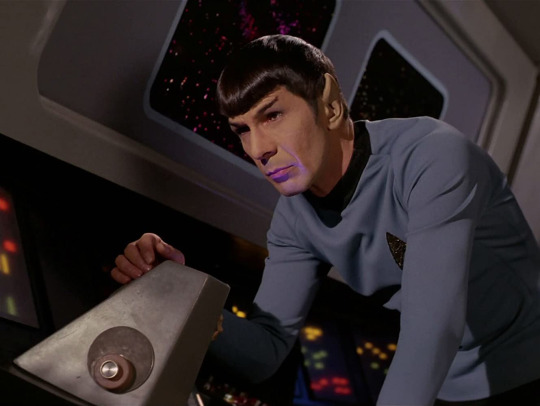
Spock is a bag of contradictions, a supposedly emotionless master of sarcasm, a man without feeling who invites his close friends (emotional humans) to a private Vulcan ceremony, a cold-blooded creature with undying loyalty who occasionally makes ‘illogical’ decisions that would make Kirk proud. A lover of music and a sympathizer to space hippies (Not one of Star Trek’s better episodes, admittedly), Spock was an outsider who fit neither fully as a Vulcan or Human, a person who was struggling to find his place in the universe.
At first, this seems incongruous with the ice-cold exterior he projects, however, rather than being an example of inconsistent writing, it’s a shining example of development and nuance.
You see, Spock never gives up his following of logic. He just begins to approach it differently.
Spock’s style changes slightly as Star Trek progresses (most notably in the films, released ten years after the show’s final season), from cold, ‘computer’ logic to something else: human logic.
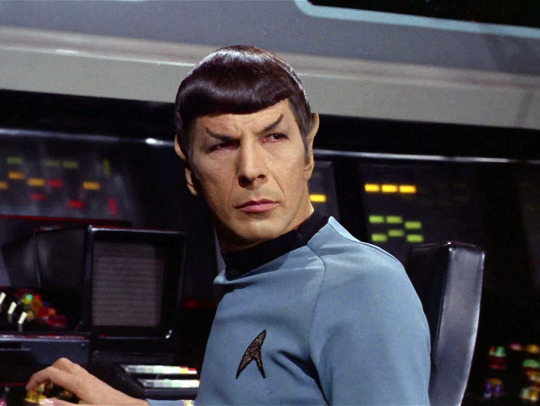
One thing of especial note in the original Star Trek show is that you could see characters visibly affecting one another. Kirk, Spock and McCoy all influenced each other in the ways they thought, reacted, and planned, and worked best as a unit. In this, the humanity of the main cast affected Spock in his slow, reluctant appreciation of human merits. In time, Spock began to make one or two decisions based on human logic, intelligence and emotion. In episodes like The Menagerie or The Galileo Seven, Spock makes decisions that seem out-of-character for him, based in emotion.
Spock is, in many ways, Star Trek’s best known and favorite character. The most visibly recognizable, as well as the most distinct, Spock is given more episodes exploring him than any other character, with installments like Amok Time and Journey to Babel, (the latter of which we explore his parents, and discover why it is that Spock has such a hard time with his human half) helping to examine Spock as a character.
The end result was a beloved science fiction icon, Kirk’s right hand man, an analytical, fascinating character as well-crafted and loved as Kirk himself.
Spock and Kirk are often remembered fondly, and are typically considered the most memorable and iconic characters of the franchise, but they don’t work alone. Their dynamic is as effective as it is because of balance. Spock is one extreme, and Kirk is the middle, but it’s no good without the other extreme: Dr. Leonard Horatio “Bones” McCoy.
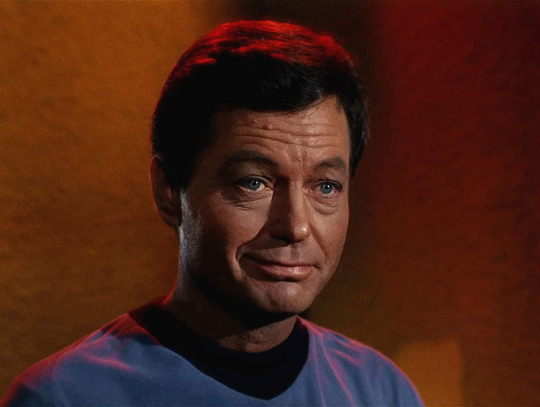
McCoy is all hot-blooded human, the third of the main Power Trio. An old-fashioned competent doctor who wasn’t entirely thrilled with deep space, McCoy is a deeply emotional character, duty-bound to follow his morals. He clashed with Spock regularly, routinely criticizing him for his perceived lack of emotion. Despite the fighting, McCoy respected Spock greatly, counting him as a close friend, despite their arguments and different perspectives. A cantankerous pacifist (though not above getting into the action when needed), McCoy is a Super Doc and a Sarcastic Devotee, a Grumpy Old Man who serves as the Heart to Spock’s Brain (hah!), a man who values Honor Before Reason who values the Good Old Ways. He’s a Determined Doctor who does everything he can for his patients, and a Deadpan Snarker to the point where he can match Spock in verbal sparring.
Bones represents the unpolished rawness of humanity, getting carried away with his emotions sometimes, but always with the best intentions. Another Jerk with a Heart of Gold, McCoy’s gruff nature accompanied a deeply moral man, very concerned with human empathy and doing the right thing. No philosophical discussion was complete without McCoy’s two cents, telling Kirk what he thought the right thing to do was. He was the quintessential Knight in Sour Armor, who would follow Kirk to the ends of the earth, complaining the entire way.

Despite the fact that he’s not as well-known as the other two members of the Power Trio, Bones was a vital component to the True Companions dynamic. His Vitriolic Best Buds relationship with Spock made up one of the most interesting and compelling dynamics on the show, serving as perfect counterbalances to one another. However, although his most famous role in the show was arguing with Spock (and delivering phrases such as ‘He’s Dead, Jim’), there is another, equally important position that he held in the trio.
McCoy served as a foil to Kirk, as well as one to Spock, a confidante, a close friend, providing perspective. While Spock was focused on the logic, Kirk on the best thing for the mission, McCoy’s focus was purely on the ‘patients’, the people, the right thing to do. No matter the situation, McCoy was the closest to empathy with the people involved, and provided the audience with another surrogate, saying the things that the viewers are thinking.
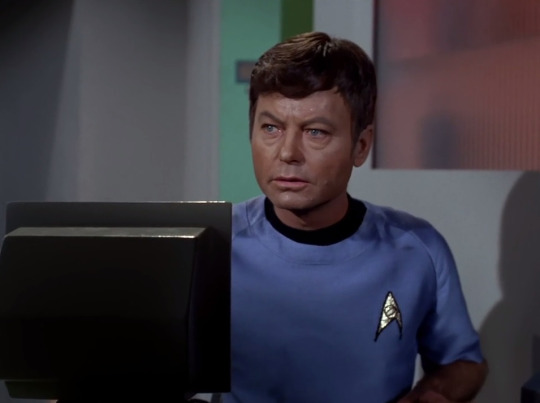
While not being a terribly big fan of space (and liking transporters even less), Bones was the epitome of the Frontier Doctor to the stars, taking care of every patient, even if they weren’t humanoid (Devil in the Dark) or a heavily pregnant woman who refuses to listen (Friday’s Child). McCoy was painfully human, reminding us of our most problematic traits while also holding onto that wild, fiery compassion that made him so incredibly humane, relatable, and understandable, making him just as vital to the Enterprise and her crew as Kirk or Spock.
The trio worked best together, providing a perfect main cast for an audience to follow. The formula was an interesting one, allowing the audience to hear separate viewpoints and ideas, listen in to the philosophical banter, and truly feel the strong friendship holding the leads together. The dynamic between them was powerful, an extremely vibrant bond that connected all three very different characters.
The result? Extremely dynamic characters that remain iconic and memorable even to this day.
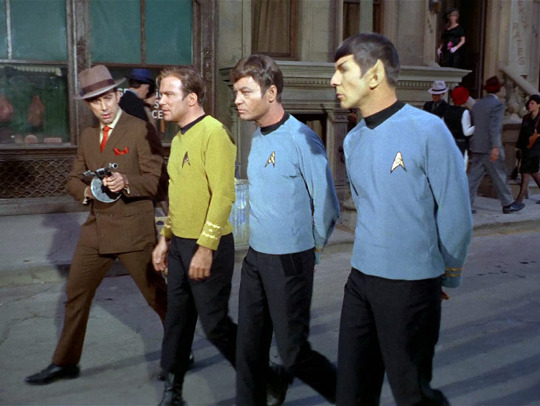
But the cast didn’t stop there.
The other characters of Star Trek, while not quite possessing the pop-culture iconography of the main trio, still hold their own rather impressive cultural footprint.
None more so than the chief engineer, Montgomery Scott.
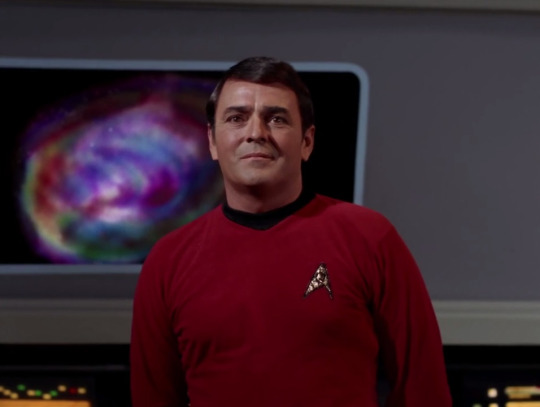
Scotty’s job was to be a miracle worker, solving impossible problems in impossibly small amounts of time. Whether it was the transporters, the phaser banks, the shields, or the engines, Scotty was the man for the job. Nobody had a better understanding, or love for the Enterprise than Scotty (except maybe Kirk). He was the king of outside-the-box solutions, and had the Enterprise jury-rigged to push her past her limits more times than can be easily counted. As the name implies, he was also Scottish, and extremely stereotypically so. Kilt, whiskey, haggis and all, Scotty was extremely proud of his heritage (though not quite as much as Chekov). Fitting the traditional stereotypes, Scotty had a fiery temper, with a Berserk Button triggered by any insult to the Enterprise. A Gadgeteer Genius (and the inventor of Scotty Time) as well as a Genius Bruiser, Scotty was both the brains and brawn, more than capable of holding his own in a fight, or thinking of a new, creative way to push the Enterprise past her capacity.
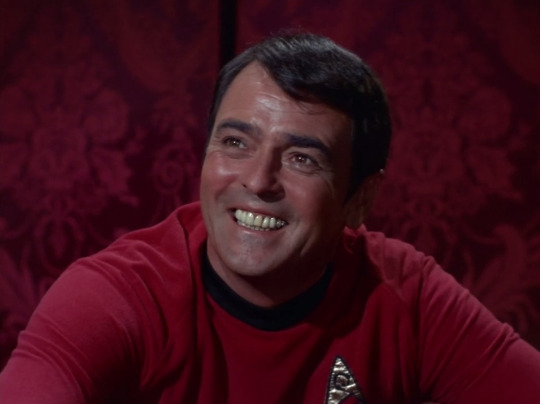
Scotty also held the distinction of being third in command, routinely taking the Captain’s chair when both Kirk and Spock were in the landing party. He was also the focus of a few episodes, making him a rare character with a Day in the Limelight, with episodes such as Wolf in the Fold, The Lights of Zetar, By Any Other Name, and The Trouble with Tribbles giving him a little more screen time and story than is typical. Scotty was an indispensable member of the crew, a life-saver on more than one occasion, and another of the legendary, iconic characters of the original Star Trek.
But it didn’t stop there.
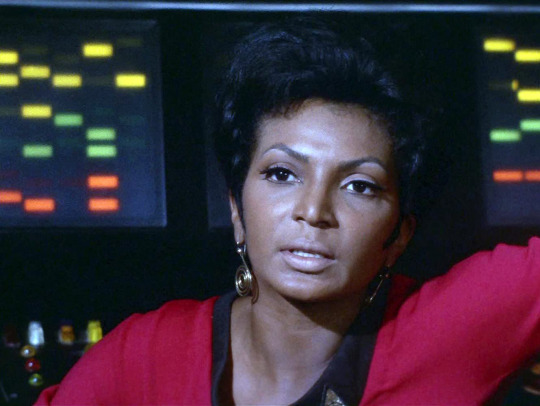
Lieutenant Nyota Uhura was another prominent character. As the ship’s communications officer, she codified the term ‘Bridge Bunny’, although she proved herself far more useful than she’s typically thought of. Whenever given the chance, Uhura is a capable Action Girl, intelligent, witty, and good at her job, being extremely fluent in multiple languages. She too got her days in the limelight, with episodes such as Mirror Mirror, The Gamesters of Triskelion, and The Trouble with Tribbles giving her more to do than just sit at her station and say ‘hailing frequencies open’. Uhura was Silk Hiding Steel, not typically in the heat of the battle, but tough as nails when she had to be. (I’ve talked about Uhura’s extensive influence on the real world in the Legacy article, but even that doesn’t scratch the surface of what Uhura’s impact has been.)
There were others on the bridge crew of equal importance, including the ship’s helmsman, Hikaru Sulu.
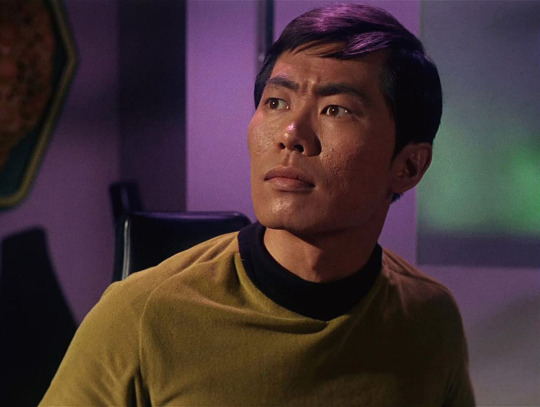
Sulu was a level-headed officer, amiable and cultured, with an extensive knowledge of botany, fencing, and antiques. Yet another Deadpan Snarker (it must run in the cast), Sulu is another Genius Bruiser, as skilled in fighting as he is in his piloting, with a great sense of humor. He is given special attention in episodes like Mirror Mirror and The Naked Time (Albeit as evil, and Brainwashed and Crazy), but often got great character moments in multiple episodes (especially Shore Leave). A reliable officer and loyal to the core, he made an interesting character by himself, although he did end up forming a fun ‘Those Two Guys’ dynamic with the youngest of the cast, Pavel Chekov.
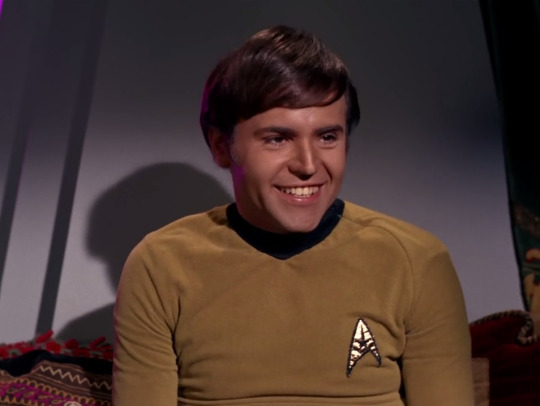
Chekov was introduced in season 2 as the navigator of the Enterprise. A bright young man with a fierce, passionate loyalty to Mother Russia (which evidently invented every good thing known to man), Chekov tended to be at the receiving end of a lot of the embarrassing agony in the series (mostly because Walter Koenig had a great scream). Also serving as a relief science officer, Chekov was plenty smart, if a bit of a Cloudcuckoolander, and the king of Cultural Posturing. Reckless and impulsive to balance Sulu’s calm good humor, Chekov’s temper tended to get the better of him. Like the others, he’s given a bit more screen time in episodes such as Mirror Mirror, The Trouble with Tribbles, The Way to Eden, The Deadly Years and Spectre of the Gun, but got to shine in plenty of other episodes, demonstrating his capabilities (despite being ‘The Intern’ and the Plucky Comic Relief) as a competent officer. Unsurprisingly, he was yet another Deadpan Snarker, lending his style of jokes well to bounce off of Sulu’s drier humor.
But there was more to the crew than the bridge.
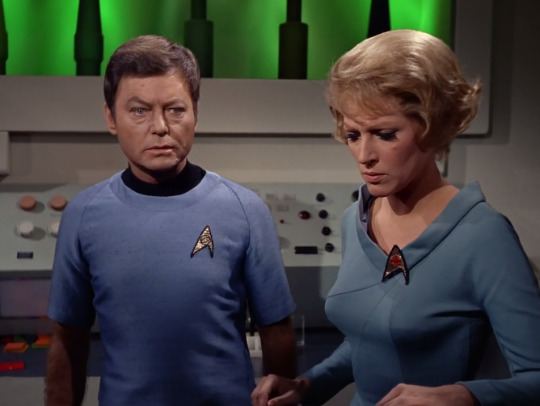
Another crew member of note was Christine Chapel, one of the nurses who operated in the sickbay. Chapel was notable for having an attraction to Spock, as well as being another in the long line of Enterprise Deadpan Snarkers. One of the most caring of the Enterprise’s crew, Chapel was given larger roles in episodes like The Naked Time, What Are Little Girls Made Of?, Amok Time, and Plato’s Stepchildren.
Arguably though, one of the most important characters in all of Star Trek was the Companion Cube: the Enterprise herself.
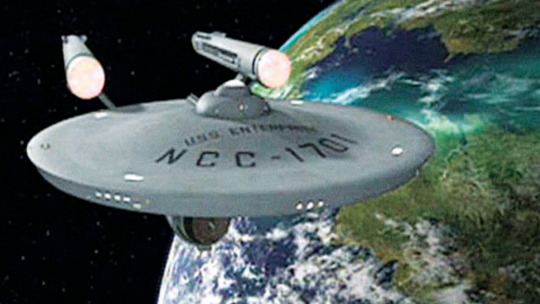
The Enterprise was one of the most powerful ships in Starfleet, a character in her own right. The epitome of the Cool Starship, the Enterprise was well known for Explosive Overclocking, and always coming through in the end (with a little help from Scotty). A Lightning Bruiser of a ship, the Enterprise became as legendary as her captain and crew, as beloved as the characters themselves to the point where one of NASA’s shuttles was named after her.
The characters of Star Trek are legends, both in and out of universe, and they are for a reason. No member of the crew is useless. Everyone has a purpose and a job to do, and each was distinct and unique. No two characters were the same, and each brought their own special personality and abilities to each episode they appeared in.
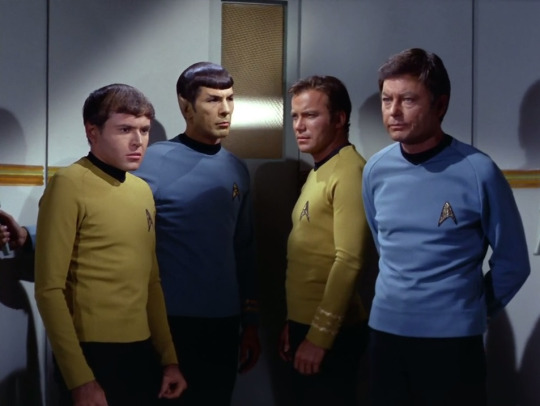
And that’s what made the drama of the show work so well.
Each character felt real, memorable and genuine. We as an audience worry for them with each danger, and cheer with each victory. We liked these people. We cared about what happened to them.
And they worked.
In each scenario and situation, the characters found new and interesting ways to deal with the circumstances, while never losing the core elements of their personalities. That’s important, hugely so. These characters were loved, and still are, for a reason. They work very well as characters, both in main and supporting roles, providing entertaining and compelling figures for the audience to invest in. The balance between relatability and entertainment was hit perfectly for every single character, allowing everyone to shine in their own ways in each episode. They felt real, and in the end, that’s the point of a character.
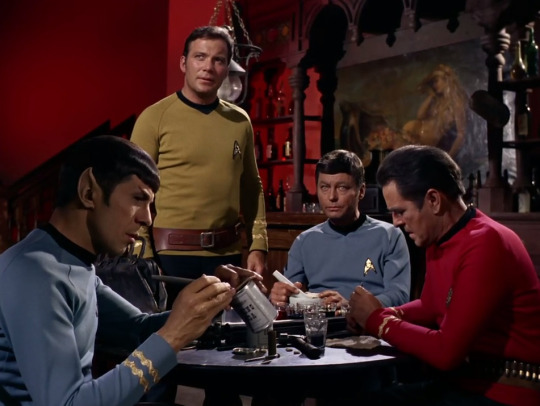
After all, one doesn’t get to be some of the most iconic television characters of all time by being boring.
Thank you guys so much for reading! Join us next time as we discuss Star Trek’s place in the times and the culture. If you have anything you’d like to say, don’t forget to leave an ask! I hope to see you all in the next article.
#Star Trek: The Original Series#Star Trek#TV#Television#TV-PG#60s#Drama#Action#Adventure#Sci-Fi#Science Fiction#William Shatner#Leonard Nimoy#DeForest Kelley#James Doohan#Nichelle Nichols#George Takei#Walter Koenig#Majel Barrett#Gene Roddenberry
133 notes
·
View notes
Note
Honestly, you should check out this Dante Wood fella on Quora. He’s this multi potterhead ship hater who asks many rude and insulting questions on Romione, Harmione, Hinny and Dramione shippers. He’s literally become the bane of their existence. I almost would feel bad for them but then I realize these are the same users/shippers that ask insincere questions to the other ship/shipper. Guess karma is a bitch;)
Hello, thank you for the ask!
Yeah, I checked out his profile and I'm not so impressed. He's hateful and spiteful. But I must admit, he has got a very fair point. Before I talk about that though, I'll just bring up a few things:
Even though he often underlines very important issues with our fandom's "ship wars," his account still shouldn't exist. He's rude and he goes the wrong way about sending his messages. He keeps spitting venom out of his mouth when he should try to be logical and explain his points without any insults and attacks. But when do respectful people ever get anything, it's always the drama and over exaggeration that draws people's attention.
He's hypocritical. He says he hates the fact that shippers constantly generalize the other sides of the fandom but he also generalizes shippers himself. He calls out shippers collectively, as if we were all to blame for a few people's toxic behavior and generalizing tendencies. He generalizes us (the shippers) by saying we all generalize each other (the other shippers).
He hates on Harmione/Romione/Hinny/Dramione and only justifies his hatred by the shippers. But just hating it isn't bad at all, everyone's allowed to hate something. The thing is, he also claims that all of these ships "suck" and are all "garbage." He never presents any arguments or constructive criticism, he just says they're objectively bad ships because they have bad shippers. I'm pretty sure everyone can see the problem with this logic.
Now about his messages. I must say, I agree with him a whole lot. So many people in this fandom tend to generalize everyone. Examples of this?
"Harmione shippers haven't read the books! They only ship it because of the movies!"
"You only ship Hermione with ___ because you use her as a self-insert tool! You ___/Hermione shippers only want to project your own feelings onto her, you don't actually understand her character!"
"All Romione/Hinny shippers are toxic! None of them respect our ship!"
"All Harmione/Dramione shippers hate Ron and Ginny"
And much more.
While many of those claims do apply to many shippers, they don't apply to everyone. And generalizing a group of people while talking about them negatively is obviously wrong and harms both sides of the "war."
The ridiculous argument that "Harmony shippers haven't read the books" started (or gained popularity) in 2005 when J.K. Rowling said this in an interview:
JKR: Well I think anyone who is still shipping Harry/Hermione after this book –
ES: [whispered] Delusional!
JKR: Uh ’ no! But they need to go back and reread, I think.
That one simple comment still affects the H/Hr shipping community to this day, even after JKR admitted the possibility of H/Hr in 2014.. People are still calling us dumb and delusional, people still claim that we haven't read the books - and this argument has been expanded after people started noticing how the movies were sort of pushing a H/Hr narrative - people still make fun of us and many don't take us seriously. But people were shipping Harmione long before the release of the movies and they (including me) have written countless analyses pointing out moments from the books and reasons why Harry and Hermione would make a good couple but this ridiculous generalization, a kind of rumor, is still around and I don't think it's going to leave any time soon.
The Ron and Ginny bashing rumor is more understandable since a huge part of the H/Hr fandom absolutely hate the two gingers and will find anything to tear them down and make them seem as cartoonishly evil as possible. But we still shouldn't apply this to everyone. I, for one, love Ron and Ginny and know many Harmione shippers who feel the same way.
(In the following paragraphs I am talking about the HP fandom generally but obviously these things don't apply to every person individually.)
The majority of the Harry Potter fandom these days only truly accepts book lovers into discussions and their "main" fandom (people who solely make video edits or such are in a different kind of fandom). But everyone who's a book lover and doesn't ship Romione/Hinny or dislikes Ron/Ginny will slowly be forced to either liking these or leaving the fandom. Because, according to most of the fandom, if you don't like these characters/pairings, you haven't read the books, you're toxic and you're stupid. If you like Harmione, you're automatically labeled with "Movie Watcher," "Weasley Basher," "Toxic Garbage." People will start making assumptions about you and your work before they know you. Even if people learn that you're not any of those, these generalizations won't stop. No matter how much you do, no one will take you seriously, no one will care, no one will accept you, no one will explore your work. You will only be acknowledged in the book-loving fandom if you ship Romione and Hinny or if you're an extremely toxic person (that way you'll get mocked for every word that comes out of your mouth, but you'll deserve it if you're really a toxic person). This fandom also tends to misunderstand the words "toxic" and "bashing." Any sort of criticism is labeled with "bashing" and the author of that criticism is labeled with "toxic." Not that there aren't people who are toxic and hateful but our fandom tends to fail to see the difference between constructive criticism and hate.
And there are also those "big" accounts who are praised for every word they say. They can bash any ship or character they want to and the majority of the fandom (the book-loving, canon-ship-loving one that I explained) will agree with it and spread their words around. When they say something about one shipper, it will automatically be applied to everyone who ships that. If they say that any ship with Harry and Hermione that isn't Romione and Harmione suck, the majority of the fandom will accept it as objective truth and since they have most of the fandom supporting them they feel comfortable repeating and accepting these things. As a result of these things being accepted as common knowledge, the people who don't agree feel isolated from the fandom. For example, I do. I follow lots of people who ship Romione and Hinny or love Ron and Ginny because I also feel the same way about these characters and pairings. But I can't go a day without seeing at least one of them degrade Harmione and send hate to the ship + shippers. The more hate my ship gets, the more these rumors, labels and arguments spread around. And Harmione shippers get called stupid for loving a fictional pairing, so I constantly feel invalidated in this fandom, even if no one addresses me specifically. The ideas that Harmione is a horrible ship and its shippers are toxic and so on are so engrained in our fandom that they're seen as almost "rules" of the fandom and no single person can change that. I constantly feel like I'm invalid for liking Harmione and this isn't normal. Our fandom pushes the idea that the only intelligent people are those who support the canon pairings and disapprove of ships like Harmione, Fremione and etc. I understand the hatred against Dramione and every other toxic ship, but I can't for my life figure out why people feel the need to tear down every healthy fanon ship. But they do it anyway. They consider everyone who disagrees with them "stupid" and unintelligent. I feel like I don't belong every time I see comments like "Ugh, how can someone ship Harry and Hermione? They're like siblings, people! You clearly haven't read the books." or "Anyone who ships this doesn't have a brain, they're too strongly influenced by the movies. They clearly don't understand Harry and Hermione." Sometimes I see my own friends calling H/Hr "strange" and such and they clearly don't help me feel any better. I feel the need to go in Harmony-only spaces to recharge myself and regain the confidence and get the validation I need. Otherwise, I feel completely isolated and invalid.
I can't blame only one side of the fandom though. The shippers have been divided for decades now and they have been throwing insults at each other ever since. It's a never-ending war. The bad side of this today is that the book-loving fandom (the "main" fandom) has merged with the canon ships fandom and now these are inseparable. If you like the HP books, you must also like the canon pairings and dislike most of the others, otherwise you're never going to feel like you belong. So now anyone who ships Harmione won't be able to properly interact with the "main" fandom because nobody thinks their opinions that Harry and Hermione are a better match than Ron and Hermione are valid. Same thing with Dramione shippers. Do you see how Dramiones and Harmonians don't really engage in discussions or just don't interact with the "main" fandom in general (unless they're defending their ship)? They have created their own spaces, separated from the "main" fandom and that's where they are most of the time. That's where I go when I need more positivity and validation. I have the discord server and the Harmione subreddit to go to. That's the only place I'm really comfortable in. If I go to a more "general" part of the fandom like the main HP subreddit or some of the biggest HP books fan accounts, it will affect me negatively because I will mostly see Romione and Hinny be glorified and Harmione treated like trash. Not only my ship but also the shippers. Which is probably the main reason I find the fandom toxic. All of this just ties into the stupid generalization and name-calling that causes the rift between OBHWF and Harmione shippers which leads me to seeing both sides of the fandom be attacked and bombarded depending on which space I choose to spend my time in.
I'm not going to pretend that the Harmione fandom is full of angels who are oppressed by Romione shippers. Because whenever I go to a Harmione-oriented space, I will find anti-Ron/Romione/Hinny/Ginny (and their stans) posts. Harmonians will often call Romiones toxic and hateful and will basically do everything in order to insult them. And they return the favor excellently. This happens with the majority of the fandoms so both of the sides just think every shipper is like the toxic shippers they interacted with, causing generalization and all of the problems I talked about above. And that forms a toxic environment.
I generally just talked about my experiences with generalization and insulting but there are many more things wrong with the fandom, so I definitely agree with Dante Wood in that aspect. But again, I don't think every single shipper is toxic and hateful and I most certainly don't think that Romione, Harmione and Hinny are trash (Dramione just might be). I pointed out all of my reasons for disliking his account at the beginning of my post. I just wish he fixed those problems with his account, then he would have such a great one.
I almost would feel bad for them but then I realize these are the same users/shippers that ask insincere questions to the other ship/shipper. Guess karma is a bitch;)
Here's where I get confused. Why did you send me this message? I am not one of those people who go and attack a part of the fandom I disagree with. I don't constantly attack Romione and Hinny, nor their shippers. I actually love those ships. I might criticize Dramione and other toxic ships but I'm not the one at war with them. I know I wrote a post basically calling Dramiones brainless once and I regret that. I think I'm a better person now. No matter how much I hate this ship I won't send hate to its shippers (P*dophilic ships are a different deal though, those ships are even more serious). So how exactly is this a consequence for what I've done when I've done basically nothing? And even if I did, how is Dante Wood's account supposed to affect me? He talks about the toxicity of shippers while being toxic and hateful himself. Am I supposed to take that seriously? He calls us hypocritical and proceeds to do the same himself. That's not the kind of person I take criticism seriously from (ignoring the fact that many of his posts aren't even criticism, it's just hate).
Anyway, thank you for taking your time to send me that message! Sharing my thoughts on Dante Wood's thoughts and account was fun! :)
13 notes
·
View notes
Text
Mastering Midpoints (The Saviors of Saggy Story Middles)
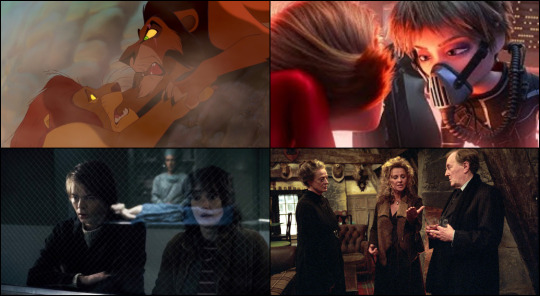
I've been pulling my hair out lately trying to fix the middle part of one of my novels, and one of the main problems with it, relates to the midpoint. You see, I plotted and largely wrote this manuscript years ago, before I had an in-depth understanding of story structure--like a lot of us have probably done. Heck, a lot of us don't even like thinking about story structure because it feels too restrictive and formulaic, and that's fine. But whether you plot your stories' structures by the books or just do what you want as you go, understanding story structure can be hecka important. And even if you hate it, at least knowing how it functions can be super useful, especially if you are trying to troubleshoot what is wrong with a manuscript, like I was weeks (months?) ago.
Once I realized that my problem related to the midpoint, I was able to begin brainstorming (and praying) how I might fix it. And a lot of times, the midpoint is key in doctoring a problematic middle. I kind of like to think of it as the savior.
The midpoint typically happens in the middle of the plot (no surprise there). It is the moment when new, significant information--or at least a shift in context--enters and turns the story in a different direction.
(Wow, is that definition vague enough?)
Now, the direction of the story can change completely, like a 180, or it may be very slight and subtle, more like 10 degrees, but it changes in a significant way.
Most often, in a typical story structure, the change is this:
The protagonist moves from being primarily responsive to being more (pro)active, in regards to the main plot.
So, it's usually like:
Character responding to problems --> Midpoint (new information or context) --> Character being proactive toward main problems.
The "new information" is just something that allows the character (or audience) to have a greater understanding of what's going on, so that they can now be more active in attacking the problem.
There are literally so many ways this can play out, which is why the midpoint can seem difficult to grasp, so I'm going to grab some popular examples:
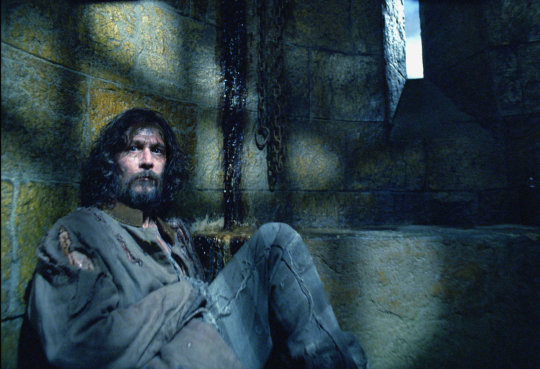
In Harry Potter and the Prisoner of Azkaban, the midpoint happens when Harry overhears the professors in the Three Broomsticks and learns Sirius Black is the reason his parents are dead.
Why? Because prior to this, he is responding or reacting to the fact Sirius is after him. But after this, he wants to seek revenge on Sirius, in other words, mentally, he becomes active in "attack mode."
In Legally Blonde, the midpoint happens when Elle realizes that she will never be good enough for Warner.
Why? Because prior to this, she is just responding to Warner's breakup. But after this she is actively trying to succeed at Harvard, with an intensity she hasn't had prior--she buys all new materials, studies hard, answers questions in classes.
In Interstellar, the midpoint happens when Cooper, Murph, and by extension, the audience, realize that there is no real "Plan A"--everyone on Earth is going to die.
Why? Because prior to this, Cooper is responding to the destiny of humankind, but after this, he goes into an active "attack mode" by planning to do whatever it takes to return to Murph and Earth right away.
In Ralph Breaks the Internet, the midpoint is when Ralph realizes he can get the money they need from making viral videos.
Why? Because prior to this, he is unsuccessfully responding to the broken steering situation and the internet itself, and after this, he hatches a solid plan to get the cash, with a better understanding of how the internet works.
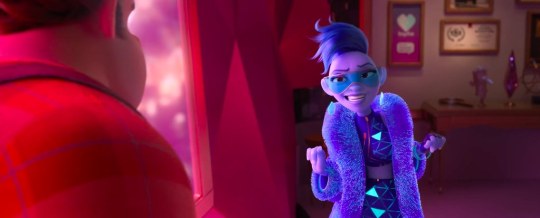
But a midpoint can be rather loose, which is why it's hard to define and wrap our minds around. For example, I may use terms like "respond" and "reaction" paired with "attack" and "pro-action," but you could argue from another perspective, some protagonists are doing all of them all the time. For example, from the inciting incident, Ralph is trying to actively solve a problem, and same goes for Cooper. But here's the thing. At the midpoint, new information or a new understanding allows them to "attack," better or more accurately, the focal conflict.
Think of it as a moment that jump-starts the protagonist into a different direction.
In some cases, this may be a rather unexpected direction.
In Lion King, Simba spends the first part of the story reacting to the fact he will someday be king, but then the midpoint hits--Mufasa dies and Scar tells Simba no one will ever love or forgive him--Simba goes into an "attack" mode of sorts, except his is that rather than just responding to being king someday, he proactively chooses to never be king, and takes action by running away and starting a new life. It relates to the main conflict of the story, but his "attack mode" is to actively, intentionally, run away. After all, he thinks he is the problem, so in a sense, he is "attacking" himself.
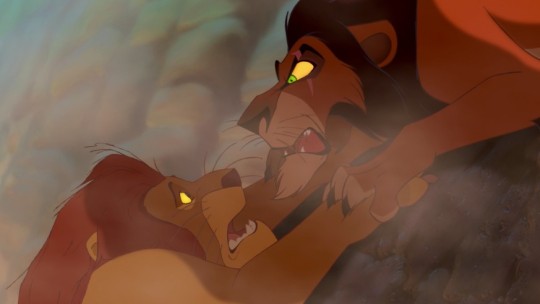
The content of a midpoint can be very flexible, as you can see from these examples. If you want to get a better discerning eye for what a midpoint is and how many different forms it can take, start pausing movies smack dab in the middle--there should be something around there that enters the story and pushes it in a new direction. You can also try opening books to the middle and searching around there. Harry discovering Sirius is responsible for his parents' deaths is near the middle. In Stranger Things season one, Will's body is found smack dab in the middle, which is new information that changes context, and therefore the direction of the story. And after that point, the characters have to all decide how to act next.
So now that we have some idea of what a midpoint is (significant information that changes the direction of the story, usually by changing the protagonist), let's talk about how it actually works.
Step One: New Significant Information Enters . . .
In order for a story or protagonist to start going a new direction, there has to be something that causes that. Information. Or an event that is new information.
Or at least a shift in our understanding of the information we already have (context shift), which in a sense, is its own kind of "new" information.
But let's not confuse ourselves quite yet.
In order for the information to significantly change the direction of the story, the information itself needs to be significant.
Remember how I broke down what constitutes "significant" a few weeks ago?
Something is significant when it either:
1) Has important personal consequences, or
2) Has far-reaching, broad consequences
So, new information enters the story that has personal or far-reaching consequences. This means that the midpoint itself is either going to "broaden" or "deepen" the story, or do both. And it's going to do this in a powerful way.
Elle realizing that she will never be good enough for Warner has deep (a.k.a. personal) consequences. Harry realizing that Sirius is responsible for his parents' death has deep consequences.
Cooper learning everyone on Earth is going to die has broad consequences--all of humankind.
Simba believing he killed his father has both personal and broad consequences, as it affects himself and his whole kingdom.
Sometimes the new information is big and mind-blowing, maybe even a juicy twist, like in Incredibles 2 when Elastigirl realizes that Evelyn is the real Screenslaver, and she's in deep trouble. Or it can be subtle, like a character making an important connection between information he already had.
Like I touched on earlier. The new information can come as:
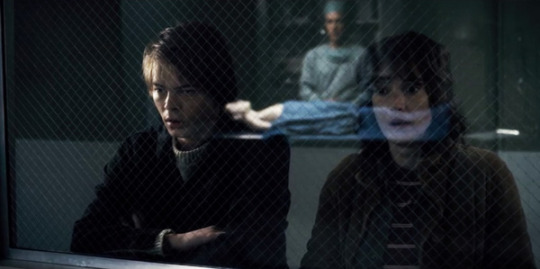
Information
- Ralph learning he can make money by making viral videos is straight up information.
- Harry learning Sirius is responsible for his parents' deaths is straight up information.
An Event
- Scar killing Mufasa and telling Simba it's his fault is an event. Mufasa being dead and Simba believing he is responsible is the "new information" (along with the fact Scar actually killed Mufasa).
- In Stranger Things season one, Will's body being recovered is an event that brings in new information. The characters either have to accept he's actually dead or prove to others he is not.
Or a Context Shift
- Dr. Brand reciting a poem he's recited through the whole movie isn't really anything new. But him reciting it on his death bed in that tone shifts the context and gives it a whole new meaning, which leads to characters' new realizations.
Whatever the case, something significant arrives in the middle that changes how the story has been going. And this something needs to have greater potential consequences than probably anything that has happened since the inciting incident.

Step Two: . . . Which Leads to a New Direction or Understanding
Now that new, significant information has entered the story, it means the protagonist or the audience (or both) will change their approach to the problems, because their understanding has changed.
In some stories, the change may be aggressive. For example, in Incredibles 2, I would consider the results of the midpoint to be more aggressive and drastic. Elasticgirl falls under Evelyn's control, and later, so do other superheroes. The midpoint means that this problem is going to be much more difficult to solve than we first thought. (Note though, how all the of protagonists (the family) change more drastically after that moment.)
In other stories, the change may be softer. Sure, Harry now wants revenge on Sirius, but content-speaking, this doesn't drastically change what happens in the plot, until the climax, when he meets Sirius. The midpoint is still critical, for Harry, and for our understanding of the story, but Harry's "attack" mode is not super aggressive. The midpoint largely changes the story's context. We all now see everything with Sirius in a different light, and we also now have more things to worry about.
In either method, the midpoint kicks up the tension, like a catalyst.
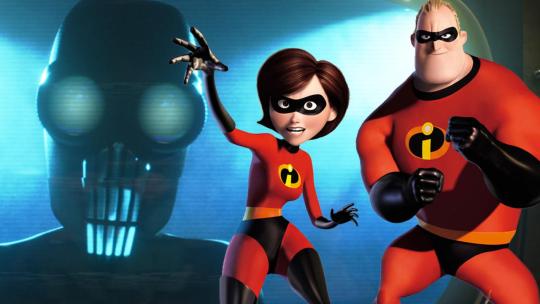
Variations
Like everything in writing, you can break rules and play with variations. Once you understand what a basic midpoint is, you can mess around with it, to an extent.
Often a midpoint is, well, a point, a moment, an instant, or a single scene. But sometimes, like plot points, it might be more of a sequences of scenes. It might be a sequence of information. For example, in Into the Spider-verse, the midpoint is when the heroes successfully get the computer from Alchemax and realize where they can get another goober. Prior to this, Miles and Peter are largely responding and reacting to their situations. During the course of the Alchemax scene, they learn to work together, and Miles learns to use his abilities. They also learn some new information about Kingpin, Doc Oc, and the collider. But in the next scene, it's Gwen who says she knows how to fix their problems. There isn't really a strong, critical, earth-moving moment, but rather a sequence of new things that bring them into "attack mode."
At some midpoints, the protagonist doesn't learn new information, but only the audience does. The protagonist can still get more desperate in solving the problems, but it's the audience alone that has the greater context. Because it still changes the direction--our understanding--of the story, has significant consequences, and kicks up tension, it can still work as a midpoint, if an unusual one.
On the flip side, it may be that the midpoint brings in information that is new to the protagonist, but that the audience already knew or surmised earlier, but the fact the protagonist now knows changes the direction and meaning of the story in significant ways, jump-starting the next part of the plot.
Some stories may place the midpoint a little earlier or a little later than the middle, and if that doesn't mess up the pacing or make the stakes drag, why not?
Some stories may even have multiple midpoints. In Story Engineering by Larry Brooks, he talks about this in regards to The Da Vinci Code. One moment is when Langdon and Sophie decide to meet Professor Teabing, who is "The Teacher," and another moment is when they learn what the Holy Grail actually is. Each moment changes the direction and meaning of the story.

In particular, you may have multiple midpoints when you have multiple plot lines. For example, in Prisoner of Azkaban, Harry learning that information about Sirius is a midpoint, but a lot of the other plot lines hit a midpoint near there as well. Harry hasn't been able to get to Hogsmeade, but in that same chapter, Fred and George give him the Marauader's Map--new information that drastically changes his ability to travel. There is also a plot line about winning the Quidditch cup, and near the middle, Harry's broom gets busted and someone sends him a Fireblot, drastically changing things.
For the werewolf/Lupin plot line, near the middle, Snape substitutes D.A.D.A. and teaches about werewolves, particularly how to recognize one. With the Hagrid and Buckbeak plot line, in the middle, the trio learns that Buckbeak has to go to trial, and they promise to help with it. With the Dementor plot line, around the middle, Harry falls off his broom and then Lupin offers to teach Harry the Patronus charm.
In short, every plot line hits something new and significant that changes the direction of it. It is almost always something greater than anything that has happened since that plot line's inciting incident.
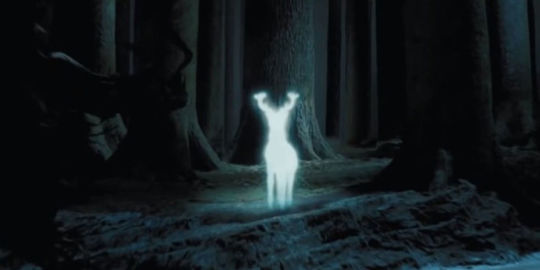
If you find your story middle isn't coming together, check the midpoint(s). Think of the midpoint as the nail you hang your story's whole middle on. It transitions from the first half of the middle to the second half of the middle. It's the story's middle middle.
Related Posts:
Story Structure Explained: Pinch Points, Midpoints, Plot Points, and Middles
How to Write Stakes in Storytelling
What to Outline When Starting a Story
#writing tips#writing tip#writing tips and tricks#writeblr#fanfic#writing a book#midpoint#story structure#author#editor#harry potter#incredibles#legally blonde#ralph breaks the internet
881 notes
·
View notes
Text
On Comments, feedback anxiety on both the writer and the reader’s side
If one could look into my WIP draw, or take a glance at the fics I’ve actually posted, it becomes clear misunderstandings based on miscommunication is something I seem have a thing for. In all honesty is more of a lifelong study and recurring theme I keep stumbling on or consciously walking into.
Preface: I am only human and mistakes can happen, but usually I try to handle the detailed label (also referred as Read the Tin or as written on the tin) of major warning with my writings that is usually missing in any other aspect of life, sort of a lovely user manual/preview so one could know to walk away before getting invested or worse triggered.
Or at least know exactly what they signed up for.
Is it perfect? No but at least it’s there, as a writer I did all I could to avoid unpleasantness, the rest it’s up to the reader’s discretion.
Which leads me to the heart of this post: comments, feedbacks, criticism, politically correctness, manners and the anxiety they produce in both the writer and the reader.
The picture is big so I’ll divide in sides, but remember that people are made of multiple sides, and sometimes those sides are at odds or outwardly warring against each other. That’s pretty average for any irrational human being with emotions.
From the POV of an overthinking anxious writer:
1) Ao3′s Kudos are sort of like a watered down thumbs up, after about 4-5 fic posted (or ~15K words of stories out there to be consumed), they became the kind of anxiety triggers feeding thoughts of why so many people/guests left a kudo but the story wasn’t good enough to warrant the time of a comment/review
2) Comments are lovely reminder someone found something in your words that made them react so strongly they felt like sharing that reaction with you was worth their time.
2.1) Comments are also the cause of anxiety about their content before you have the courage to read what they says...
3) Criticisms and feedbacks can be a wonderful tool to improve your writing for the next story. But not if they are laced with insult, personal attacks in that case they are the kind of black hole that pushes people to stop writing all together, or at least stop sharing what they write.
4) single emoji (♥), 2 char long (<3) comments takes years of effort and a lot of conditioning to remember to slip in reader mode and appreciate the effort it took to stop and do even that, instead of allowing doubts to gnaw at the back of your head with waaaiiiiit that’s all? was it good? was it bad? arrrghhh what does it even mean???
5) Statistics and numbers, those are the evilest of the most buggering things and the most vile tempters that will push you to compare your stories against others (a futile exercise in frustration and pointless reason to shred one’s own self confidence to the tiniest of pieces for literally nothing)
5.1) Especially when you have two writing mind frames:
writing the stories you want to read (and usually it is either a niche where you’ve already consumed all you could find so you write it because duh, more content might ignite back the fire please, or you haven’t found yet someone to say it how you want to read it) vs what I simply call
exorcism writing (the kind of free therapy exercise when something is bugging the heck out you and not leaving your mind so you put it down to words and then let them fly free, instead of trapping them on a diary you’d just return to read and start the vicious cycle all over again)
5.1.1) and your exorcism stories become more popular than the stories you want to read, because at the end of your raw ranting exorcism you managed to write something that would end up falling within mainstream tropes. Which just makes you sad because those were not the result of love and planning and endless hours of writing and editing that you put in your other stories.
6) I’m not writing fan fiction to be an educator, it is possible that my day job is being an educator, but unless I’m there writing textbooks, as a writer it is not my responsibility to teach the reader something that has to be authentic, realistic and a good practice. I’m just here to tell a story.
Or are you really telling me that you watch superheros movies and series and expect them to appear outside your window?
If you just laughed then why are you looking at fanfic smut with the expectation of finding a more interesting and alternative way to have a sex ed lesson? If you subscribe to the school that a story has has to make sense... Let me ask have you ever read some of the greatest literature works like Frankenstain, Moby Dick, The Hobbit, Journey to the center of the Earth, Alice through the looking glass, Aeneas, if you did and subscribe to “fiction as to make sense” then please please enlighten me I’m rady to sit back and hear all the points you can make how any of those are realistic representations of how things go. If you says that those are just stories told oh so long ago... Lets pick more recent ones, the Harry Potters books, Goosebumps, Twilight, The Shadowhunters Chronicles, 50 shades of , all those are listed as fiction which yes sadly too many used as a portrait of theme touched in there as realistic because the story was not set in a fantastical world and made the mistake of treating a work of fiction as a documentary... Sorry people I’m a writer, choosing the right words matters, words meanings and definitions matter please learn to think critically, and learn your words, there is a difference between fiction and documentary
6.1) At the same time it might be that I am the kind of writer who loves to add factually authentic things in my writings, someone who actually had spent hours and hours on research to make sure that what they have been writing is not utter and complete made up rubbish, and that’s ok too. I do not expect readers to assume it is correct or that it is purely made up, and if someone is curious they could use the comment to ask a question, I’ve never turned out a curious question, even when it was difficult to answer it
7) Just because I am writing about something, it doesn’t mean I support it... Again those are stories, not a scientific report on a lab experiment, I can write about abusive relationships, doesn’t mean I support them, I could write about self harm or depression, doesn’t mean I am encouraging those behaviors, in fact those usually come with a Trigger Warning, why? because a reader should have the option to walk away from what should be just a moment of pleasure and relax, not finding themselves triggered because I didn’t want to spoil the surprise of what was going to come in a story posted on the internet...
8) This far I’ve personally chosen to not push for comment, no beg necessary, I decided years ago to be the kind of self centered bad ass who writes for themselves, who’s not going to dangle the promises of more chapters in exchange for comments, I dislike the practice, and I find too exhausting shouting left and right hey hey I’ve written this read it read it... So I do get why my stories do not have such a large audience, it doesn’t help I’ve actually posted way less than what I’ve written over the years. I do welcome comments, though I have no clue on how to respond to short ones, or a single emoji/<3 to all chapters to those I end up answering only to the most recent one of that person and thank for their support.
Longer comments are easier to answer because it gives me something to say back or comment/thanks for, though it becomes weird for me when someone speculate on future developments in what they wish to see, and since I’ve recently adopted the policy of posting only completed stories (even for the chaptered ones that will not be posted at the same time, the number of total chapter is not an estimation it is exactly the number of files I’ve divided the story into for reasons) because I do know whether something of that sort will happen or not, and I don’t want to put someone out of my story if they are too invested in see what they imagined happen... Though as I do write stories I’d like to read I’m quick to encourage aspiring writers to feel free to take that what if and work with it, just to please mention that my story inspired theirs and that I’d love to see what they come up with.
Constructive criticisms, I do not have a beta for most of my works, I do not work too well depending on other people’s time, I confess even in the past I received criticisms that were not constructive if we push the boundaries and call those criticisms rather than just plain old complains, which is sort of the reason why I stopped explicitly encouraging communication. Because I do expect respect, you don’t know anything about me or what I believe in, you might make some guesses from my profile because I haven’t been shy and pretty open on them, but I won’t accept being personally attacked or talked to in a disrespectful manner just because you didn’t like what I wrote. I have no problem accepting criticisms, as long as they are criticisms and not just whining. You cannot come to me with “I hate your story” and leave it at that, you already took the time to express your opinion instead of simply walking away, the least you can do is explaining why... Otherwise I seriously don’t get why you wasted both of yours and more importantly my time and energies...
From the POV of a spoonie reader who barely has the energy to read:
1) Ao3′s Kudos are a life saver that allows you to show your appreciation (even if you are allowed only one as registered user) with only a click (and some times even that click takes so much out of you) instead of relegating you to invisible reader, barely visible number (*coughs*ff.net*coughs*) or forcing you to make a story a favorite/followed
2) Comments are the source of anxiety, because you might want to show support but would they get that or would it sound strange? will the author understand that a a ghsafdgsakdjfh (read: key smash) happened with excitement and love and you’ve no other words to express it?
2.1) also trying to put your support in words when you are in your pj cozily being a blanket burrito and reading from your phone in bed because there’re no more spoon left for the day it’s hard
3) The author asked for R&R, or welcomes comments and constructive criticism. You loved the story enough to spend energies to
point out things that were plain plot hole or downright inconsistency or lose ends, pointing out botched translations from your own mother tongue and offering correction that were not google translated, in ao3 case pointing out lack of some appropriate tags, which would have 1 improved your story’s visibility and 2 allowed the reader to choose whether they wanted to read it or not both points that would have benefit you as author...
Only for the author to react:
- badly with a why are you such a nitpick hadn’t anyone told you that you should just stay silent if you have nothing nice to tell me? - Excuse me you’re the one asking for my opinion not my adoration, I gave you exactly what you asked for, if you cannot handle your work being nitpicked or the holes in your plot being publicly poked then there’re fabulous people called Beta reader who will give you the needed dose of though love in private get one..
- badly with a don’t like don’t read - legit reader’s counter point is I wouldn’t have read it if you had given me a way to know then what I discovered now [personal addendum, on a not that well low energy day it takes me less about 3 mins and half to read 1.5K words don’t came at me on your 1k long story and tell me I could have stopped reading when I noticed it wasn’t that good for me...I was done with it before I could get any warning]
- dismissively because a meet cute clearly is an AU - Bless your heart if you need me to point out to you that there is a difference between an Alternative Universe (AU) and a Canon Divergence and the fact that
meet cute is a trope which in fandoms usually implies different circumstances within the fandom’s canon world of the first meeting between the characters in the main relationship but doesn’t automatically include different premises for the character example:
in canon:
characters from a magical supernatural fandom one a wizard with magic, one a fighter with superhuman speed and holy weapons, in their first meeting the fighter saved the wizard’s life.
in a meet cute:
a wizard and a fighter with superhuman speed and holy weapons meet in the middle of the forest where the fighter was hunting for food failing miserably and the wizard took pity on the fighter and offered to share their dinner, if the fighter dared to step inside the wizard’s home
in a No Power/Human AU meet cute:
where there is no magic, one of the two is a barista who uses flirty coffee jokes lines to call the other’s person order, and finally discover they are an accountant so instead they start using math puns to get the accountant’s attention.
Those are all valid stories but as an author don’t came at me believing that just because you mention a trope that is enough to distinguish between the 2° and 3° examples, or that having mentioned the trope gives you the standing to look down at me if I do have my own reasons that you do not know about for wanting to read only stories like the second pitch and get upset but still tell you in a polite way that there are missing tags in your story, especially when you’ve falsely advertise your 3° like pitch as if it was a 2° one and I get upset and let you know about it and do so with the curtesy of signing it with my name rather than leave an guest/anonymous comment
- shrugging off issues with the tags with a Oh but I’m bad at tagging -
then I have 3 things to say to you buddy one) that’s not an excuse if you haven’t learnt how to do it yourself get a beta, get a friend, read more and compare what your story tells with a similar one and how that one is tagged, there’re ways Ignorance is not an excuse;
two) you can’t claim you’re bad at tagging but then refuse to listen when someone is pointing out to you more tags for your story, dud learn how search engines work, searching by tag is basically having a filtered search, the more tags your fit your story the more venues your story can appear in reader’s search for something to read... which means visibility for your work, are you really telling me that you dislike to have that and would prefer less people reading what you post? then sorry but I think you’re doing it wrong and should get a diary instead, not post them on the internet.
addendum: still claiming to be bad at it after having posted over 40 stories and all posted in recent times in the span of a couple of months, just suggest you lack the intelligence to learn how to do things. Which only encourages me to never ever get close to your works, certainly to never promote or share them if not actively discouraging my friends from spending their time on them.
three) and guess what? there is a frikking I'm Bad At Taggingtag for that too!!!
As a reader I might be ranting in this post, but the long effect of those is a growing apathy and increased unwillingness to spend my energies for commenting unless I’d really really really really liked or loved a story, or I have something more than a one liner to share, which while I intellectually know it might be unfair to let the whole pay for the disrespect of few, my own survival instinct is glad I’m not spreading myself even thinner...
truthful disclaimer: in all fairness it has been my experience, that those reactions usually come from authors with already quite few stories or a decent word count out there.
New authors are still very much enthusiastic and happy about even the smallest crumbs of recognition or encouragement, which in return is lovely because it recognise that my own time and energy as reader are worthy, that it does take effort to share an opinion or encouragement or suggestion.
4) The author might never know how that day I posted that single emoji, or two character <3, it was one of those bad days when even opening a small water bottle to swallow down the painkillers was too much, when using a finger to scroll down the page to reach the end of the story had wiped out more energies than I could really afford and yet I still pushed myself to leave a sign that I was there and appreciated their story
5) readers should be allowed to have the “if you thought writing was hard, try commenting other people words” tag... because sometimes especially on older platforms (yes ff.net I’m looking at you) as a reader I can’t find the energies to wipe up something to say so I become a silent invisible reader. And sometimes it’s really that I am able to stand only stories with certain characteristics, personally for example I do not have the emotional fortitude to read more a certain amount of Work In Progress at the same time across multiple fandoms because my brain can’t recall all the details and I might not feel to rereading the story from the beginning every single time there is a new chapter...
6) Maybe it’s because I’m way out of my teens, maybe it’s because even in my teens and before stories were my safe place, my escape, I do not expect things to be factually correct in stories, but I am a logic driven person, I will see those plot holes and I might even poke through 'em if I find your story good enough that I feel it would be a pity not pointing those things out. You cannot tell a classic vampire story (not the twilight kind of sun sparkling vampires but the sun burn me to ashes kind) and have your group of vampires prancing about at noon of a clear summer day without some sort of reason for that to work.
I promise you, I’m not picky, I will accept ridiculous reasons like they were standing under and umbrella covered from head to toes and none of their skin was exposed to the sunlight, but do put the effort to give me a reason why I should believe it was intentional, or do not cry and complain if I do decide to point out dude you’ve normal vampires that are sunbathing and did not become piles of ashes that’s not plausible...
7) Stories are just that, something to listen to, they don’t have to have a moral for them to be worthy of being shared, they don’t have to be a mirror of your thoughts, or they could be a mirror of your beliefs, and if I am commenting on them I’m commenting on the story itself not your connection to it. And I do need you to advertise in advance if there’re things that might be triggerish, because what might be just a mental exercise of stepping outside your shoes, if not done might result in me walking into a panic attack while maybe I was just recuperating for one and trying to find comfort or a distraction.
While I as a reader cannot know you author and where you come from, unless you want to make an ass of u and me do not assume you know where I am or what path I’m walking in my life as a reader.
8) I despise people telling me what to do, especially if I didn’t ask for an opinion... If someone (who doesn’t have an economical or authorative position over me) demands me to do something the chances I’ll be do it, especially if I was going to do it before, become nil instantaneously.
I’ve been running and lurking in writing circles and fanfictions for closer to three decades at the time this is being written, and from the very beginning I found disgusting and deplorable the practice some authors adopted of bargaining reaching certain numbers of comments/kudos in exchange for the next chapter. I can respect an author saying I don’t want to get this or that, but the final result is that most likely I would walk away without commenting even if it would have been a story I would have otherwise supported. There’re few authors I do know personally, at least superficially through other channels, that have this kind of disclaimers and I still comment. But that’s because I have an appreciation and will to support the person themselves who also happened to be authors.
#long post#LLF inspired#LLF Comment Project related#comments and feedbacks#personal rant#listing differences#between what I write and what I believe#between what is fic and what is reality#between writer and reader mentality#between writing the stories you want to read and exorcism writing#talked about with a pinch of humour#ok maybe dark humour#have I spent hours and probably more spoon on this than it was healthy?#probably so#but it was worth it#or so i hope
2 notes
·
View notes
Text
Twilight hot take
Just saw some shit about how we should start canceling Twilight again and I’m so tired
I was working at Wal-Mart and met a lot of ladies who came out all excited to get the books--they were so cute and happy and wearing special shirts. Later found out a friend was hiding her love of Twilight from me because I was posting a lot of Twilight hit-pieces. And the more I thought about it, the more I realized, jesus fuck, what I’m doing is wrong. I’m finding something that makes people genuinely happy and I’m actively trying to take a shit on it.
I think Twilight-hate falls in this very specific area of human behavior I like to call, “pretensions of personal value without offering effort.” I’m sure there’s a far better way to refer to it. But basically, have you ever met a friend who rolls the fuck out their eyes when you say you like a Coldplay song, or that you watched the latest Will Ferrell movie, or that you love cheap hamburgers from that nation-wide joint down the street? They believe that what you like defines your value. If you like something cheap, enjoyed by masses, and common, therefore, you are also cheap and common. And maybe you are also a WHORE
Simultaneously, they believe that just by the virtue of LIKING something--just by Existing in the same place as a piece of entertainment and Enjoying it--they are somehow touched by its quality as well.
This is not how likes and dislikes work. I don’t know if you’ve noticed this, but liking or hating something takes NO EFFORT WHATSOEVER. It is the boneless posturing of the immature or the lazy asshole or both. You know what gives you value? Doing. You know what takes nothing? Having a feeling about a thing, usually out of the ether. Even if you have a more knowledgeable take on a field, it’s not the only acceptable way to like something, and I hate gatekeeping almost as much as I hate poseurs.
Nor is this how entertainment works. You can like Milton and Twilight at the same time.You can switch from your Indie bluegrass group to a Taylor Swift song and have the same amount of fun. You can also be a prostitute, fuck twenty people a night, and you’re still valuable as a human being. I mean seriously, sometimes things are popular for a reason. (I accidentally typed that as “poopular.” I want you to know this if you are this hipster person from the example so you can use it next time you’re being an asshole.)
Entertainment is successful when it entertains. Entertainment is successful when it takes your mind off your pain. And, given that life is an incessant misery machine, if you try to steal someone’s happy place, you are fucking evil and need to ask yourself where the fuck you went wrong. (The answer to that is usually “high school.”)
Huge asterisk:
It is absolutely not wrong to criticize our entertainment. In fact, I celebrate the people who do. We need to consume intelligently; we need to recognize where we’ve erred and victimized someone else. But I also think it’s not that far of a step when you start becoming Arbiter of Appropriate Entertainment, and oh boy does that go some gross-ass places. Entertainment WILL include bad shit because human beings are complicated garbage fires FULL of it.
Moreover, the more I read Twilight hit pieces back in the day, the more over-the-top hate was dumped on it, the more I started thinking about OTHER entertainment that is equal to or worse than Twilight is in almost every conceivable way. I started wondering if the people who hated Twilight are actually readers at all. Or are they all just jumping on the Twilight hate boat to effect intelligence?
Dare I say--most entertainment has problematic elements. But we’ve all decided to just belly-flop on this one specific thing, then? For what? What does the belly flop do? It doesn’t stop Twilight from being appealing to certain subsets of the population for very specific reasons. It doesn’t stop Twilight from existing.
Are we trying to change our behavior or are we trying to hurt other people?
We can criticize entertainment and not be assholes.
Thank you for coming to my TED Talk.
2 notes
·
View notes
Text
So with a lot of changes going on in June with all this talk about racism being a hot button topic indeed, WotC (Wizards of the Coast) wants to revamp and update the diversity of Dungeons and Dragons especially those that are centred around the orcs, drow and the Vistani
So one of the biggest things I would change about the real world is to have fantasy races (elves, dwarves and orcs... etc) but my biggest fear is that deep down... humans can sometimes be racist to one another and I’ll be adding even MORE racism into the world if my dream and ideas of fantasy races lived in the real world would become a nightmare. 😢
So the first thing I will want to address is our mean, green fighting machines (the orcs); So it all started when J.R.R Tolkien wrote the Lord of the Rings Trilogy so we were introduced to the orcs there and soon the orcs have became the staple of fantasy novels henchmen, brutes and thugs for our heroes to fight against. It’s sad that we have to picture them as stupid brutes and when I was younger in my Warhammer 40,000 and Warhammer Fantasy days (I was about 12 or 13 at that time) I hated the orcs because of how the books considered them to be these dumb brutes (nobody wanted to play with them because in 40,000 they have the lowest Armour Saves you have to roll a d6 and prey to the dice gods that you’ll get a 6 if your opponent doesn’t use an AP 6 (Amour Penetration) weapon (+5 if they have scrap armour) and in Fantasy Battles if you have a Dwarf Army (with I did) you get to reroll your failed rolls to hit giving us more chances roll to wound (eventually I stopped using the Dwarves ‘hatred’ rule that the other players say that I am the easiest person to win against because I choose not to use the hatred rule. (I just don’t know why I never heavy rely on the Hatred rule, why should hate win?)
When I started playing World of Warcraft after my college years (For the Alliance) I loved the Draenei but eventually there were times I wanted to know what it was like being the Horde. (you have your Undead, Tauren, Trolls and Blood Elves but what stood out more are the Orcs.) I sometimes want to know how the other half lives that I have slowly became accustomed to the Orcs, sure the Alliance had their Paladins as their exclusive class but the Horde had something different and I love the fact that they are spiritual (shamanism), No I have never seen the movie. But as a human, I started to find tusks appealing.
It’s funny how in the real world, eventhough I am a Caucasian male, I wanted to know what it’s like to be black. (with all that “Black Lives Matter”, I will admit that I used to think that all lives matter... but that is not the case anymore because some people aren’t treated as equals. We portray those who are different from us ‘savages’ even in modern media (of television, movies and video games) we portray people in the Middle East as Terrorists ever since the 9/11 attacks (September 11th) and we portray people who are black as gangsters and thugs and one of my favourite shows happens to be The Boondocks and while Riley Freeman plays the stereotype (that portrayal needs to stop), my favourite character is Huey Freeman and for a fictional character, he challenged the way I think about things). I have made some awesome friends at Church who are black but they’ve broken that mould. I went to college with them (but we didn’t go to the same department mind you) while I was getting a higher education, they have been studying to become physicians (they are smarter than me). They go to interviews to not get hired (instead they hire someone less qualified) they have been stopped by the police for driving cars they shouldn’t normally have (but earned it fair and square).
Heck there were times where they didn’t fit in the black community because they acted white. “How!?” (I’m sorry, how you can be rejected for being black on the outside but have personality traits of a Caucasian?) just to be called a ‘Sell Out’ or a ‘Bounty Bar’.
So anyway back to my D&D discussion, to me when I’ve played my first ever D&D 5E game with a gaming group known as the “Natural Oneduhs” my first character that I’ve created is Kamui, the Half-Orc (my DM wanted Kamui to either be a shade of green or grey, but I was having none of that “All orcs should be green or grey.” so I chose to stick to my guns to be Caucasian). I played against type because orcs in a fantasy setting (with their +2 Str and +1 Con they would be suited to play as Barbarians or Fighters) so because orcs aren’t an intelligent race I thought I’d kick things up a bit so I chose to play as a Bard. After these sessions with the (playing in the DM’s world and no stories for the individual players) Kamui grew up in a human society because the orcs rejected Kamui for not being an orc, but is always portrayed as a monster no matter the colour of his skin, (in 2nd Edition orcs aren’t a playable race, it was later introduced in 3rd Edition) sick and tired of the prejudice he sees where people see Kamui as an orc and not an actual person only one person accepted Kamui.
“What I hate about society is people tend to use violence as a weapon to get their point across (which ends up breaking into war) instead we need to use our voices and our own words to speak volumes.”
So the books that I have read where the orcs/half-orcs have became the anti-heroes is The Grey Bastards and True Bastards by Jonathan French (it’s the most boyish book I ever read) so I have Volo’s Guide to Monsters and the Explorer’s Guide to Wildemount.
Now the Vistani (they are a travelling group of gypsies commonly found in Barovia in any Ravenloft campaign) and in the real world we look down upon the Romani gypsies because they couldn’t follow our “rules of society” by dumping their old trailers (fly-tipping), setting up camps in public spaces and being in large groups (I’m a large man, but I’m scared of getting ganged up on or mugged by them when I am walking down the road) not exactly Esmarelda from Disney’s The Hunchback of Notre Dame.
I don’t know why, but I tend to see them hanging out in boxing clubs and riding (or racing) in those 1 horse carriages or sometimes having lunch in the carvery (and ignore social rules like changing a baby on the dinner table) which is gross, “We having changing facilities!”, Oh it’s your kids birthday and you let them watch a 12 rated movie instead of a U rated film yet your kids choose to cause havoc in the cinema “Yep, still ignoring the rules of society!” and then having the audacity to be dumping popcorn on me when watching Avengers Assemble because your kids couldn’t follow the rules! in this TV show on Channel 4 My Big Fat Gypsy Wedding. I never played a Vistani before but it would be interesting to see more variant humans in the game.
In real life, with what I had to put up with, I think I would be scared to make a friend with the Romani (learnt behaviour) but I admire them for being a tight knit group, you don’t see that in modern day society, we are all wrapped our heads around social media.
I can picture them with Animal Handling and Performance as their skills, have a proficiency with a musical instrument.
The Drow (Dark Elves) have been painted as sadomasochist and well... “evil” but what I find fascinating and appreciate them is their religion because they have female priests. What I am saying is that in the real world, it’s a rare sight to see a female Vicar (I feel that it’s quite progressive but other people (old men and traditionalists) are apprehensive about having a woman to preach about the gospel.) Look at Matthew Mercer’s Critical Role campaign 2 and take a look at the Krynn Dynasty.
I never played a drow before and I don’t think I shall anytime soon. I know that a popular drow that is well known is Drizz’t and to fight against the stereotypical world view that all drow are evil because of Lolth, the Spider Queen... I don’t think a religion should define you. But it’s like I said, I believe that this has ushered in having a female priest (if you’ve seen the Victor of Dibbley you might understand where I am coming from.)
For me the Orcs in my world are indeed a tribal society (and I give them a Polynesian/New Zealand/Aztec/Hawaiian flair to them, instead of “Makin’ um as da dum broots dey are”).
5 notes
·
View notes
Photo
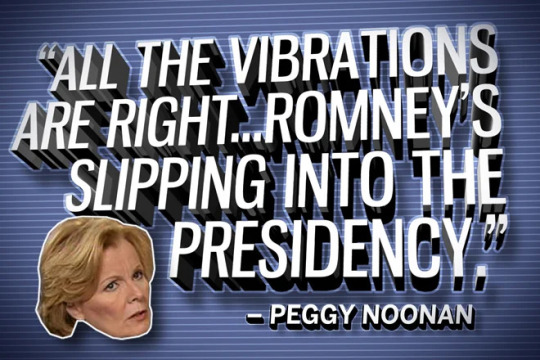
Peggy Noonan: Clueless Political Pundit Claims That House Tea Partiers Represent The Thinking Of Almost Half Of The Country
Posted on March 2, 2015 by Elaine Magliaro
I rarely watch the Sunday morning “nooz” programs these days. One reason is the clueless talking heads that are frequently invited on shows like Meet the Press and Face the Nation to provide Americans with their wisdom and insight. One of those political pundits is Peggy Noonan–or “Our Lady of the Magic Dolphins” as Charles Pierce refers to her. Her cranium appears to be filled with helium–or some gas that is lighter than air. I think the old Pegster would be perfect for the starring role in a movie titled Clueless, The Senior Years.
Long ago in a galaxy far, far away, Noonan was a primary speech writer and Special Assistant to President Ronald Reagan. “Our Lady of the Magic Dolphins” also worked as a speech writer for Vice President George H. W. Bush. According to Wikipedia, Noonan reportedly coined the phrase “a kinder, gentler nation” and popularized “a thousand points of light,” two memorable catchphrases used by Bush 41. Noonan was also said to have written the speech in which Bush promised: “Read my lips: no new taxes” during his 1988 presidential nomination acceptance speech in New Orleans.
I think Simon Maloy pegged Peggy perfectly in an article he wrote for Salon titled Peggy Noonan’s “wisdom”: Build Keystone XL so American boys will become men last November.
Maloy:
Peggy Noonan has one of the most high-profile jobs in American media. She’s a weekly political columnist for the Wall Street Journal, the country’s largest newspaper by circulation, which also hosts her irregularly updated blog. The Sunday shows seek her out when filling the ranks of their weekly pundit panels. She’s among the more influential commentators in American media, and the fact that she inhabits this perch despite being objectively terrible at her job should obliterate whatever faith you have in the concept of meritocracy.
Noonan’s chief failing is one that afflicts many pundits: She generally has no idea what she’s talking about. Her analysis is powered largely by her own warped perception of politics and policy, which she confidently ascribes to the rest of the country. Peggy Noonan always seems to know exactly what “America” is thinking, and this often results in her being hilariously wrong.
I didn’t have a true understanding of the depth of Noonan’s dipshittery until I heard what she said in a panel discussion about the release of torture memos by the Obama Administration when she appeared on ABC News’ This Week With George Stephanopoulos back in 2009.
Marcus Baram (Huffington Post):
On ABC News’ “This Week With George Stephanopoulos,” George Will echoed several Bush officials when he criticized the release of the memos, saying “The problem with transparency is that it’s transparent for the terrorists as well.” Will expressed concern about the cost of letting “the bad guys” know what techniques, such as waterboarding, will be used on them. He went on to add, as noted by HuffPost’s Jason Linkins, that “intelligent people of good will” believe the President of the United States can do whatever he wants to “defend the country.”
Baram said Noonan “went even further, articulating a position that upends George Santayana’s famous quote: ‘Those who fail to learn from history are doomed to repeat it.'” Noonan opined, “Some things in life need to be mysterious. Sometimes you need to just keep walking.” Then she added, “It’s hard for me to look at a great nation issuing these documents and sending them out to the world and thinking, oh, much good will come of that.”
Right, Peggy, better to keep the Bush Administration’s tales of torture “mysterious.” Who would want to know about such things anyway? Just move along…and forget about what our country did.
Peggy Noonan talks the crazy talk of Washington.
Russ Feingold–who was one of the two Senators from Wisconsin at the time–was appalled by Noonan’s comments. Sam Stein wrote about what Feingold had to say about Noonan remarks on Stephanopoulos’s show.
Sam Stein: Later, the Senator took a swipe at some of the rationalizations for avoiding prosecution that have been voiced by Washington lawmakers and pundits.
“If you want to see just how outrageous this is, I refer you to the remarks made by Peggy Noonan this Sunday,” he said, referring to the longtime conservative columnist’s appearance on ABC’s This Week. “I frankly have never heard anything quite as disturbing as her remark that was something to the affect of: ‘well sometimes you just have to move on.'”
More recently, Noonan appeared on on Face the Nation on Sunday. Crooks and Liars had a few words to say about Peggy’s appearance:
Peggy Noonan is once again pulling statistics from the land of her posterior. Here she is on this Sunday’s Face the Nation pretending that these teabaggers, or the House Freedom Caucus, or whatever these extremists are calling themselves these days represent “the thinking of almost half of the country.”
Peggy Noonan So Delusional Even David Gregory Calls Her Out
Peggy Noonan, who served in the Iran - Contra Reagan administration, thinks the IRS scandal is the worst thing ever and goes on Meet the Press to attack Obama over it. However, even David Gregory won't have any of it...
youtube
https://flowersforsocrates.com/2015/03/02/peggy-noonan-clueless-political-pundit-claims-that-house-tea-partiers-represent-the-thinking-of-almost-half-of-the-country/
🤥 👺 🤡 🤥 👺 🤡🤥 👺 🤡🤥 👺 🤡🤥 👺 🤡
👇 😜 👇
Dear Peggy, Your “Scandal” Just Evaporated
http://dish.andrewsullivan.com/2013/06/25/dear-peggy-your-scandal-just-evaporated/
Notice, en passant, that the WSJ is now indistinguishable both in party line and total hysteria from Fox News and talk radio (not that it’s ed-page was anything but extreme, but at least it was smart). Now check out the latest details from the IRS about 501 (c) 4 and 501 (c) 3 entities:
The instructions that Internal Revenue Service officials used to look for applicants seeking tax-exempt status with “Tea Party” and “Patriots” in their titles also included groups whose names included the words “Progressive” and “Occupy,” according to I.R.S. documents released Monday. … One such “be on the lookout” list included medical marijuana groups, organizations that were promoting President Obama’s health care law, and applications that dealt “with disputed territories in the Middle East.” … “Common thread is the word ‘progressive,’ ” a lookout list instructs. “Activities appear to lean toward a new political party. Activities are partisan and appear as anti-Republican.” Groups involved more generally in carrying out the Affordable Care Act were also sent to the I.R.S. for “secondary screening.” And “occupied territory advocacy” seemed subject to the most scrutiny of all.
So we begin to see the actual truth (and where it usually is, Page A14): the IRS was rightly scrutinizing a whole slew of new groups claiming to be all about “social welfare” and checking to see how politicized they were – on both sides.
Most of those on the progressive side were seeking 501(c)3s – not 501(c)4s – so the parallel isn’t exact. But it sure suggests nothing of any malign nature here. Par exemple:
Ameinu, which on its website calls itself a “community of progressive Jews,” received its 501(c)(3) tax-exempt status on May 28 — five years after applying. IRS agents peppered the group with 18-page surveys and lingered for months without follow-up, Hiam Simon, national director of Ameinu, said in a telephone interview. He said he was looking at a 4-inch thick folder of Ameinu’s communications with the IRS. “I think they were painting with a broad brush, with worries about Middle East ties to terrorism,” he said of the IRS. “I don’t think it was caused by malice. Ignorance is too strong a word, too. They simply weren’t nuanced enough or careful enough.”
1 note
·
View note
Video
youtube
‘Parasite’ shows the ugliness of Koreans dealing with their hierarchical society in very high detail. Unlike many other interpretations I’ve seen, I will not deal with the details and the mise en scene, but the overall story, characters and their roles. The details are stunning, but I don’t think that’s an excuse to look away from the main story to focus on the little things. Also, there are two dimensions from a macro and meso point of view that I think are more relevant than finding hidden foreshadows or symbols.
Please note that I am Korean and know enough about Korea to point out the flaws of our society and people, including myself. I know very well that Koreans hate being criticized (just as Gitaek shows signs of anger when Mr. Park points out that he has an weird smell), but the truth is the truth and nothing will improve if we cannot see ourselves objectively. So if you’re pissed at my interpretation because you are a proud Korean, think again about what good pride will do.
The Hierarchical Society
Hierarchy has always been part of Korean culture. But as the movie shows, hierarchy is not based on traditional values anymore but overridden completely by economic status. You can see this in the scene where the young pizza box collector speaks down to the Kims. Traditionally, speaking in this manner to people who are even a year older would be considered absolutely unacceptable. This scene sets the stage as a society where economic values have become the new standard for hierarchy. In reality, money justifies everything in Korea and I’m sure it’s the same in a lot of places around the world. Basic ethics and philosophy is forgotten, or something only the naïve remembers anymore.
Although the Parks have higher economic status, a number of scenes demonstrate that in essence, they are also just human beings and have the same flaws as anyone else. Mr. Park and Yeon-gyo uses Gijeong’s underwear as prop during their role-play intercourse on the couch after criticizing the former driver for indecency and accusing him of drug abuse without any evidence whatsoever. Although the Parks are respectful towards the Kims, they still smell the difference. This is another trait of the Korean middle class. While they act like decent people in general, deep down, they still consider the Parks different. Koreans know very well that this is not a trait of the upper class, but more a trait of the middle class. We like to think that we are different from those that are of lower class in our hierarchy. We may act like we respect others, but deep down, the concept of hierarchy prevails. Even today, when two Koreans meet for the first time, questions go back and forth to subtly reveal the status in hierarchy of the two people. Sometimes this is age, sometimes social status and sometimes economic status, but we always establish the hierarchy. When a difference in status is found, the language that we use suddenly changes. The higher class can speak down and the lower class has to speak the polite version of Korean and show respect in almost every word, gesture and even posture.
Another fascinating feature of Koreans and our hierarchical society that also appears in Parasite is the fact that rather than the middle class cooperating with each other to make their lives better, individuals try to move up to the higher class by stepping on their fellow middle class people. The goal is always to make our own lives better by being better than others rather than making everything better. Choongsook demonstrates this when she finds out that Moon-gwang has been hiding her husband in the cellar. Immediately, Choongsook decides to side with the higher class family and fails to see that Moon-gwang’s family and her own would benefit from a partnership. An example in reality? Although most Koreans get outraged when owners of Korean conglomerates or their family members mistreat and deceive the public, most Koreans would do anything to get a job at Samsung, LG or Korean Air. No matter how inhumanely the upper class treats the lower classes, people will jump at any chance to join the higher class and look down on those that are considered lower once they get there, regardless of how many ethical or philosophical values they have to give up.
The dominance of competition in the Korean mentality is emphasized by the fact that both the Kims and the Parks had gone bankrupt from trying to run a franchise store of a ‘Taiwanese Castella’ chain. Even though the Kims hear that Moon-gwang’s family had gone through the same financial difficulties for the same reason, they fail to feel sympathy and only think about competing with those that can be considered their closest fellows. Sadly, another common characteristic among Koreans.
The Absence Of A Middle Class Family
The middle class is the essence of capitalism. The large portion of middle class sets the norm in most modern societies and creates a barrier for the upper class preventing upheavals from inequality. But there is not middle class character in the movie that influences the plot. It’s hard to see this as accidental and for me it was the single most impressive aspect of the plot.
I have two explanations for this absence of the majority. First is that in a strictly hierarchical society, nobody feels like the middle class. Apart from very close friends, everyone else is either in a higher class or a lower class than myself. In one on one interaction with other I’m either the upper class or the lower class. When two Koreans meet for the first time, we ask questions that can lead to answers which give clues to who is higher in the hierarchy. Usually age, social status or financial status is asked indirectly to establish the hierarchy. Once it is established, it dictates the language, gestures and even postures of the two people. Even if one person is a couple of months older than the other, the hierarchy unfolds.
Another reason I think the middle class was left out was because the majority of the audience would be middle class Koreans and Koreans are terrible at taking criticism. If the plot had a middle class family, most of the audience would related themselves to that family. And if the movie showed any criticism towards them, it would instantly become personal to the audience and Bong would have had a hard time both financially and reputation wise.
The Deranged Husband
Moon-gwang’s husband acts like a crazy person and shows unconditional respect towards Mr. Park, who doesn’t even know that Moon-gwang’s husband exists. But is this really that weird for Koreans? Most Koreans work for tycoons that brainwash their employees to show unconditional obedience while not even knowing their names. We arrive at our desks before our superiors do and leave after our superiors leave even if we have nothing to do at our desks and have to kill time watching Youtube videos. Can we really say that Moon-gwang’s husband is that much different from the average Korean? And just like Moon-gwang’s husband, the middle class does nothing about being forced to show fake respect everyday. We actually encourage it by investing years of studies to pass the company employment exams. Yes. Korean companies have exams because there are so many people trying to become employees. One of them is called SSAT. Guess what the first ‘S’ stands for?
Moon-gwang goes on further by impersonating the North Korean national news caster. The North Korean news caster is a symbol of manipulation and oppression for South Koreans. Are South Koreans really in the position to think that North Korea has extreme issues and we are free from oppression and manipulation?
The Hero
Like in reality, there are always exceptions. The exception in this movie? Gitaek. Gitaek is the only character in the movie that acts against the hierarchical system for values that are innate to humans. As a result, he is forced down into the cellar that Moon-gwang’s deranged husband once lived. This also directly reflects the Korean society where being different is unacceptable. Maybe reality is not as severe as in the movie, but going against popular sentiment brings similar consequences. I remember growing up, people who would had tanned skin were called ‘tanning jok,’ meaning ‘tanning tribe.’ During the cryptocurrency boom, people traded cryptocurrency were called ‘coin choong,’ meaning ‘coin vermin’. Such framing isolates people who show any difference from the majority, regardless of whether the difference is positive or negative. Of course, heroes, who act against the wrong when others don’t, are also often isolated by the majority. Gitaek, the hero of the lower class who couldn’t stay put when Mr. Park showed no concern for other people’s lives than that of his son, ends up in the place where a deranged man once lived. The peer pressure to act the same way that others do in Korea is so strong that they can no longer tell the difference between a deranged person and a hero but can only regard them as misfits.
Socially Acceptable Deception
Although the title ‘Parasite’ has a negative vibe, it must be noted that no character in the film ever shows signs of excessive greed or bad intentions. People might debate that the Kims were greedy, but in reality, lying and pretending is everyday life for average Koreans. It is especially considered acceptable when it’s done for profit. Hell, it’s usually considered clever and smart. You’d get a pat on the back if you were working in Korean company and you showed better performance by deceiving others. The lies can be justified further in the movie considering that the Kims were desperate in terms of finances and they had to deceive in order to survive. Giwoo shows no signs of remorse about deceiving the Parks and justifies his lies by saying that he will enter university once he gets his funds together. Things a lot worse than small lies are justified everyday in reality and this is hardly considered a problem among people that have not been educated properly in ethics or philosophy. Do it long enough, and it becomes a way of life.
When Philosophers Are Considered Failures
There are a lot of interpretations about the rock and what it symbolizes. Overall, the rock was the boundary between cleverness and wisdom. Kiwoo, who had the strongest ties to the rock, was no doubt an intelligent character. He was clever enough to deceive the Parks and actually demonstrated knowledge about teaching high school students. But his obsession over the rock implies the boundaries of his intelligence. The power of the rock is a myth and the rock came to Kiwoo with his new job as a tutor. The reason Kiwoo’s friend came over at the beginning of the movie, was to offer him a job. While doing so, he brought the rock as a gift. But as the story progresses, Kiwoo goes on to believe that the rock brought him the new job and good fortune to the whole family. Such myths are still common in Korean culture and often lead to irrational decisions though not as extreme as the case in the movie. A lot of Koreans still read interpretations about dreams everyday and visit fortune tellers before big events such as marriage, buying an apartment, moving jobs etc. The rock is the hope and last resort that Giwoo chose without any logical reasoning.
When Giwoo first meets Dahye, he captures both Dahye and Yeon-gyo’s attention by saying “I don’t care whether the answer to question 24 is right or wrong. In reality, it’s the attitude that’s important.” It’s a great motivational speech, but at the same time, it shows that Giwoo is focused more on handling situations than the basic truth behind the situations.
The study that focuses on the latent truth is philosophy. In Korea, majoring in philosophy is considered a huge failure. Even if you study philosophy in the most prestigious Seoul National University, people laugh and your degree is a mockery. Giwoo’s attachment to the rock, his short term plans and failure to tend to the truth mimics such aspect of Koreans. Without philosophy, we focus on the wrong things. We live in cramped apartments that cost close to a million U.S. dollars and buy exotic cars to show off. A lot of us focus on the top portion of Maslow’s triangle while sacrificing the bottom portions. In other words, we make our lives better by creating fundamental problems. It’s not just Giwoo.
Mr. Park’s ‘Line’
Mr. Park complains about Gitaek’s smell, but he doesn’t fire him for the fact that Gitaek doesn’t cross the ‘line’ that is so important to Mr. Park. From the moment Mr. Park mentions the ‘line’, the line becomes a big deal not only for Mr. Park, but also for the audience as this line has the potential of becoming the tipping point of a major conflict among characters. This mysterious line becomes so important that the audience forget about the basic moral values or philosophical lines of human society and only focus on trying to understand Mr. Park’s line and whether Gitaek crosses it or not. Ironically, it is Mr. Park that crosses the more important line of basic human ethics at the climax of the story. He reveals that he has no respect for human life other than that of his own family when faced with dramatic situations in reality. In spite of having two people in his garden with critical stab wounds, Mr. Park is only worried about his son who had passed out and manages to show disgust towards Moon-gwang’s husband’s smell rather than being worried about his life. Finally it is Gitaek that snaps, not Mr. Park.
“Your Plan Can’t Fail If You Have No Plan”
This is the life philosophy of Gitaek. I’ve seen reviews saying that this is the basic mentality of losers in society. But is it? How many middle class Koreans have made plans themselves that actually worked out? We show hatred towards the owners of Samsung, Hyundai and all those Jaebols, but most of the middle class try so hard to work for them and become a part of their establishments. Was that the plan so many middle class people had that worked out so well? How many Koreans you know currently work at their dream jobs? Gitaeks philosophy isn’t a sign of his inability. It’s his observation of life as a lower class citizen in a hierarchical society. When absolute powers above us make all of the decisions, your plans often get swept away and you are forced to adapt to whatever those higher class people have in store. In other words, Gitaek knows that ‘plans’ of the powerless are merely dreams in a hierarchical society.
Throughout the movie we laugh at the ridiculous plans that Giwoo makes. But in the end, he comes up with a plan to save his father that makes more sense. But how do we feel about that one? It feels closer to a dream than a plan. This is what plans of the powerless look like. Either short sighted plots or unattainable dreams.
So Who Is The Parasite?
Everyone and no one. All three families leech on another family. Moon-gwang and her husband had been leeching on the Parks while traumatizing Dasong. The Kims leeched on anyone with money. And the Parks leeched on the lower class. Despite the whole family working for the Parks, the Kims couldn’t even afford a motel when their underground apartment got flooded. Moon-gwang and her husband couldn’t afford a home either and had debt problems.
More importantly, both the Kims and the Parks scattered like cockroaches when the light switched on and people appeared. The Kims scattered from the Parks’ house when the Parks returned early from their failed camping trip. The Parks and their wealthy friends scattered when the true face of the capitalist hierarchical society appeared in their garden. The Parks had also been hiding in their dens while leeching on the lower class and accumulating wealth. But when the consequences unfold and real people of the society appear, all they can do is run.
When Koreans get tired of these conflicts among one another, we use the term ‘Hell Chosun.’ It’s a word that represents how Koreans leech and step on one another to get ahead of any and all kind of competition. Maybe this is the real parasite in our minds. It eats away at our rational minds and guides us towards irrational decisions. In the end, Mr. Park, Moon-gwang, her husband and Gijung lose their lives, Giwoo gets impaired and Gitaek has to live like an actual cockroach.
I’m sure there are other interpretations that have different views. I especially found the detail oriented explanations very interesting since by myself, I tend to focus harder on the forest rather than the trees. It would be fascinating to see how people from other cultures interpret the movie as well and whether other hierarchical societies have the same problems. Let me know what you think of my perspective and I hope I’ll soon come across another movie that I can’t resist writing about.
#parasite explained#parasite interpretation#korean movie#parasite#bong joon-ho#movie review#review#기생충#기생충해석#korean#한국사회#대한민국#수직사회#korea#한국#한국영화#자본주의#유교사상#봉준호#유교문화#hierarchy#hierarchical society
95 notes
·
View notes
Text
THE POSITIVE & NEGATIVE; Mun & Muse - Meme.


fill out & repost ♥ This meme definitely favors canons more, but I hope OC’s still can make it somehow work with their own lore, and lil’ fandom of friends & mutuals. Multi-Muses pick the muse you are the most invested in atm.
My muse is: canon / oc / au / canon-divergent ( potentially ) / fandomless
Is your character popular in the fandom? YES / NO.
Is your character considered hot™ in the fandom? YES / NO / IDK.
Is your character considered strong in the fandom? YES / NO / IDK. (apparently there are youtube comments circulating about how boring or weak aerith is. if an explanation needs be provided for how strong of a woman, character, and fighter she is in her own regard then the point of the character is missed entirely.)
Are they underrated? YES / NO.
Were they relevant to the main story? YES / NO.
Were they relevant to the main character? YES / NO / THEY’RE THE PROTAG.
Are they widely known in their world? YES / NO. (the big baddies know of her, the little baddies know to look for her and the heroes just learned of why she’s important).
How’s their reputation? GOOD / BAD / NEUTRAL.
How strictly do you follow canon?
it depends entirely on the person / character i’m writing and what verse they’re in. when someone approaches me and doesn’t specify a verse i give them main verse (ff7r) and follow canon as closely as i’d like. but most of my threads diverge from canon for exploration or other purposes. i’m not concerned with how close to canon my aerith is ------obviously i’d like people to hear her voice when i have her speak, or see her performing the actions i have her commit to but i’d also like this interpretation to be my own. so when someone reads a piece of my writing they say oh yes, that’s kay’s aerith definitely.
SELL YOUR MUSE! Aka try to list everything, which makes your muse interesting in your opinion to make them spicy for your mutual.
i could make an entire post about all of the things i love about aerith gainsborough on its own, so i’ll try not to let this be too rambly.
she is such a three-dimensional character and she always has been. people expect just to meet the damsel in distress, to rely on cloud and company to help her out at every twist and turn. square even did a good job selling her appearance: soft pinks, gentle features, and when she was given a voice actor the first few times they always went the route of someone who had a lighter lilt. to the first glance she is very much all of those things. except it’s not all she is.
aerith wears masks to cover the horrendous things that happened to her as a child: experimentation, the shocking loss of her mother after escaping it, crushing loneliness, an awareness that she was different and nobody around who understood the properties of that difference to explain it to her in a way that didn’t terrify her. she heard the planet, could tell when people passed away and rejoined the lifestream, surrounded by all of these voices yet so fucking alone. and did she let it make her bitter? did she become angry or cold, jaded or cruel? no. aerith is kind and giving without being too self-sacrificing and without making her boring. she’s not as innocent as people are made to believe.
look at her first interactions with cloud. she flirts mercilessly with him, and then you discover she did it to zack, too. she’s not afraid to express herself in any fashion and she’s unapologetic about how forward and positive she is. despite all of the shitty things that happened to her, she’s still all of these great things. she’s scrappy, she can be a brat (ask the turks!) and she blooms under the cover of oppression that she lives. sure, she’s in a beautiful house with a loving mother figure but she’s in the slums and she’s being watched constantly by some part of the company that wants to see her dissected or worse.
and she’s divine. no, literally. of course it takes her death for the realization of that divinity to really be understood by the fan base and even by her own party, but once aerith dies she becomes an actual deity. it’s sad that you don’t get her in your party any more but it’s obvious how much she affected everyone she worked with (and even those she didn’t). they spend the rest of the game avenging her, they spend the rest of the game explaining their grief over her loss, promising her death won’t be in vain. and once that’s done? there’s an entire movie where cloud deals with his grief over everything, but mainly his self-appointed guilt over her death. as if he could have changed it? i mentioned to @seraphicwiing in a conversation (an au one) about sephiroth and aerith ------he didn’t kill or break her. he gifted her divinity.
so this sweet flower girl goes from a first appearance damsel in distress to an actual conduit of the planet, watching over her friends and everyone else from the spiritual plane of it. controlling the lifestream itself to rise up and crush back meteor.
if you don’t like her by this point, it’s a lost cause. honestly, just go play pacman or something.
Now the OPPOSITE, list everything why your muse could not be so interesting (even if you may not agree, what does the fandom perhaps think?).
maybe strong female leads aren’t your cup of tea? perhaps you really wanted aerith to maintain her softness and have none of the bite or edge that i argue make her interesting?
some people want a strong woman to be something like paine in ffx-2, or lightning in ffxiii, or even lulu in ffx itself ... dark and perhaps a bit brooding, angry with someone or something. they can be gentle but they’re mostly a razor sharp edge threatening to slice anyone who tries to get close to them. aerith is arguably a hot take on the stronger female leads ... even compared to tifa. you don’t doubt that a woman who fights with her fists is a tough, bad bitch ... but aerith isn’t physically strong. she’s the image of a princess honestly and that’s just not what some people want to see or deal with.
arguably her personality can come off a bit strong. she’s snarky and, as i said, a tease. she can be bratty from time to time and that can absolutely be read as irritating, especially to someone whose looking for negative personality traits to focus on at a first glance.
and a lot of people just see her as a love interest to cloud. and she is, i won’t deny that. it’s been further addressed in the remake with her dream sequence that cloud absolutely has feelings for her. it dredges up the age-old argument from 1997 of: tifa or aerith. why does it have to be or? why can’t he love them both in different ways? or the same way? it’s not like aerith has a lot of time to be the love interest, anyway. we all know how disc 1 ended, by this point.
perhaps people see her end-game divinity as a deus-ex mechanic. sure, it kind of it. but the game never hid its intentions of why aerith was there. she was always special, we just didn’t know how. she always had holy, we just didn’t know what it meant at the time. but it does seem a bit convenient that right as the meteor is going to crush midgar ------here comes the lifestream, holding it back so holy can stop it! wow, amazing! darn that aerith and her connection to the planet. how awful. maybe cloud could have just braver’d it.
What inspired you to rp your muse?
i love her. it’s just that simple. she’s so complex and so different from other characters i tend to gravitate toward. she has a darkness but she’s good, genuinely. i usually go for people who are deeply seeded in some kind of trauma, or are just generally a piece of shit. and aerith certainly has her trauma, but she’s risen above it. she chooses to live her life as much as she can before the ultimate doom clock ticks to 0, you know?
i admire her beauty. not just her physical beauty (and she is), but the beauty of her as a person. i wish i could be as endlessly positive as she is, even faced against such awful odds. i wish i could be the kind of person who surrounds themselves with people who love them, despite their flaws. but i am very much the opposite of aerith.
i consider myself endlessly lucky to be a mouthpiece of some kind of version of her. this is a character i’ve had a connection to since i was like, 7 or 9 (and i’m 30 now). the very fact that i get to log in every day and express some form of this wonderful character keeps me connected to her. she has a loud voice in my head, and i think she always had. i think that remake just re-lit the flame for her.
i wrote her a long time ago, during myspace rp days. but we all know how myspace ended. so i choose to write her now because it feels right. and i really do enjoy having someone who shines so brightly in my head.
What keeps your inspiration going?
the same as everyone else, i think: music, clips of the character, art of her ... but mostly? my writing partners. i wouldn’t be anywhere without the people in this site who come to me every day with an interest in my interpretation of aerith. i never expected so many lovely humans to want to see what i can do with her. but i have people dm’ing me on discord every day with ideas or thoughts, with musings or what-if’s ... and it really just keeps this muse so alive for me.
even though i have a backlog of drafts and inbox things to answer, i can know that they will get done ... it’s just up to me as a human to write things out.

Some more personal questions for the mun.
Give your mutuals some insight about the way you are in some matters, which could lead them to get more comfortable with you or perhaps not.
Do you think you give your character justice? YES / NO.
Do you frequently write headcanons? YES / NO.
Do you sometimes write drabbles? YES / NO. (i’d prefer to write out a reply to a solo drabble).
Do you think a lot about your Muse during the day? YES / NO.
Are you confident in your portrayal? YES / NO.
Are you confident in your writing? YES / NO.
Are you a sensitive person? YES / NO.
Do you accept criticism well about your portrayal?
in the proper context. i don’t want someone coming on here and telling me i play aerith wrong because it’s not what she would do canon. that’s cool, i don’t write her strictly canon. but if i’m having doubts and i ask for the feedback, i’m open to it.
Do you like questions, which help you explore your character?
always. i am 100% always accepting development questions.
If someone disagrees to a headcanon of yours, do you want to know why?
nope. i don’t care if you agree with my headcanons or not. i’m sure there are people who don’t like that i have a ship with a sephiroth, or a reeve, or that i’ve had her mess around with rufus or biggs. i’m sure there are people who despise the way i make her speak to people ... and that’s fine. they’re allowed to. but this is my interpretation of aerith and so far i’m loving everything that i’ve gotten to do with her. especially those things that include character building with others.
If someone disagrees with your portrayal, how would you take it?
they’re allowed to disagree. they’re also not beholden to follow me. i won’t be upset if they unfollow me. it’s their comfort, after all. and i’d rather spend time on here enjoying myself than either having someone voice their dislike of my interpretation or get vocal about how they’re uncomfortable.
If someone really hates your character, how do you take it?
people have really hated aerith since 1997. they’re allowed to have their silly opinions of her. and i’m allowed not to entertain them.
Are you okay with people pointing out your grammatical errors?
please do. i’m human and i make mistakes. i’d love to fix them.
Do you think you are easy going as a mun?
yes, but i’ve had people mention that i seem a little unapproachable. please approach me. if you want to write with me let me know. if you want to chat ooc with me talk to me. i promise i’m an absolute dimwit on my side of the screen. i’m spacy but i try to be as nice and welcoming as possible. somehow i’ve conned a few friends out of this rpc already with my idiocy, so please please please come chat with me.
That’s about it, congrats for filling out!
#❀ ﹙ about ﹚ « poetry bleeds from ivory bones like sweet syrup »#❀ ﹙ ooc ﹚ « what did you say? »#❀ ﹙ mun ﹚ « aaaaaaaaaaaa »
6 notes
·
View notes
Text
A moment to chat about “The Butterfinger Effect” (obv spoilers for S4e17)
Wow, so a lot of people fucking haaaaaated this episode. And since I’m addicted to That Discourse, I had to say something because I think they’re super wrong. (And this isn’t me just being a total Camp Camp fangirl here; like, the pee episode was bad. That was bad tv and bad for all the senses. There have been mediocre and even shitty episodes of this show; this just wasn’t one of them.)
There are a couple different points of criticism aimed at this episode, and while there’s one I’d like to take a deep dive into in particular I might as well take some shots at the others real fast:
The moral was too obvious: god, you guys whine all day and night that you wanna see Max show character growth and whenever he displays it you hate how it’s done. This show has never been one for subtlety. I mean, the climate change ep? This is how the show works; it’s part of its twisted-Saturday-morning-cartoons charm, it’s the most efficient way to get a point across in a short runtime, and it was the set up for the joke at the end of the episode.
It didn’t advance the plot: bitch what plot are you talking about???
Not enough dad//vid: listen I’ve made my thoughts about the fandom’s idea of dad//vid incredibly clear at this point, so let’s just:
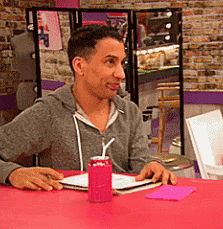
The most common argument, though, is that it’s all so very “unrealistic” and “out of character.”
Considering the show’s concept of “realistic” involves squirrel armies (hey, another mediocre episode! See, I can call them when I see them) and a universe-destroying space octopus, I’m not sure how to rebut that without another Bianca del Rio gif. So, the out-of-character accusation.
Listen, characterization is hard as balls. Everyone fucks it up sometimes, and not every characterization in every episode is gonna work for you.
But you know who nailed it this time? Eddy Goddamn Rivas, the writer for this episode, that’s who.
In fact, I’d argue that the entire point of the episode is that it’s not Space/Race Kid’s new interest that caused the majority of the changes, or some sort of mystical “butterfly/finger effect,” but Nurf’s attempt to put things back to “normal.” He caused the thing he was trying to prevent -- which happens to dovetail perfectly with the moral of accepting change and not letting it freak you out.
This episode is brilliant, and plays with the canon characterizations of all our campers while staying true to them, and I’m gonna show you how.
Under a cut, because not everyone has time for that shit. But first, a juicy preview of the sexy discourse to come:
Space Kid
This one is the easiest to defend, because Space Kid is just . . . Race Kid. Aside from maybe having an idea that he’s cooler than he used to believe he was -- which makes sense, because why do people buy fancy sports cars except that they think it makes them look cool? -- we’ve seen his tendency to latch onto an interest and go 110%.
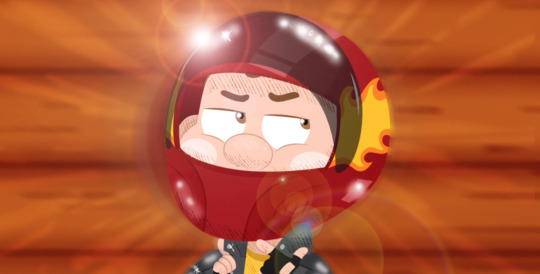
Reasonable, hilarious, and adorable. I actually don’t think anyone has any problem with Race Kid, so this is a quickie.
As for why he dropped it so fast: I mean, hasn’t everyone gotten really into something before deciding it wasn’t as fun as an old hyperfixation? I’ve been coming back to the Camp Camp well since 2016 because it’s just so much fun.
Nurf
Nurf is the one I think people are sleeping on. All the time, always, but especially in this episode. The summary hints that Max is the one unable to handle the idea of change -- something this entire season has been working towards, and I literally just realized change has been a thematic thread throughout several of the episodes and that’s really cool -- but it’s actually Nurf who can’t stand the thought of things being different.
And, in trying to prevent the “butterfinger effect,” he sets it in motion. The irony is delicious, and his head in a fishbowl makes me laugh every goddamn time.
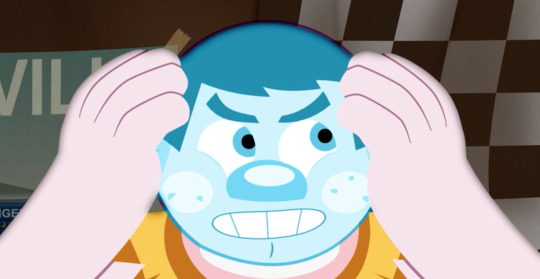
(Also, “A battle of wits is not my strong suit” was just hysterical. Nurf is full of great lines and y’all need to stop ignoring what a comedic goldmine this kid is.)
Preston
Oh, I’m sorry, are we shocked that Preston would jump at the chance to be admired by people, even if it means doing something he doesn’t particularly enjoy?
Were we all in comas during the episode this very season that was literally only about this exact thing?
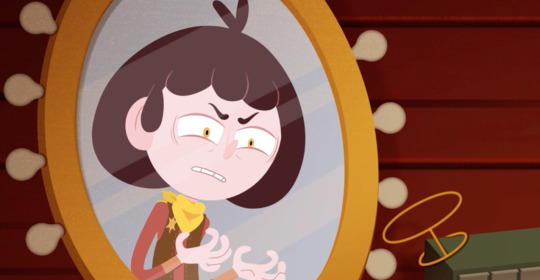
As to why he’d pick football: he’s a theater kid addicted to the corniest, most cliche tropes. When he got a taste of power by bullying Nurf -- which was also totally in character, because honestly, Preston is not a very nice kid -- of course he went to the thing that in every 80s teen movie meant “cool bully who’s super popular”: the sports jock.
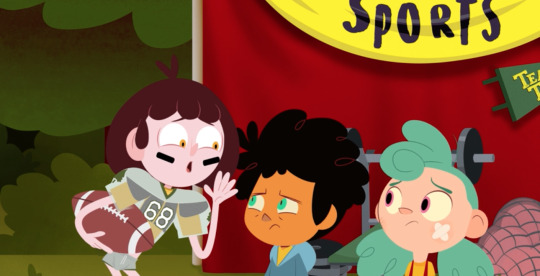
Add to that getting positive recognition from Campbell -- who we’ll get to -- and this swap is totally in-character, and entirely kicked off by the power rush he got from finally getting to be the one who bullies instead of being bullied.
Nurf created his own worst nightmare by being afraid of change. This episode is fucking brilliant.
Harrison
To nobody’s surprise, Harrison is a sadist who thinks he’s hot shit.
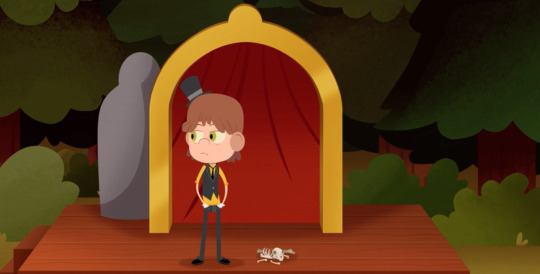
He’s emotionally traumatized Neil to win an argument, he’s made Max vomit up, just, like, so many things and shown zero remorse, and got an unflappable sense of self-worth that skates right off the edge into total egotism.
These are the things we love about him. (And yes, obviously his arrogance comes from a deep well of insecurity, but that only exacerbates why he’d absolutely refuse to help Nurf, because it gives him a chance to be better than someone.)
As for why he’d choose to model himself after goth!Max . . .
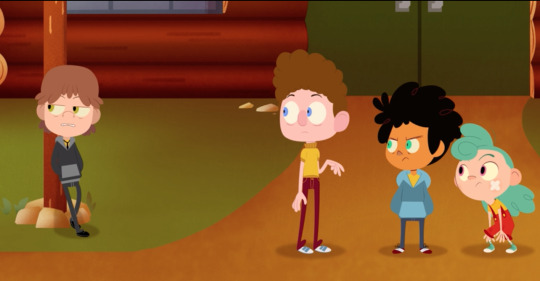
Honestly, this one doesn’t entirely make sense to me. He’s never shown any particular interest in Max. The only thing I can assume is that . . . well, actually Max was right, and at least in Harrison’s eyes, he is at the top of the social hierarchy. And he got there by giving zero fucks about what anyone thinks of him.
Which is what Harrison did, by refusing to help Nurf. We come full circle!
(WAIT: When Max asks why he’s acting like . . . you know, him, Harrison’s response is, “Why? It’s not making you insecure, is it?” While we could take this as “I’m coming for your shtick,” it could also imply that Max’s general Maxyness makes Harrison feel insecure about who he is. Which explains why, as soon as he’s offered a chance to emulate someone who makes him feel insecure, he chooses Max.)
Ered
Nerris and Ered have established themselves as friends, and she at least has expressed a token interest in playing DnD before. She’s listened to Nerris talk about this stuff enough to repeat it at times -- albeit incorrectly -- and so, when there’s “nothing better to do,” she tries something her friend is super into and finds it really fun and embraces it.
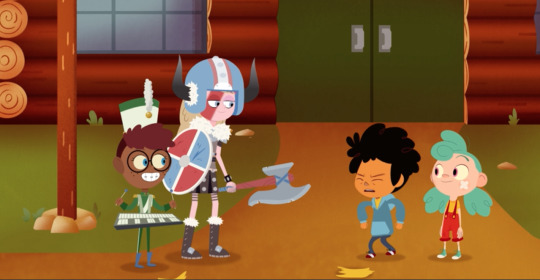
I can attest that DnD totally turns you into a massive, shameless nerd. It’s just that awesome.
Plus, she’s too cool to give a shit if people think she’s being nerdy, so of course she’s not embarrassed about being seen dressed like a Viking; in “Ered Loses Her Cool,” she had that moment of growth where she decided that her coolness comes from her happily choosing to be herself.
Also, she gets to carry an axe around. So like, extra cool points for that.
Nerris
Nerris is gonna grow up to be a band geek, and she’ll especially enjoy the theatricality of marching around in parades while dressed like a Christmas Nutcracker. It’s like being a real-life bard.
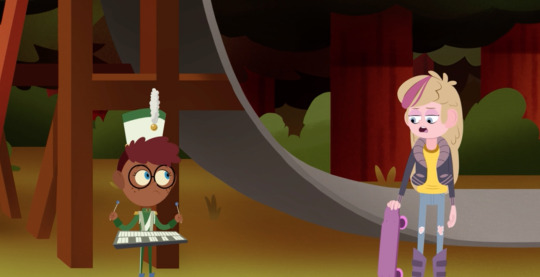
This is the only one that really has a “supernatural” level to its change, except maybe the counselors (yes, I’ve come around on Neil; I’ll defend him at the end). While everyone else can be explained by psychological and in-character reasons, I have no idea what caused her to suddenly have this whole getup. I’d chalk it down to her seeing everyone else trying something new and being interested in upping her LARPing game, except she explicitly says she doesn’t know where it came from.
It’s one of the few that doesn’t make perfect sense, but I don’t really mind it because it’s such a top-tier episode otherwise.
Dolph
This is another one with questionable backing in the rest of the canon. However, I think it works less on a characterization basis than on an archetypical one.
Hear me out: how many artists actually make it professionally? And how many of them end up falling back on something solid and lucrative and artistically unfulfilling to pay the bills? Some people are of course lucky enough to land their dream job, and others are lucky enough to find something close enough to that dream job to make money while still doing something creative and adjacent to their interests (becoming an art teacher, for example).
But in Hollywood, at least, the idea is that you’re either a professional artist who Makes It, a starving artist who’s sacrificing for their dream, or a total corporate sellout who abandons their soul for the sake of profit. A child, especially one with a father so unsupportive of his artistic interests, would only have the Hollywood idea of success to fall back on, which means if Dolph was tying to think of a way to “grow up” and stop wasting his time on being an artist, of course he’d jump straight into the most famously corrupt, artistically soulless type of job possible.
The problem here, of course, is that I don’t know what triggered it; like Nerris, I don’t really see a clear line from motivation to new hobby. However, it works really well at poking fun of the “artist to sellout” pipeline portrayed in popular media, so I certainly can’t be mad at it.
Also, look at these credit scores:
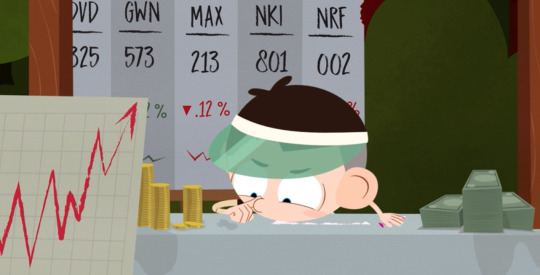
David’s score is either astoundingly good -- 825 out of 850 -- or astoundingly bad -- 325 out of 850 -- depending on what that first number is. Gwen’s credit is pretty bad, which isn’t surprising considering she’s working at Camp Campbell, but I’m still proud of her for being either the second- or third-highest person at the camp.
None of the campers should have credit, so these numbers are just goofy, but I’m as shocked by Nikki’s “exceptional” credit as I am by Nurf’s “literally not on the chart by 298 numbers” rating. Assuming Dolph made at least the campers’ scores up, and we know he’s pretty good friends with Nikki, I assume he gave her a higher score because he likes her, Max’s is trash because their relationship is rocky at best, and Nurf’s is just petty and spiteful because he bullies Dolph, and I just love it.
(I assume Mr. Campbell’s credit is in negative numbers, and QM doesn’t exist on any official records.)
Counselors & Campbell
Campbell, I’m going to argue, makes sense.
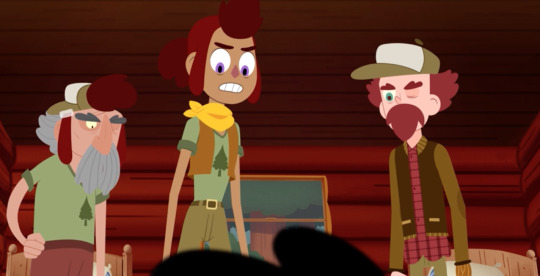
This? Not so much.
I have no idea what Gwen’s talking about -- “I need her showing. We all agreed to it”???? -- and literally none of this makes sense in any understanding of characterization or anything, but my counterpoint would be:
Look how cute Gwen looks dressed up like David.
“Mumble, grumble, aliens!” and something about Mormons in David’s cheery voice adds 5 years to my life.
David’s floof is now beard.
David is wearing plaid.
QM. Just . . . QM.
Did I mention that Gwen looks so fucking good here? I swoon. So hot. Babe. Step on me, mommy.
Anyway. Campbell.
He’s not what you’d call . . . nurturing, by any means, so at first this weird dad!swap is totally out of left field. However, he has proven himself to be . . . well, not a great caretaker, but someone who does put in the effort when he has to, and is surprisingly good at dealing with the kiddos when forced.
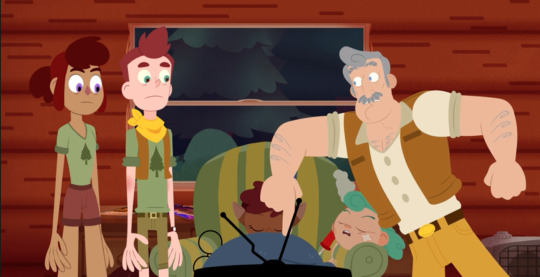
He’s also proven himself to be remarkably introspective, starting back in Season 3. He does to an extent feel bad about what he’s done, and to varying extents wants to make amends for it. So when he starts talking about legacy, and what a man leaves behind --
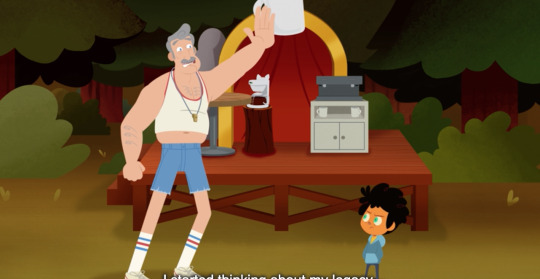
-- I can’t say I’d be all that surprised if he stumbled upon Preston trying to be “cool” with sports camp and decided (probably with the help of whatever supernatural strangeness came over the other counselors) that he wants to have a better impact on this camp than a bunch of broken-down equipment, a pile of debts, and a “son” who’s disappointed in him.
Listen, what I’m trying to say is that I will die defending my Trash Grandpa and there’s nothing you can do to stop me. There’s good in him!!!! I CAN SEE IT!!!!!!!!!!
On a less “Campbell is my dad” note, as a rather stereotypical Manly Man(TM), he’d be best served helping some weedy little brat become more traditionally masculine. i’m saying Campbell was great at football in high school and is in part reliving his glory days, okay?
Nikki
Oh, come on. Nikki’s always shown an interest in science, and particularly in the mayhem it causes. When Neil is out of commission, and she sees that everyone else is doing major hobby swaps -- including Ered, who I believe she still sees as her idol -- why wouldn’t she want to join in on the fun in the most destructive way possible?
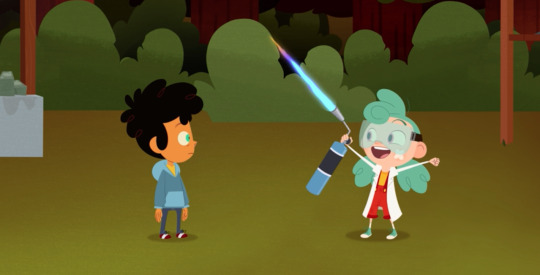
The show didn’t say she was a good scientist, after all.
Neil
Remember when I said I couldn’t defend Neil? WELL SURPRISE BITCHES, TURNS OUT I CAN!
(I didn’t realize it until halfway through writing this post, to be fair.)
But think about it: the boy does not respond well to his mind being freaked. We have observed this.
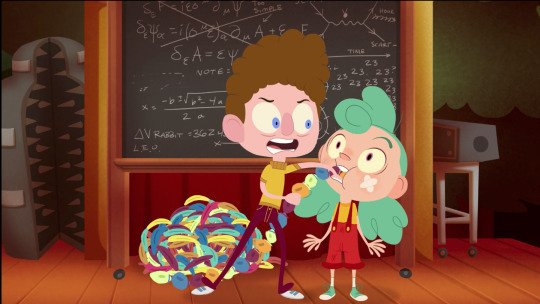
This is not a good reaction to an unsolvable logical problem.
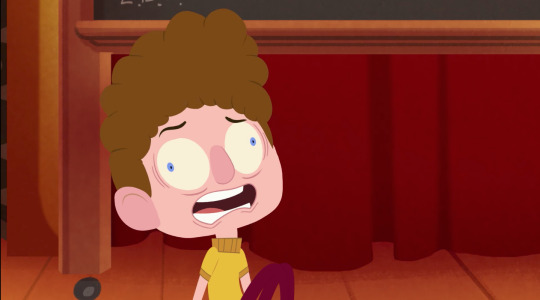
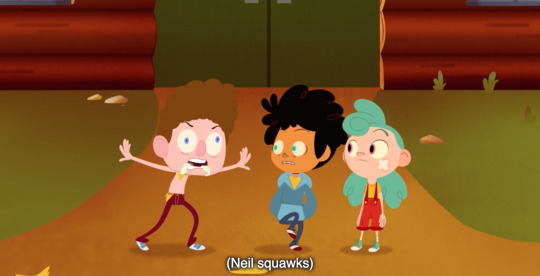
I’m just saying, there’s not a huge difference between these pictures. Neil doesn’t do well when his brain is overloaded with things he doesn’t understand, and everyone around him turning into different people -- which is how it must look from their perspective, even if I can sit here and explain it in ways that make sense at least to me -- broke the poor boy’s brain.
He’s a very fragile ecosystem, our little Neil. You must protect him from thinking too many thinks and getting overheated.
So . . . yeah. This episode is rad, way more of it makes sense in terms of the characters’ motivations than people are giving it credit for, and the ones that don’t make a ton of sense are at least funny and clever enough to be overlooked, at least in this broad’s humble opinion.
#campcamp#camp camp roosterteeth#cc spoilers#no one is gonna read this#i feel like i used to be a bnf at some point#(when there was no competition)#but then i started writing mediocre fics and running my mouth about shit and then people got tired of my bullshit#which you know? fair#but i gotta let it out because i have FEELINGS#and i don't have the outlet of being an english major and writing 20-page papers about my feeling anymore
23 notes
·
View notes
Text
Little Women.

I’ve always wondered what my purpose in life is.
What does it have to do with the things I like? Are we born into this world equipped with passion, interest, talents to fulfill our purpose? Or are we simply lying to ourselves, thinking we might actually have meaning to live?
Faith tells me it’s the first option, but most times my darker side whispers and believes it’s the latter.
I rewatched Little Women last night. I’ve always been fond of the book, as well as the 1994 movie starring Winona Ryder. However, the one I watched last night was the modernized version that premiered last year in 2018.
I’m surprised at just how many Little Women movies there are, seeing that they’re going to be releasing another one this December, and well, where was I going with this? I had a story to tell.
Ah yes.
Little Women.
Out of the four March sisters, Beth has always been my favorite.
Growing up I didn’t really have a specific reason as to why I find her the best sister other than, “She’s so kind, so gentle,” (as I would tell my mama). My mama was more of a Jo fan, she says she sees herself in Jo March one way or another.
This got little Luika thinking, “Which March sister am I most similar to?”
Obviously, it wouldn’t be Beth, no matter how much I hoped I would be. She was basically an angel, and I am not that kind, patient, supportive sister I wish to be if I’m being honest.
I’ve always thought that if Beth was out of the options, then perhaps the best choice would be Meg?
I tried identifying with her in my teenage years in a sense that I too wanted a family, I too wanted to fit in, I too wanted to live a simple life. I wanted to value tradition, home, and everything else that would fit perfectly in our society.
Only to later find out (as I matured and grow and heal) that I couldn’t, I wouldn’t want to live a life like Meg’s.
There’s nothing wrong with it, obviously. It’s a beautiful dream to have a family. It’s a wonderful thing to fit in and be accepted. It’s all good, all valid. I used to think it was all I’ve ever needed and wanted as well, which is why I sided with Meg all those years every time I watched the scene where Jo confronted her about her life choices.
In a way, I still do, the way Jo forced her opinions and values on her sister wasn’t the right thing, but I’ll admit that now I somehow do understand where Jo is coming from.
Could it be because I feel the same way?
I’m a dreamer. There’s no one in my life (if they know me really well) who would say otherwise. I’ve always been, and most probably always be a dreamer.
When I was in the ninth grade, I’ve mapped out my life in the happiest, “quirkiest” way I wished to live. Owning a beautiful house by the beach? Happily married to the love of my life? Living lavishly off my art and writing? Having adorable twins at the age of 26?
Now that I’ve reached 26 years of age, all I could say to myself was, “Dude for real, what were you thinking.”
In short, I felt like current me was in a way criticizing ninth grade me the way Jo did to Meg. But there’s nothing wrong with Meg’s dream (or mine back in ninth grade)! Nothing wrong at all. It just wasn’t my dream, at least not anymore.
The more I grow (mentally and spiritually as well as physically) the more I start to accept myself; my flaws, my thoughts, my feelings, my struggles, my strengths, my faith, and the more I start to become myself.
See, I have this tendency to please people. I’m a people pleaser. It’s not even about making people like me, it’s more about having people not disappointed in me.
As good as this tendency might be in certain times (like when it motivates me to do better in everything I do or putting others first in decisions always) it is just as toxic when I have no control over it.
And so I do believe that ninth grade me, trying so hard to fit in and conform into what my friends, family, and society wants me to be, buried my bigger dreams, because younger me back then had huge plans of saving the world. Literally.
There was a shift in my heart, and even if it sounds fake, I really do still remember the feeling.
As a child, I was imaginative, sensitive, and already overthinking things. You can most definitely confirm this with my mama who noticed this first.
She told me I’ve always been a future-oriented kid, telling her, “When I grow up… Later in the future… A few years from now… Once I’m able to… Older me would…” and all those kinds of talks.
My mama, a person who also loves to talk about the future, saw a little bit of herself in me, but she added, “You were already so idealistic about things. You were a kid. You didn’t need to be, but you were.”
I suppose she referred to where I started talking about changing the world for the better and saving people at a young age.
Not here to praise my “idealistic” and “unique” personality as a child (because I know I’m not alone, there are so many children out there who think this way) but to show that I was born with this kind of personality.
I grew to be an idealist, a dreamer.
Back to discussing the shift in heart and burying my “bigger” dreams.
I thought I just “grew out of it” and began to accept reality, when in truth, I was just adapting and changing myself, accommodating to society.
The need and want to fit in was so strong in me that I remember getting nervous every time my school would make us take personality tests. I tried so hard to score a Sanguine, a type I believed to be popular and well-liked.
But as I was taking the test, halfway through I realized that I can’t lie to myself. This isn’t who I was. I’m not the energetic and sociable Sanguine I wanted to be. Nor am I the strong and confident Choleric I wish I was. I stopped halfway and decided to just be honest. I got an invalid result.
Curious me began to learn more about these personality-related things, and it took me a couple of years to finally settle and accept myself as a Melancholic-Phlegmatic.
Not the most exciting type or combination, I guess, but it’s me.
Now that we’ve established that about my personality, I’ll bring this back to Little Women.
Jo March. I’m not much like her. I’m not assertive, not as brave to speak up my mind, and not confident in myself as she is. I am, however, as passionate and as idealistic as this character . . . and I find myself relating to her a little more than ever.
I came to understand that it’s okay for me to dream big, to feel like I have a different purpose, a different path than what the general public does. It doesn’t make me “special” or “weird” or “unique”. It just makes me, me.
Studying MBTI and personality traits (some psychology in general too) helped me see that no one is the same in any way. Alike, maybe, but never the exact same.
Everyone is different.
Everyone has their own character, their own dreams, goals, struggles, pain, strengths, weaknesses, stories, motives, nature, nurture . . . I can go on and on.
The point is that I think no one should change to fit in. Because sure, we’ll fit in in some cases, but are we ever truly who we are?
My friends who are in the MBTI community online (yes, there is such a thing) have this “joke” where we say, “We live in an extroverted world, where everything is trusted in senses.”
Basically, if you’re an introverted intuitive, you’re screwed. Great.
Some might embrace the weirdness, having a sense of pride being “different” and “unique” and “special”, some others (like me) feel burdened.
Feeling like you don’t truly belong to any social group or even in this world isn’t a pleasant feeling for me personally. Having to shift and change and morph into someone different other than my true self is uncomfortable.
I’m not saying I change a good 180, but I’ll admit I tweak my actions and behavior here and there to adapt to the person I’m with. I’m only ever truly myself when I’m alone. That shouldn’t be the case. My people-pleasing tendency gets the best of me most times.
You shouldn’t change your personality to fit in. Not saying change is bad, in fact, change is very good depending on what your motive is.
So I guess what I’m saying is that if there is change, it shouldn’t be for society, it would be best to change for the better. The better version of ourselves. For ourselves.
Changing for the better is also known as growth, healing.
I’m really trying to do this, taking it one day at a time, finding my purpose in life. Which is it again? Wait, I’m back to square one with the whole life purpose and all.
I guess to summarize:
I feel like I’ve gotten to know myself better through learning about personalities, I’ve accepted the way I am and now learning to better myself to fulfill my life purpose, in which I have always thought to be something else.
I feel like I’m not made to walk down the road most people go, not in the pace society sets for me, but that’s the thing: I shouldn’t.
I should go in the pace God set for me, fulfilling the purpose He has for me, and being my true self that He has created me to be.
Sigh.
This post isn’t even about Little Women anymore. It’s a great book, please read it if you haven’t.
Anyway, yes.
This is just a little rambling, a little journaling for me to sort out some of my thoughts. It may not reach anyone, but I’m glad I did it. I’d love for it to be some sort of help or comfort to anyone reading this, but most importantly it was to me. Healing, growing, taking it one step at a time.
(This post is a mess, but so am I haha)
Lord, let me live my life the way You want it to be. Use me and my life for Your good. Help me change the world even by the littlest things. Amen. Soli Deo Gloria!
See you sometime, maybe. Here’s to all the dreamers. All the love.
2 notes
·
View notes
Text
12 Angry Men: A Product of the Times
Despite what shows like Leave it to Beaver and Father Knows Best would have you believe, the 1950s in America were not a ‘simpler’ time.
The soldiers came home from World War II, the economy expanded, and the nation’s population grew and thrived, all seeming like absolute wins in our nation’s history. The suburbs grew, and the ideal nuclear families began popping up. Everyone dressed to the nines, the War was over, and so was the Depression that preceded it. America was prosperous again.
At the same time, the Korean War began. McCarthyism kicked off a terrified hysteria about the invasion of Communism. Sputnik was launched, the Cold War was off and running, and Americans lived in fear behind their white picket fences. Men went back to work, women went back to the home. Rock and roll was born, and the young people, now called teenagers, started rebelling against the conformity of their parents. Racial tensions began rising. Oppressed people across America began looking to the future for change.
This was the world when 12 Angry Men made its debut in theaters.
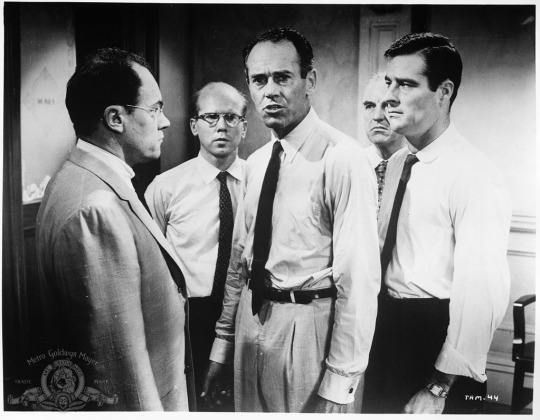
Why am I telling you all of this?
Simple.
In order to truly understand and analyze any work of fiction, we must first contextualize it. To do that, we have to know what the culture was like at the time.
Why?
As I’ve mentioned many times on this blog, no piece of media is an island. Everything we watch, read, or listen to is a direct product of the culture it was created in. The creators were influenced by things around them, be they other pieces of media or simply events and attitudes of the time, and as a result, the film, television show, or book is a reflection of the culture, be it critical of it or embracing of it.
Such is the case with 12 Angry Men.
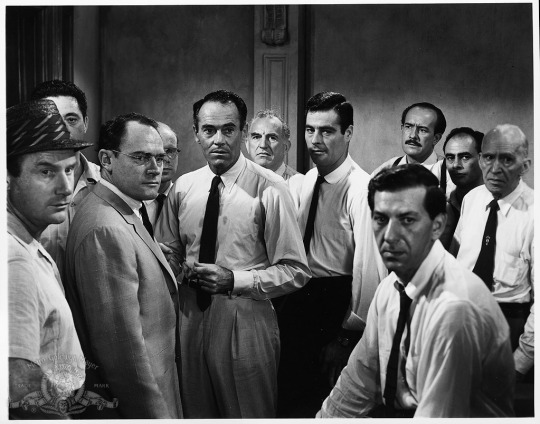
The premise of a jury made up entirely of middle-to-late aged, middle-class white men passing a decision on a Puerto Rican boy from the slums seems, by its very nature, firmly set in the era of the 1950s. The attitudes of multiple jurors seems to emphasize this fact with plenty of prejudice against the defendant for his background, ethnic and otherwise, his age, and even his relationship with his father. 12 Angry Men is definitely a film that is discernibly made in an era that is behind us. To some, that would be enough to seal its doom with the ultimate stamp of disapproval any ‘old’ movie can get: the verdict of ‘Dated’.
As those of us who indulge in older films are more than aware of, sometimes, older movies just don’t hold up quite so well. When that happens, oftentimes the film is referred to as ‘dated’. Oftentimes, the things that people consider ‘outdated’ are things that can’t be helped: slang, clothing, hairstyles, special effects, technology, or even styles of storytelling that were popular at the time of the film’s release.
Therein lies the problem.
By that logic, that definition of the term dated, every single piece of media ever made is ‘dated’ and therefore, nothing is ‘timeless’. This is bad news for every creator of art who desires to make something that will outlast them. If everything is connected to the culture, the times it was created in, then nothing is worth watching outside of the era it was created in. This would lead to many classic films, television shows, and books becoming long-forgotten. Even now, there are many who don’t like watching things made before the date of their birth, claiming they are ‘cringey’ and ‘dated’.
Again, by that definition, they’re right.

Here, though, we have a different definition.
The term ‘dated’, the idea of being directly connected to the era and culture of a piece of media’s creation, is easy to forgive when the ‘datedness’ extends to a mullet, a mixtape, or a money-shot that looks a little cheesy by modern standards. However, that form of dated is not the problem.
‘Dated’ is really only used in a negative context when the movie or show it is describing is not as enjoyable to modern audiences as it was when it was released, suggesting that the passage of time has done more to damage the film than credit it. This definition of the term ‘dated’ exonerates films that have not lost the enjoyability of their core story in the years that have followed.
Being ‘dated’ is far more damaging when it is attached to outdated ideas. It is there that we have our problem.
An outdated idea can damage a film ten times more than any pop-culture reference therein. These are the films based around inherently problematic elements, that never address (and in some cases seem to promote) ideas that we now know are problems. It is this definition of ‘dated’ that we need to apply in order to tell how well 12 Angry Men has held up.
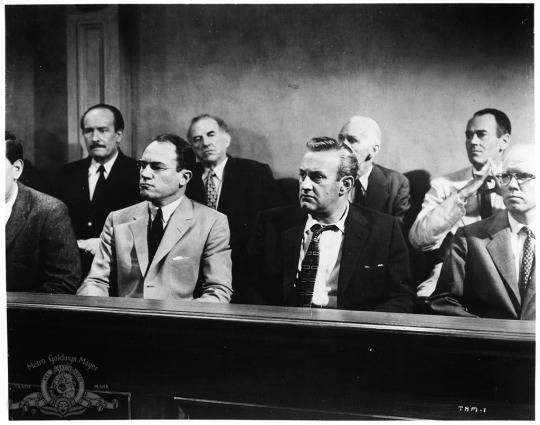
Looking past the clothes and the hair is the glaring problem of the all-white, all-male jury. Definitely an effective reminder that this film was made in the 1950s, for sure, but that could be as much a reminder of the times as it was an effect of them, for as the film tells us, there’s quite a lot of bigotry going on in 1950s America.
The only character in the film who is not explicitly Caucasian is the unnamed defendant, the Puerto Rican boy from the slums. It is his fate in the hands of the twelve men, and unfortunately, to some, his fate doesn’t seem to matter. Juror #10 notably holds the opinion that he is one of ‘them’, displaying superiority and prejudice that cannot be overlooked as ‘harmless’. During his rant on the subject at the end, he is ignored, abandoned, shut down by his fellow jurors, who are more fair-minded. As Juror #9 (Curiously, the oldest of the bunch) points out early in the film:
“Only an ignorant man can believe that…Do you think you were born with a monopoly on the truth?”
An important idea in this film is that of open-mindedness, of fairness to our fellow men. The movie stands as a jarring mirror to some of the bigoted ideas held by many in the 1950s, in more ways than one. While the film definitely has a biting opinion of those who look down on people from other backgrounds (ethnic or otherwise), there’s also an interesting look at the youth of the 1950s in the film.
The defendant is a young man, basically a boy, accused of killing his father after a fight. In the first age of teenage rebellion, Juror #3 speaks the words of parents who feel wronged by their children, while simultaneously carrying the guilt of spurning them to rebellion in the first place. The idea of making your sons into ‘men’ at age nine is treated as being a problem, driving a wedge between both father and son, a possibly irreparable one.
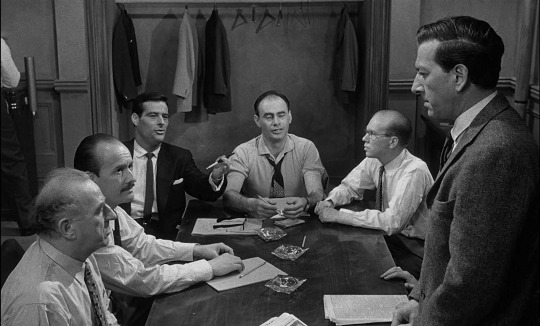
These themes alone would seem to date the film right away, with the heavy emphasis on ideas that were prevalent at the time, if it weren’t for the context with which the ideas are viewed.
Rather than glorify either idea, or present them as being acceptable in the culture, both of these elements are viewed critically by the narrative and the characters within it. The film, while not exonerating the rebellion of the children, acknowledges the part that parents play in it, and outright views racial prejudice with disdain. Not only was this a demonstration of progressive thinking, it’s also still relevant today.
In fact, there isn’t a whole lot about this movie that isn’t relevant today. The idea of ensuring that our justice system works is one that will likely never go out of style, and the critical mirror the film holds up to some of the ideas of 1957 holds up very well in an era where some haven’t moved too far beyond the same thinking. The film, and the ideas it was based around, still resonate with audiences who see it today, managing to leave an impression over sixty years since it’s original release.
On the other hand, there is a total lack of female characters entirely, (hence the title), leading to some remakes to add a female judge (to keep the name) or change it to 12 Angry Jurors or in some cases, 12 Angry Men and Women (In other cases, the title has been changed to 12 Angry Women.) This would seem to be the response directed at the one issue the film never addresses, that is, the lack of female representation. If anything, the lack of it makes the critical reflection all the sharper, the world of the 1950s being dominated by men in general. The absence of female presence is telling, leaving the twelve men as the focus, all with ideas that (for the most part) are familiar with one another, if not shared by each other.
In short?
12 Angry Men loses some of its enjoyability only if one has no concept of our society’s history and current climate. It was relevant in 1957, and it remains relevant today, in a culture not so far removed as we might think. As we continue to progress, 12 Angry Men will stand forever as a landmark and a reminder, no less moving now than it was over sixty years ago.
Thanks so much for reading! Remember the ask box is always open if you have any suggestions, questions, comments, or just want to say hi, and I hope to see you in the next article.
#12 Angry Men#12 Angry Men 1957#1957#50s#Film#Movies#Drama#Crime#PG#Henry Fonda#Lee J. Cobb#Ed Begley#E.G. Marshall#Jack Warden#Jack Klugman#Joseph Sweeney#George Voskovec#John Fiedler#Robert Webber#Edward Binns#Martin Balsam#Sidney Lumet
6 notes
·
View notes
Text
hi heres an essay i wrote on why amy santiago and tina belcher are autistic peace out
“Look at her. She’s so... awkward” (“Sheesh!”): An Analysis of Autistic-Coded Characters in Modern Television
Increasingly through the past few years, there has been a rise in quirky, knowledgeable, awkward and lovable characters in modern television. Sheldon Cooper of The Big Bang Theory fails to recognize social contracts, which consistently earns a laugh from the laugh reel from the studio audience. House of House MD is known as one of the most brilliant physicians in his cinematic universe, while also being one of the least empathetic. Sam of Atypical, one of the only explicitly autistic main characters of any show, is kind and loving, but social cues do not come naturally to him, and he finds penguins easier to read than humans. All of these characters share a common coding as characters in television who fit under the autism spectrum (Bethune).
Very rarely do television shows explicitly state that their characters are autistic, which is a problem in and of itself. However, we may analyze the behaviors, speech patterns, repetitions and actions of characters to read their behavior as neurodiverse. Additionally, the fact that there are very little expressly stated autistic characters in mainstream television makes the analysis all the more needed because autistic people deserve to be represented, and characters that display autistic traits should be confirmed as autistic by the programs that they appear on.
Some have initiated analysis of autistic characters in media and have come to the conclusion that the current representation is not sufficient. Brian Bethune believes that the current representation of autistic characters is too often the “autistic savant”, characterized by having intense knowledge about one subject, relating to the concept of autistic special interests (Bethune). Bethune argues that not all autistic people are savants, and that this trend of savant-autistic characters such as House from House MD and Sheldon Cooper of The Big Bang Theory create unrealistic representations of autism that most autistic people do not fit. Because I wish to understand whether or not the representations of autism in television are accurate, in my analysis, I will read what scholars have observed about traits of autistic people, and compare it to the behaviors of the autistic-coded characters I am analyzing.
Additionally, in 2009, Douwe Draaisma wrote on a similar topic, attempting to gather information on representations of autism in media, including tv shows, newspapers, movies, and otherwise (Draaisma). Her study analyzes many famous portrayals of autism, and agrees with Bethune that the savant portrayal of autism is not effectively in that not all autistic people are savants. Draaisma criticizes that “there are two options for an autistic person: either he is mentally handicapped, an egghead reading geek magazines, or he is a savant with mental powers exceeding those of two Cray supercomputers spinning numbers 24 hours a day.” She feels, however, that since the mid-1900s when representations of autism first began in big media, that the representations have been more accurate and happen more often as time goes on.
Scholars seem to agree that the current representation of autism in media is not sufficient and often problematic, but autistic people deserve to have positive representations of themselves in characters. In order to facilitate a greater understanding of how autistic characters can appear in media, I analyzed two shows that I believe possess autistic-coded characters: Brooklyn Nine-Nine and Bob’s Burgers. The characters I will analyze are Tina Belcher, the pre-teen eldest daughter of the Belcher family, and Amy Santiago, an awkward but brilliant young woman with a passion for detective work in the 99th precinct of Brooklyn’s police force. By analyzing these characters, we can decide the best way to represent autistic traits through popular culture. Preliminary analysis suggests that programs portray autistic-coded characters to be awkward, lacking social skills, possessing special interests, and having unique physical repetitions.
Analyzing Content
The foundation for analyzing Amy Santiago from Brooklyn Nine-Nine and Tina Belcher from Bob’s Burgers is because each show portrays these characters with qualities, mannerisms and quirks that allude to neurodiversity. Because there is a lack of direct representation of characters on the autism spectrum, it is important to analyze codification of characters who display autistic qualities and explore the benefits and disadvantages of these characters as contributing to the overall view of autism in media.
These programs were selected mostly because of their similarity in genre (comedy) and audience size and makeup. Both programs are directed towards roughly the same audience of young adults. Both Bob’s Burgers and Brooklyn Nine-Nine ride the line between television for children and television for adults, as Bob’s Burgers often touches on morbid issues and Brooklyn Nine-Nine jokes about serious crime, but both avoid becoming vulgar nighttime Adult Swim television (like Family Guy, Archer, or Big Mouth). Both programs got their start on Fox television, and Brooklyn Nine-Nine is now on NBC.
Bob’s Burgers has been running since 2011 and is now airing its eighth season on Fox. It has been nominated for the Emmy for Best Animated Series seven times consecutively, and has won twice. TV Guide placed it in the top 60 animated shows of all time (Sands). Brooklyn Nine-Nine also has received commendation, racking up several Emmy nominations and winning several Golden Globes for best comedy television series and best actor in a comedy television series (“Golden”). Both shoes are recognized as masterful pieces of comedic media.
I analyzed “Sheesh! Cab, Bob?”, which is episode 6 of season 1 of Bob’s Burgers, as well as “Tina-Rannosaurus Wrecks,” which is episode 7 of season 3 of Bob’s Burgers. I also analyzed “Thanksgiving”, which is episode 13 of season 1 of Brooklyn Nine-Nine, and “Chasing Amy,” which is the episode 18 of season 4 of Brooklyn Nine-Nine. I choose these episodes because they each display important parts of the character’s personalities, and the plot of each episode revolves around Tina or Amy respectively.
Awkward Behavior/Lack of Social Skills
Scholars who study autistic individuals have found that autistic people often struggle with social cues. Additionally, it has been proven that those with autism may find it harder to make friends, and when they do, it is often based off a shared similar interest. For example, “friendships of.. higher functioning children and adolescents with autism... often focused on common and circumscribed interests with little social interaction involved” (Orsmond). Therefore, those on the spectrum often come off as awkward and lacking in terms of social situations, because the focus is more on special interests than regard for social interaction.
Throughout each show, both Tina and Amy display a clear lack of understanding on how to function well in social situations. Both characters stand out in their programs as the most ‘awkward’ character. Additionally, both characters often avoid eye contact with peers whilst speaking with them, and often make conversation that most would find not socially acceptable.
TINA
Tina stands out as the character in Bob’s Burgers that has the least social skills, as she often appears awkward and unsure of herself. She says odd things to her friends and family and is known to be “weird” by her peers in school. However, she does not feel self-conscious about her weirdness.
In “Sheesh! Cab, Bob?”, Linda wants Tina to know that the family is allowing her to have an “extra-special” birthday party this year, and that Tina can take some time to think about what she wants. Seemingly already prepared, Tina begins to list off what she wants in a rapid, monotone speaking voice:
I’d like it to be a boy-girl party. With mingling. I want to close the restaurant and invite my whole class over. And I want there to be a DJ and dancing and a smoke machine. And about two hours into the party, I want there to be a moment where I see Jimmy Junior across the room. And we’re pulled towards each other. We meet under the disco ball. And we kiss, until our bodies and souls become one. And it’s my first kiss. And it’s perfect, and I remember it forever.
At the conclusion of her monologue, Gene says “scary,” Louise says “freak!” and Linda says “wow! You really put some thought into it!” Bob’s Burgers ensures that the audience understands Tina’s awkwardness in proximity to the rest of her family. If the show displayed just Tina’s monologue without her family’s reactions, then it could be written off as a behavior the writers intended to be comedic. However, inserting the fact that Tina’s little siblings are comfortable calling her both “scary” and a “freak” lets the audience know that Tina’s behavior and speech patterns are perceived within the Bob’s Burgers universe as slightly absurd. While most characters in Bob’s Burgers are unique, Tina’s sometimes overwhelming passioning personality is seen as freakish and scary by her siblings and those around her. Additionally, even without familial context, the audience can understand that Tina’s form of speaking is not exactly normal; her list of birthday party demands is long and sudden, as if Tina is unleashing a wave upon her family. She has clearly thought about it extensively, and it is not what the audience expects.
Additionally, Tina has trouble with some social aspects that seem normal for other characters and people in general. She seems to harbor a lot of anxiety about lying to others. In the episode “Tina-Rannosaurus Wrecks,” Bob lets Tina drive around a nearly-empty parking lot for the first time, despite being 13 years old. Tina is obviously nervous, and panics behind the wheel. She turns the wheel slightly back and forth, groaning out loud as Bob yells and panics, and she hits the only other parked car in the parking lot.
In this instance, Tina has to lie, according to Bob. But this is no easy feat for her, and it changes her demeanor to one that is awkward and painful both for her and for the others around her. Bob tells her, “so we just have to say I was driving, okay?” Tina, a odd, pained look on her face, replies quickly: “but that’s lying! That’s not right!” Bob replies, “that’s true, Tina. Lying is wrong and you should never do it. Unless [the person you hit] makes you go through insurance, which he is. So we have to lie this one time.” Tina is not having it. She is extremely averse to lying. She compares lying with several other crimes: “What’s next? Perjury? Human trafficking?”
Several studies have been done by scholars on the cognitive abilities of developing autistic young adults and children. The findings often cite the fact that autistic individuals have difficulty perceiving what is a lie and what is not, and also have more trouble telling lies (Li). Tina’s ability to lie is extremely limited, and she has trouble throughout the episode when asked to lie by her father. She groans, blurts out obvious fibs, and makes strained faces.

Figure 1. “Tina-Rannosaurus Rex,” Bob’s Burgers. Bob says to Tina, “Let’s see your ‘everything is okay’ face,” but her aversion to lying makes it extremely difficult for her.
AMY
Amy is also a standout character in Brooklyn Nine-Nine for her awkwardness and lack of understanding of social cues. Gina, another character who works in the building with Amy, often comments on Amy’s similarity to a grandma or a toddler in her interests and social abilities.
There are countless episodes in which Amy is shown to have lacking conversational skills. For example, in “Thanksgiving,” the police squad is sitting in Amy’s apartment before Thanksgiving dinner starts, making fun of Amy’s grandmother-esque decorations and waiting for Captain Holt to arrive. The doorbell rings, and Amy answers it with a smile. Captain Holt greets her with his usual work-friendly attitude, saying, “Happy Thanksgiving. Your apartment was very easy to locate.” Amy, physically showing her happiness with a wide smile and open body language, thanks him, saying, “thank you so much. You look beautiful.” Her eyes dart down and to the side, indicating that she recognized that telling Holt he looked beautiful was not an appropriate comment for Holt’s gender or his position of power in their employment.
To ensure that the audience understands the weirdness of Amy’s speech, Jake Peralta, the main protagonist of Brooklyn Nine-Nine and Amy’s love interest, then butts into the conversation: “weirdest conversation ever! Nice work, you two.” Brooklyn Nine-Nine adds in Jake’s perception of Amy’s personality and words to contextualize her conversational skills in proximity to her peers. Both Bob’s Burgers and Brooklyn Nine-Nine include the reaction of other main characters to Tina and Amy’s lacking social skills in order to put the dialogue in perspective.
Obsessions and Special Interests
Scholars studying autistic individuals have established that it is common for those on the spectrum to have a special interest. These special interests are often regarded as “obsessions” from neurotypicals who may not know better. Autism allows those on the spectrum to hyperfocus on a topic or thing, and often, this means that the autistic individual can learn extensively about this topic or thing and become knowledgeable and passionate about it. For example, Rachel Grove studied a group of over 600 autistic adults in the Netherlands, noted whether they had a special interest, and also noted what their special interest was. Sixty-three percent of the sampled autistic adults reported at least one special interest (Grove). Below is a bar graph showing the distribution of the most common special interests by sex.

Figure 2. Special interest topics by sex, observed by Rachel Grove.
By analyzing whether or not Amy Santiago and Tina Belcher display an affinity for special interests, we can decide whether their representation in television as autistic-coded characters is a positive or negative one.
TINA
While Tina is most unique for her awkward personality, she is also recognized for her “obsession” with boys and writing. She writes in her journal extensively, and also writes what she calls “Friend-Fiction” -- a play on “fanfiction” -- stories about her friends, often starring zombies and emphasizes romance.
In “Sheesh!”, Tina sits alone at a table at the back of the restaurant, furiously writing in her diary. Linda engages Bob in conversation about their eldest daughter.
Linda: Tina’s birthday is coming up, and I think we should do something special, since she’s turning 13. This is the year she becomes a woman… Bob, she deserves a special party this year.
Louise: If what it says in her diary is true, then I’d say she needs it. A lot.
Bob: Wait, you read her diary?
Linda: Yeah.
Louise: What I can stomach.
Bob: Why is everyone reading Tina’s diary?
Gene: It’s well written!
Louise: Yeah! She’s better on the page than in person.
There is a lot to unpack from this singular conversation, mostly involving the speech of Tina’s family. For context, both Gene and Louise are younger than Tina. Tina is turning 13, Gene is 11, and Louise is 9 years old. Her siblings are younger than her, yet they feel extremely comfortable invading Tina’s personal spaces and reading her diary. This little detail shows that Tina’s behavior is different than most teenage or pre-teen girls, as she is more open and unashamed of her obsessions. Additionally, Louise’s final line, jabbing at Tina’s social skills establishes her as an awkward person to talk to, which is demonstrated many times throughout the series.
However, Tina possesses special skills and interests, such as skills in writing, that are beyond most kids her age. She spends her spare time, in which her siblings use to have humorous conversation with her parents, to write in her journal. Although the show does not tell us if she’s writing friend-fiction or about her own life, it is important that instead of being a part of the conversation, Tina prefers to write. It is one of her special interests that she pursues actively. Additionally, according to Louise’s speech, she is “better on the page than in person,” which is, face-value just an insult to her sister’s social skills, but in context, we can understand that Tina probably likes writing because it gives her a space where she is in control of the environment and dialogue, and she is not perceived as awkward by her peers.
AMY
Amy is skilled in police work and organization. She is well-known throughout Brooklyn Nine-Nine for being the most meticulous person in terms of bureaucracy. Unfortunately, she is not always this skilled in other realms of life, like cooking.
For example, there are times that Brooklyn Nine-Nine demonstrates how Amy’s unbalanced priorities affect her life negatively. Amy is established by Brooklyn Nine-Nine as an extremely thorough, intelligent and prepared individual, but extremely lacking in some skills, such as cooking, social skills, and dancing -- all of which she is oblivious to. In “Thanksgiving,” Amy is attempting to serve a Thanksgiving to her colleagues, and to impress her Captain. To Amy, hosting Thanksgiving dinner has almost nothing to do with the preparation of the food. Amy’s goal in this party is to bond with Captain Holt, and whether the mashed potatoes are edible or not does not seem to affect that in her mind. Sergeant Jeffords bites into the mashed potatoes sitting on Amy’s table from her Thanksgiving spread. He then immediately shows an expression of disgust, exclaiming, “what’s in these?” Amy, seeming indifferent, lists: “potatoes, butter, a little milk. Oh, and I ran out of salt, so I used baking soda.” Terry, angered that the potatoes are inedible, sarcastically yells, “why wouldn’t you? They’re both white powders! Of course they’re interchangeable!” Amy seems oblivious to his sarcasm and his criticism of her cooking skills. She says, “yeah.” This scene is important because it displays Amy’s dynamic with her peers according to her priorities. Throughout the episode, including in this scene, Amy is shown to be absent-minded and lax in things that her peers feel that she should prioritize, such as cooking dinner. However, the show emphasizes that Amy is not just lazy or dumb-- she is putting all of her effort towards one thing: impressing her superior officer.
Sometimes Amy’s affinity for work (and negligence of non-work activities) is highlighted in a negative way, as it is in “Thanksgiving,” but sometimes Brooklyn Nine-Nine displays her meticulous habits and ambition as an overall positive attribute. In “Chasing Amy,” Amy prepares to take the Sergeant’s exam, a test that will decide her qualification to upgrade from being a detective to being a uniformed Sergeant. She is coping with the stress in an extreme way, and Jake, her significant other, explains why: “it’s always been her plan to be the youngest captain in the history of the NYPD, but if she doesn’t pass this exam, she’s gonna have to wait another three years to take it again and that’ll disrupt her entire life calendar. [That’s a real thing.] It hangs over our bed.” Again, the show emphasizes Amy’s extreme affinity for success and ambition. She works harder and obsesses more emphatically than any other character on the show. Her passion for police work and leadership is so intense that it is better explained as a special interest, something she easily hyper-focuses on.
Physical Repetitions/Stimming
Scholars in autistic behavior report that it is common for those with autism to have urges for physical movements that may be different than neurotypical people. This results in the physical phenomenon known as “stimming.” “Stimming” is when a person on the spectrum releases energy through a certain movement, action or noise (Simpson). It is involuntary and a clear indicator of autism. Although some examples of stimming, such as echolalia (repeated speech), vocal stimming through elevated speech, or using physical stim toys, can be percieved as uncomfortable or unnecessary in the viewpoint of non-autistic individuals, stimming is not necessarily negative, and is often enjoyable and necessary for autistic individuals (Simpson).
Additionally, those with autism may also have physical repetitive behavior that seems odd but is for the specific purpose of calming down or feeling comfortable. These would include things like being in a small, comfortable space or laying on the floor.
TINA
Throughout Bob’s Burgers, Tina displays several physical behaviors that may seem odd from an outside point of view, but are indicators of autism when examined clearly.
For example, Tina likes certain sounds or repetitions that are seemingly random and do not affect the people around her. In “Sheesh! Cab, Bob?” Bob is transitioning from his day job working at Bob’s Burgers to his now night job, driving a taxi around the city. Linda and the kids are bidding him goodbye with advice on how to make money. Tina suggests, “stay away from Route One. It’s bumper-to-bumper all the way to the Interstate.” Bob, raising his eyebrows, questions Tina on how she might know that. Tina explains, “I like traffic updates. I like it when they say ‘bumper-to-bumper.’” Bob presses further, asking “‘bumper-to-bumper?’”, to which Tina throws her head back and sighs.
It’s a silly moment that shows Tina’s awkwardness and affinity for vaguely sensual topics, but also shows her visible and tangible reaction to certain words or phrases. Those with autism often enjoy one word or phrase repeated again and again for comfort reasons as a form of stimming. Just by this moment, we could assume that Tina is experiencing a form of echolalia, and enjoying repeating and hearing one phrase consistently.
Additionally and notably, several times during “Sheesh! Cab, Bob?” Tina either lays down on the floor or hides under a table with her knees close to her chest. This behavior, finding a space that is physically small and comforting, is typical in those with autism (“Sensory”).
AMY
While Amy’s physical behaviors do not exactly align with Tina’s, she holds her own version of involuntary physical reactions. Amy often celebrates by stimming with her entire body, jumping up and down and moving unnaturally. She also often dances in a funny way by herself after completing an achievement.
In “Thanksgiving,” Captain Holt seems to be happy as he accepts Amy’s invitation to her dinner party. Because the audience already knows of Amy’s overwhelming respect for Captain Holt, Amy’s immediate excitement at his acceptance of the invitation is obvious. However, she attempts to hide her excitement with a badly acted blase attitude, saying “cool! Whatever. Yeah, don’t worry about it either way. It’s not a big deal.” However, when she walks out of view of the Captain’s office, she celebrates this victory with a full-bodied and physical celebration, waving her arms in the air and quietly shouting: “yes!” Additionally, towards the end of the episode, Amy celebrates that Captain Holt gave her criticism on her Thanksgiving toast. She yells, “he’s mentoring me! Yes!” She then physically celebrates with jumps, arm movements, and full-bodied excitement. Her arms completely extend, her body contorts with pride and involuntary happiness and movement. She is unable or unwilling to celebrate quietly, as she possesses her unique physical way of expressing overwhelming emotions, as is common in those on the spectrum.
Additionally, Brooklyn Nine-Nine shows that Amy stims with physical repetitions, such as braiding her own hair. At the beginning of “Chasing Amy,” Amy stands rigidly with an expression of determination and anger on her face, her hair braided into dozens of tiny braids all over her head in a messy fashion. She holds a stack of notecards she appears to be studying. Charles questions Jake about why Amy’s hair is looking so weird. “Oh, she obsessively braids her hair when she’s nervous. And she’s super nervous ‘cause she’s taking the Sergeant’s exam today,” Jake states simply. As previously stated, stimming is a habitual release of energy through a certain repeated action, noise or movement; Amy’s hair-braiding is a good example of a movement-based stim, most likely used for comforting herself.
To explain Amy’s condition further, Jake explains that “we’ve also jumped up to a two: creepily singing songs from the Great American Songbook,” and the scene cuts to Jake and Amy’s bed, with Amy sitting up with a reading light over a huge textbook. She is softly singing, “you’re a grand old flag, you’re a high-flying flag…” Then, the camera pans to Jake, who pulls a pillow over his head. For people with autism, stimming can often relieve stress or discomfort. Stimming can be different for each person, but stimming can be physical, vocal, tactile, auditory, and more. Amy’s behavior here could easily be categorized as a vocal stimulation to relieve stress. Throughout the series, Amy is shown to have coping mechanisms that are more tactile and outward than most characters, and her calming habits fit neatly into the category of autistic stimming.
The Question of Representation
It is no question that there are barely any blatantly autistic characters represented on daytime television. This can be detrimental to the development of those with autism simply because of the inferiority complex created when a person never sees someone who is similar to them. While Amy from Brooklyn Nine-Nine and Tina from Bob’s Burgers both display mannerisms that align with those on the spectrum and are heavily coded as being autistic individuals, it would be monumental for Fox and NBC to outright establish them as autistic characters. Tina is a strong willed, confident and realistic portrayal of an autistic teenager, and it would help many adolescents on the spectrum to see themselves on screen as a main character beloved by many. Additionally, Amy being established as autistic would be just as incredible, seeing as there is a severe lack of representation for autistic adults (Prochnow). Because there is a prevalent stereotype for autistic people that they are unable to function independently and need guidance, or have a different “mental age” than their true age, there is a common misconception that autistic people can never be successful, independent and live life to its fullest extent. However, if Amy Santiago was established as a blatantly autistic character, it would show any autistic and neurotypical audience member that autistic people can be successful in their careers and respected for their brilliance.
Additionally, there is a disparity of representation of autistic women in media. While men and boys are often represented, there is little discussion of the fact that women and girls are affected by autism as well, and there is no lack of girls on the spectrum. For autistic girls to see an autistic woman like Amy Santiago who is skilled in her career and married would be an incredibly opportunity to inspire those on the spectrum (Kamal). Additionally, Tina’s self-confidence and ambition would be monumental for young autistic girls who lack a character to relate to on-screen.
While the representation of Tina and Amy’s characters are in no way negative as they stand now, there is much to gain going forward. As previously noted, the representation of characters with autism is often two dimensional and flat, and there is a lack of female characters with autism in popular media. If Fox and NBC have the best interest of their audience in mind, it would be beneficial to canonically and explicitly establish the neurodiversity of Tina Belcher and Amy Santiago in Bob’s Burgers and Brooklyn Nine-Nine respectively.
Works Cited
Bethune, Brian. “Autistic Licence.” Macleans.ca, 13 July 2009, www.macleans.ca/culture/autistic-licence/.
"Chasing Amy." Brooklyn Nine-Nine, written by Matt Lawton, directed by
Luke Del Tredici, Fox, 2017.
Draaisma, Douwe. “Stereotypes of Autism.” Philosophical Transactions of the Royal Society B: Biological Sciences, 27 May 2009, royalsocietypublishing.org/doi/full/10.1098/rstb.2008.0324.
“Golden Globes 2014: The Winners List.” Cable News Network, 13 Jan. 2014, www.cnn.com/2014/01/12/showbiz/celebrity-news-gossip/2014-golden-globes-winners/index.html.
Grove, Rachel, et al. "Special Interests and Subjective Wellbeing in Autistic Adults." Autism Research, vol. 11, no. 5, 2018, pp. 766-775. ProQuest, http://ezproxy.msu.edu.proxy1.cl.msu.edu/login?url=https://search-proquest-com.proxy1.cl.msu.edu/docview/2047340419?accountid=12598, doi:http://dx.doi.org.proxy1.cl.msu.edu/10.1002/aur.1931.
Kamal, Sauleha. “The Character Who Made Me Love 'Brooklyn Nine-Nine'.” The Atlantic, Atlantic Media Company, 12 June 2018, www.theatlantic.com/entertainment/archive/2018/06/brooklyn-nine-nine-amy-santiago/562436/.
Li, Annie S et al. “Exploring the ability to deceive in children with autism spectrum disorders” Journal of autism and developmental disorders vol. 41, 2 (2011): 185-95.
Orsmond, Gael I., Marty W. Krauss, and Mailick S. Marsha. "Peer Relationships and Social and Recreational Activities among Adolescents and Adults with Autism." Journal of Autism and Developmental Disorders, vol. 34, no. 3, 2004, pp. 245-56. ProQuest, http://ezproxy.msu.edu.proxy2.cl.msu.edu/login?url=https://search-proquest-com.proxy2.cl.msu.edu/docview/205303236?accountid=12598, doi:http://dx.doi.org.proxy2.cl.msu.edu/10.1023/B:JADD.0000029547.96610.df.
Prochnow, Alexandria. "AN ANALYSIS OF AUTISM THROUGH MEDIA REPRESENTATION." Et Cetera, vol. 71, no. 2, 2014, pp. 133-149. ProQuest, http://ezproxy.msu.edu.proxy1.cl.msu.edu/login?url=https://search-proquest-com.proxy1.cl.msu.edu/docview/1620847574?accountid=12598.
Sands, Rich. “The Definitive Ranking of The Simpsons, Peanuts, and More Old Cartoons From Your Childhood.” TV Guide, 9 Oct. 2018, www.tvguide.com/news/definitive-ranking-old-cartoons/.
“Sensory Issues: Seeking and Avoiding.” Sensory Issues: Seeking and Avoiding | Interactive Autism Network, 30 Oct. 2008, iancommunity.org/cs/challenging_behavior/sensory_issues.
Simpson, Hannah. "Tics in the Theatre: The Quiet Audience, the Relaxed Performance, and the Neurodivergent Spectator." Theatre Topics, vol. 28, no. 3, 2018, pp. 227-238. ProQuest, http://ezproxy.msu.edu.proxy2.cl.msu.edu/login?url=https://search-proquest-com.proxy2.cl.msu.edu/docview/2162522850?accountid=12598, doi:http://dx.doi.org.proxy2.cl.msu.edu/10.1353/tt.2018.0046.
"Sheesh! Cab, Bob?" Bob’s Burgers, written by Loren Bouchard, directed by Jennifer Coyle, Fox, 2011.
"Tina-Rannosaurus Wrecks." Bob’s Burgers, written by Jon Schroeder, directed by Wesley Archer, Fox, 2012.
"Thanksgiving." Brooklyn Nine-Nine, written by Luke Del Tredici, directed by
Jorma Taccone, Fox, 2013.
#i know some people were interested in reading this so here you go#please. Do not criticize me#esp with the citations i know the italics are not in the right place i was too lazy to go back and fix it just for a tumblr post#its correct on the one im turning in dont worry : )#anyway nobody will probably read thi sbut thats ok!
18 notes
·
View notes